Japan Airlines made waves with the launch of its flagship Airbus A350-1000, which introduced brand-new seats across First, Business, Premium Economy, and Economy Class. These next-generation products debuted on the Tokyo Haneda–New York JFK route in early 2024, before expanding to Dallas Fort Worth, London Heathrow, and Paris.
Singapore also enjoyed a brief taste of the A350-1000 from February to March 2025, during which I managed to book a flight to review the new Business Class. While the seat is undeniably impressive and a major improvement over JAL’s previous Business Class, a few design issues keep it from being truly exceptional.
| ✈️ tl;dr: Japan Airlines A350-1000 Business Class | |
| JAL’s new Business Class is a big leap forward, but some annoying issues prevent it from being truly exceptional. | |
| 👍 The Good | 👎 The Bad |
|
|
| ↩️ Tokyo Detour |
Japan Airlines A350-1000 Business Class
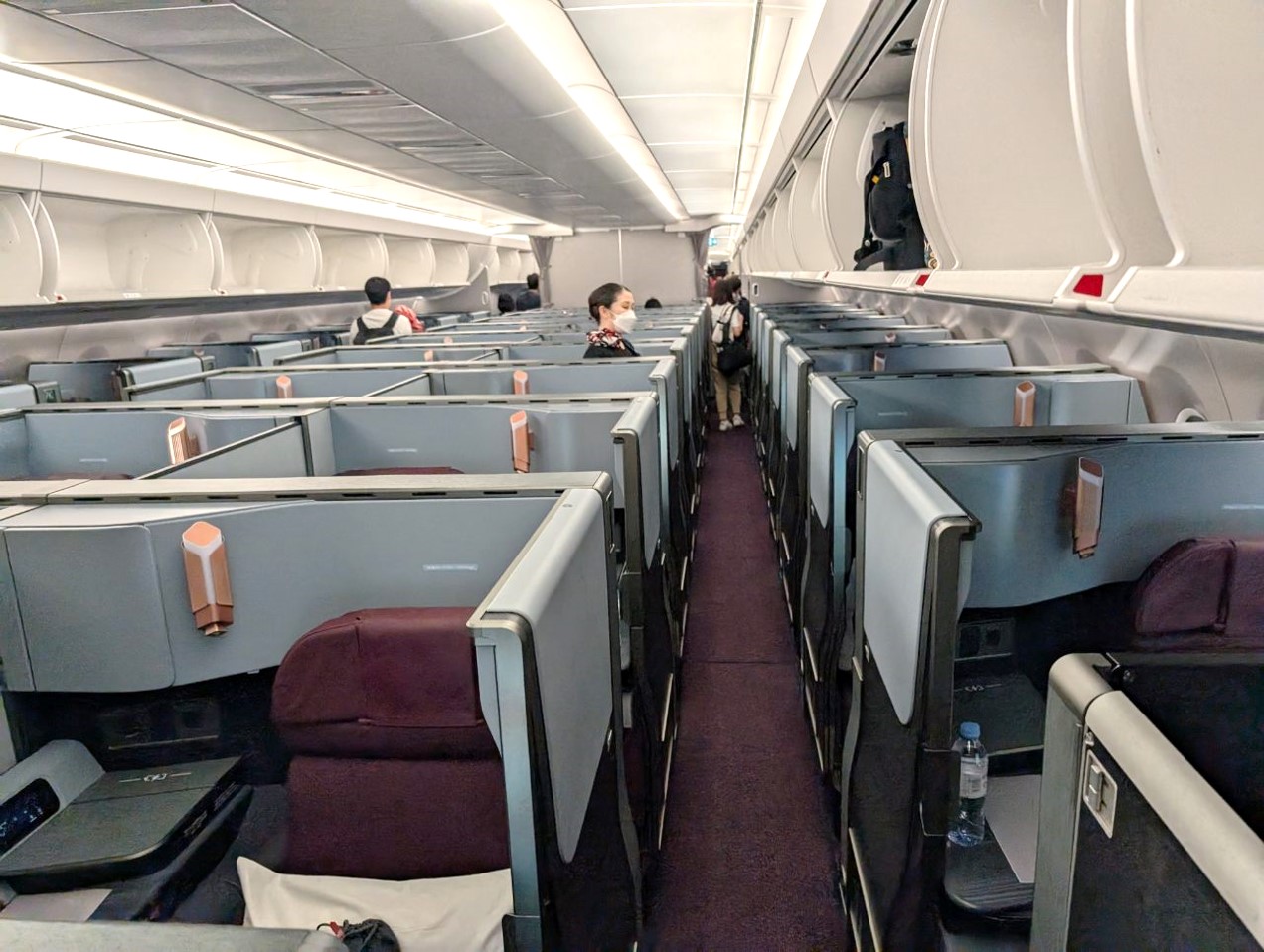
Japan Airlines has outfitted its Airbus A350-1000 with 54 Business Class seats from the Safran Unity range, making JAL the launch customer for this product (Air India and Qantas also have it on order).
Seats are configured in a 1-2-1 layout, divided into a forward cabin with 20 seats, and a rear cabin with 34 seats.
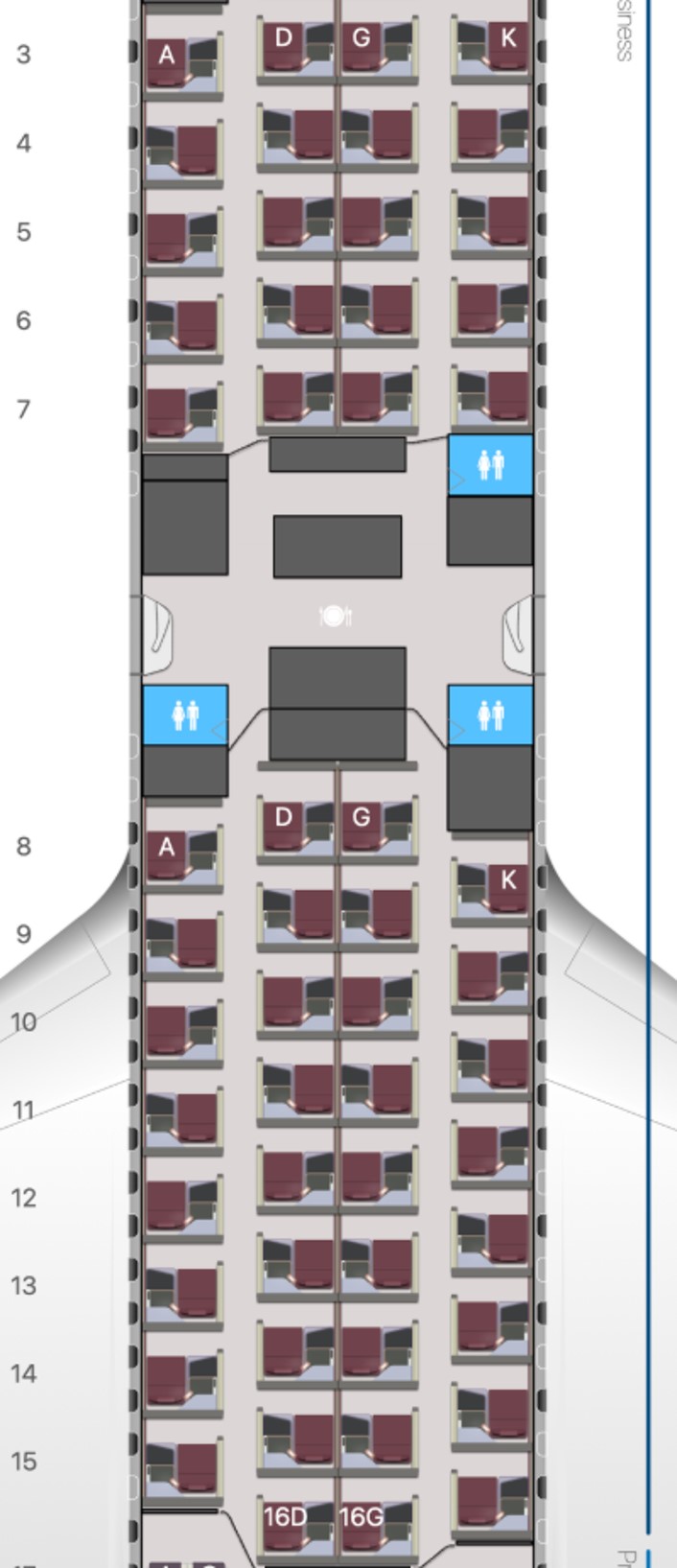
Japan Airlines decided against installing overhead bins above the centre pair of seats, which makes the cabin feel more spacious— even if it is rather high-density. Business Class seats are upholstered in the airline’s signature dark red fabric, with a touch of leather around the headrest.
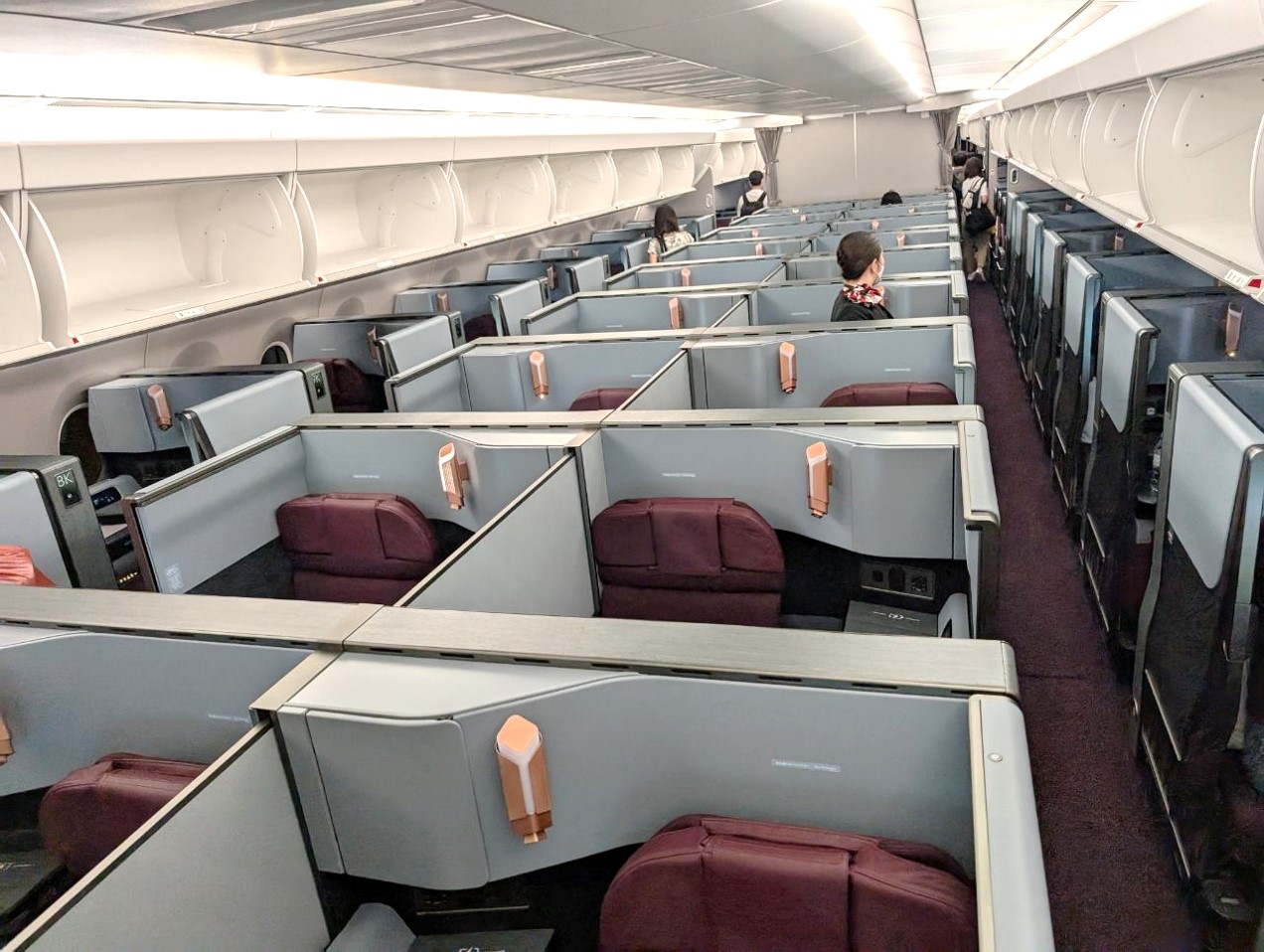
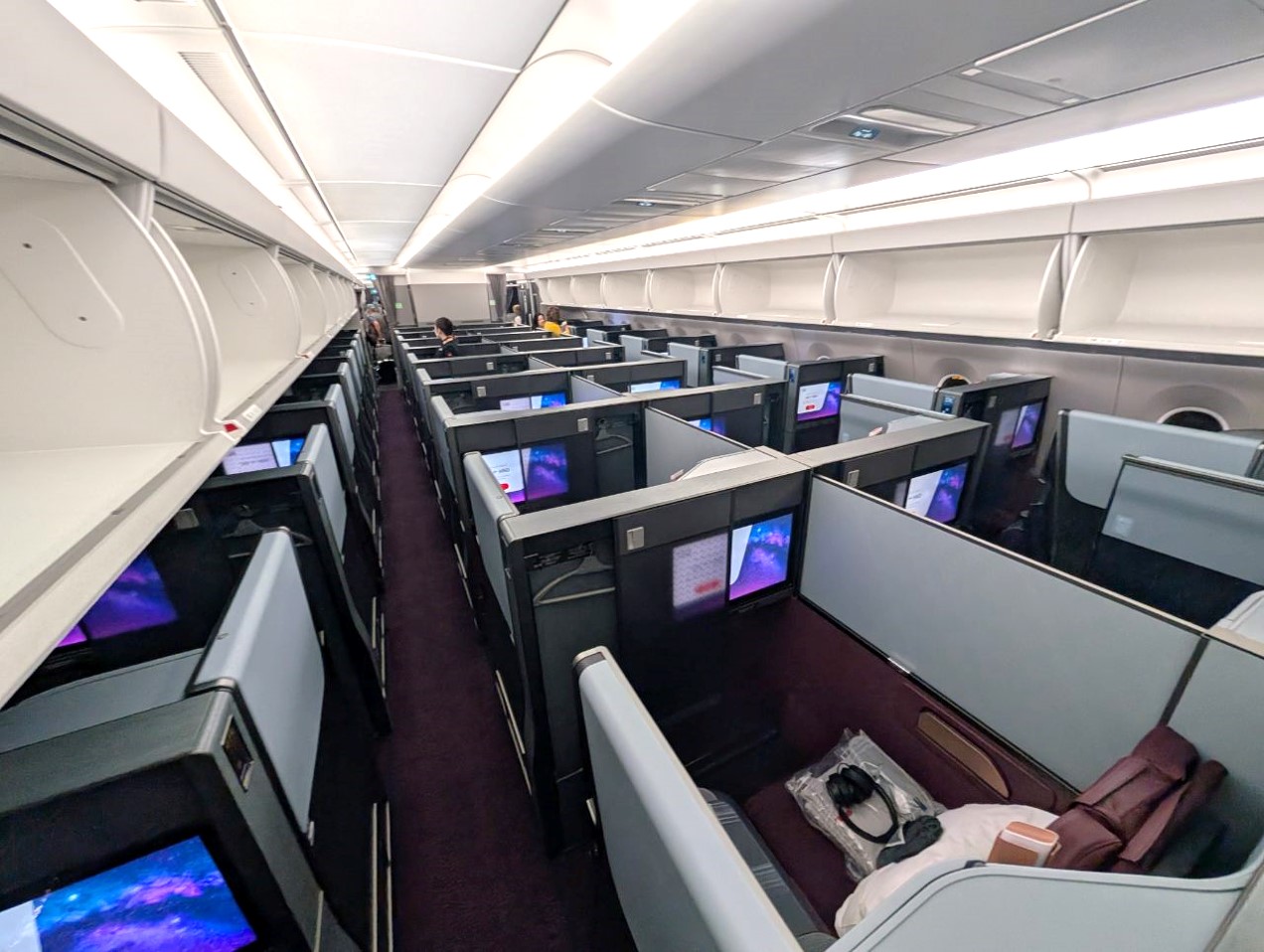
If you’re traveling as a couple, it’s worth noting that this product doesn’t offer true couple seating. In the centre section, seats are always separated by a side table—so even with the privacy divider lowered, you won’t be sitting directly next to your companion. This is shown in the render below.

For example, if the seat on the left is away from the aisle, the seat on the right will be closer to the aisle.
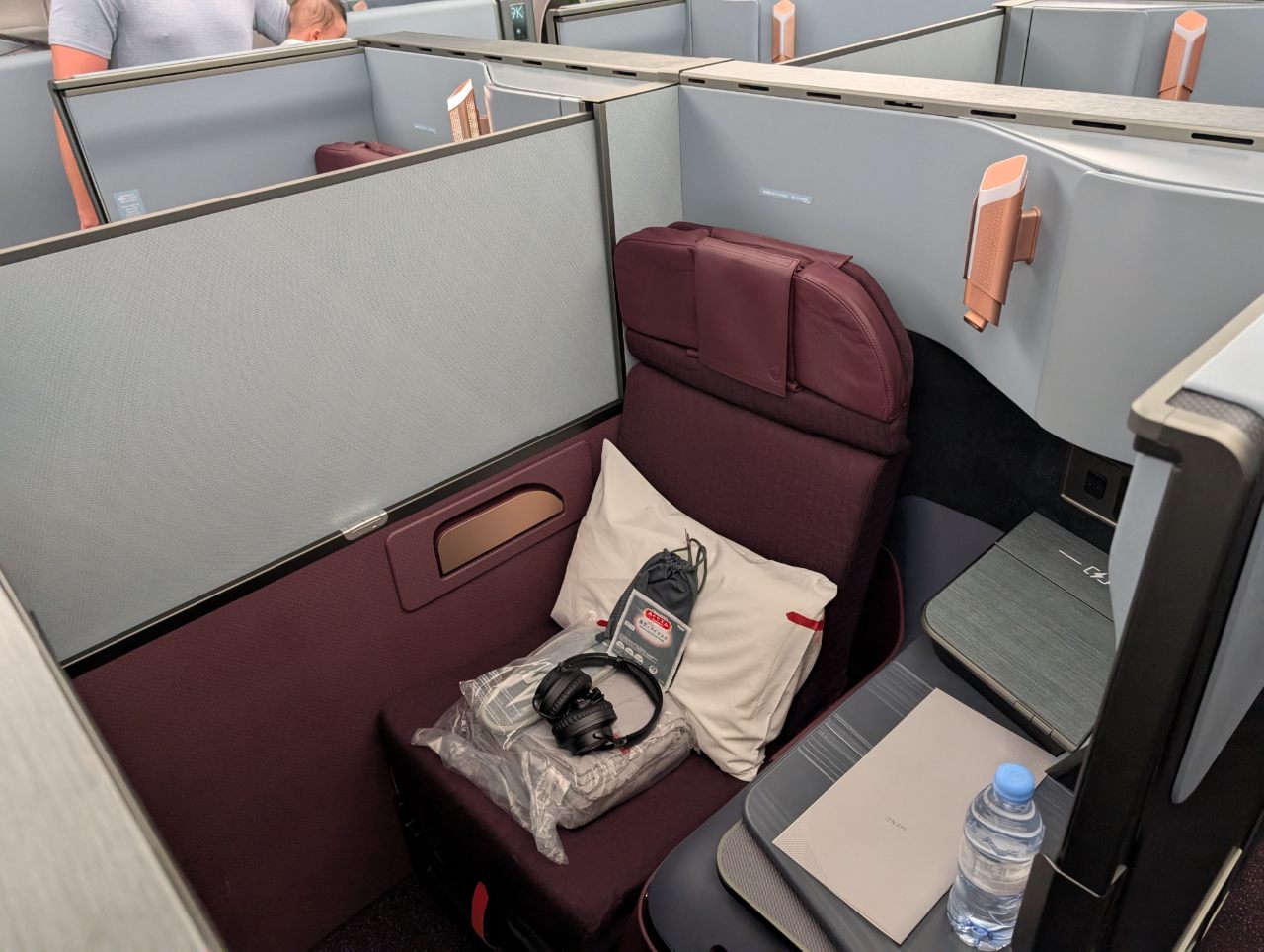
And if the seat on the left is away from the aisle, the seat on the right will be closer to the aisle.
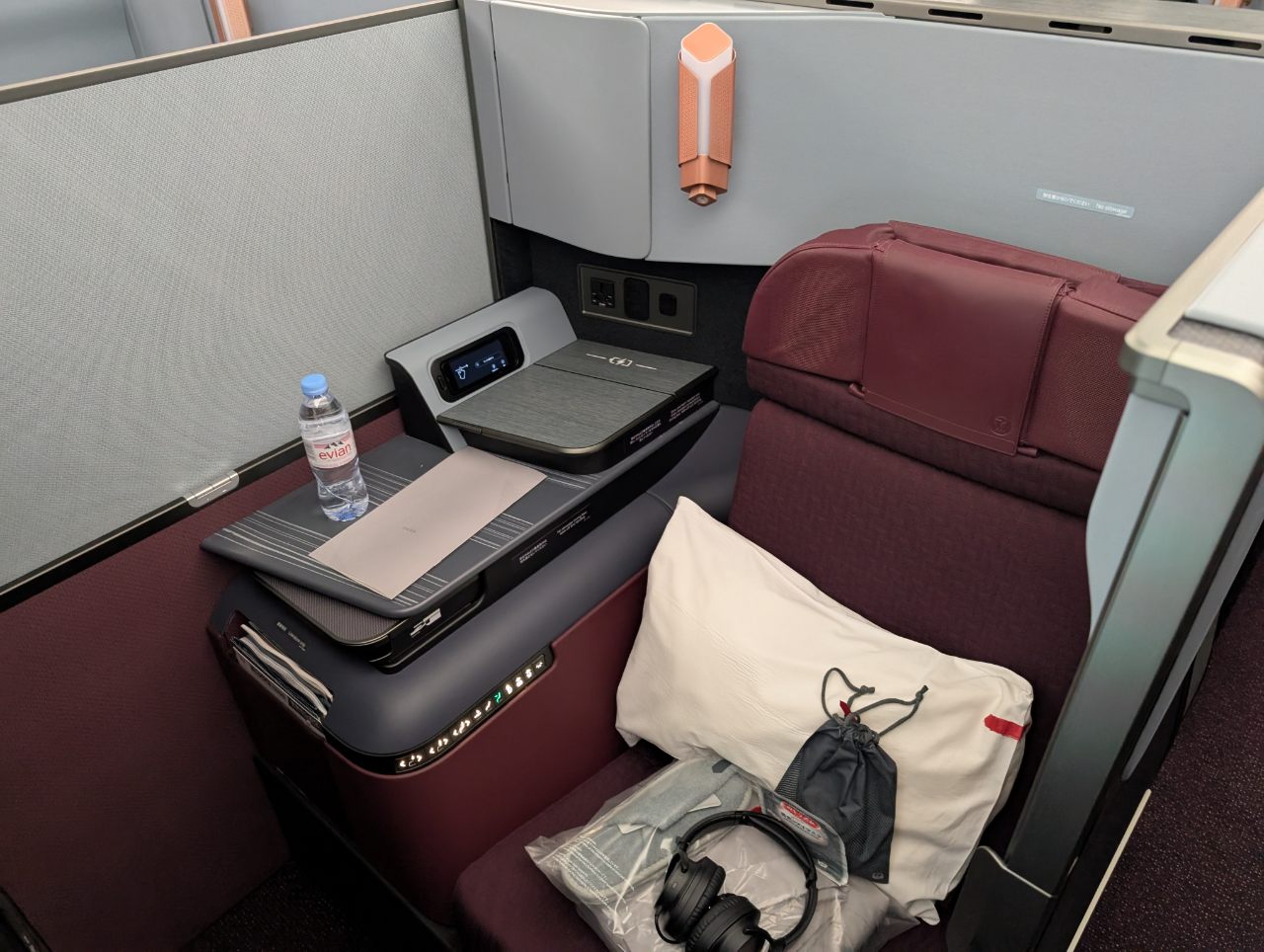
I don’t have a photo with the privacy divider lowered, but this render gives you an idea of what it’s like when travelling with a companion. You can still see and interact with each other, but you won’t be able to sit close or lean in comfortably.

Seats by the windows are staggered, alternating between being closer to the aisle, and closer to the window. Most people will prefer the seat towards the window, for better views and privacy.
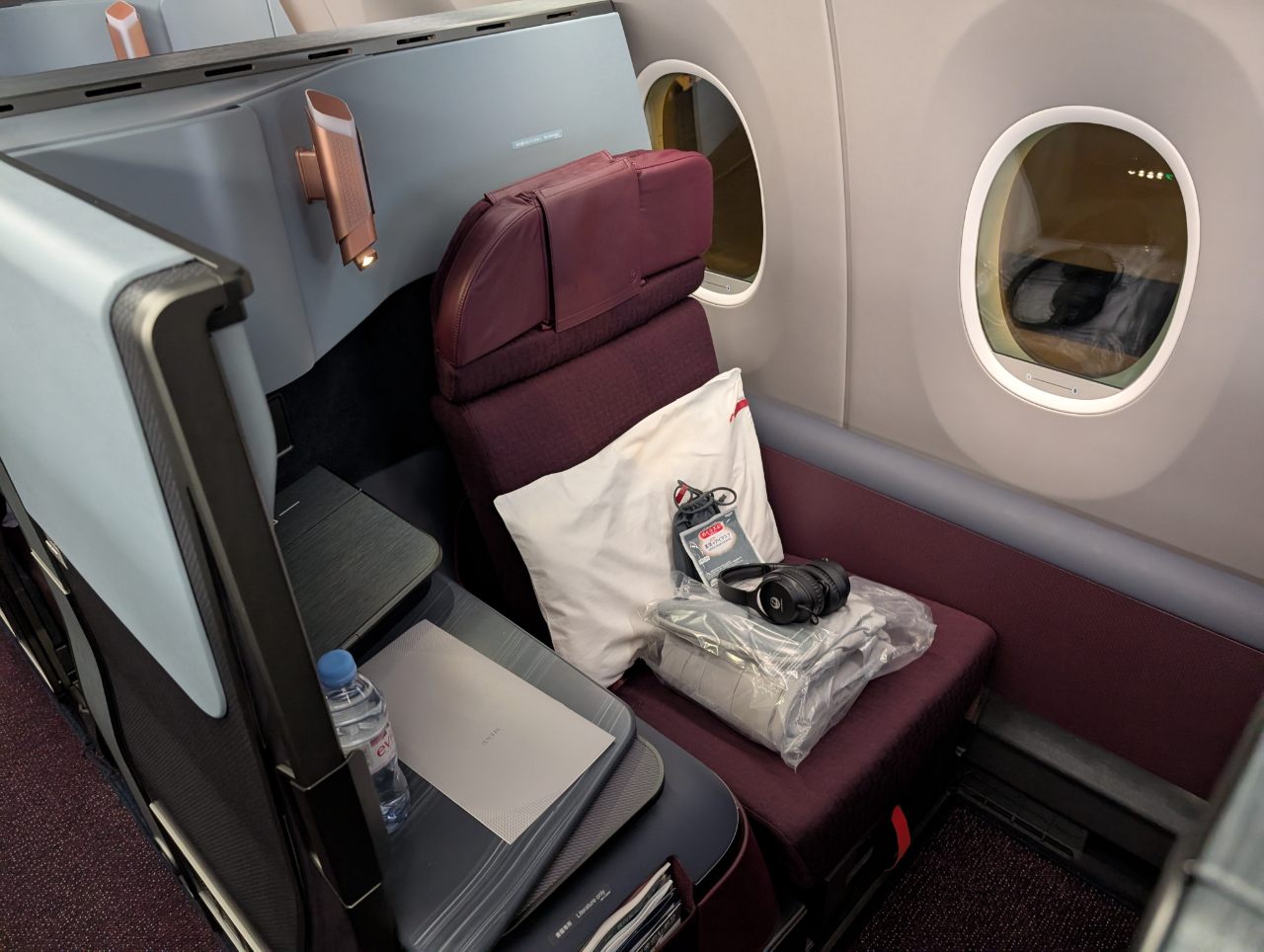
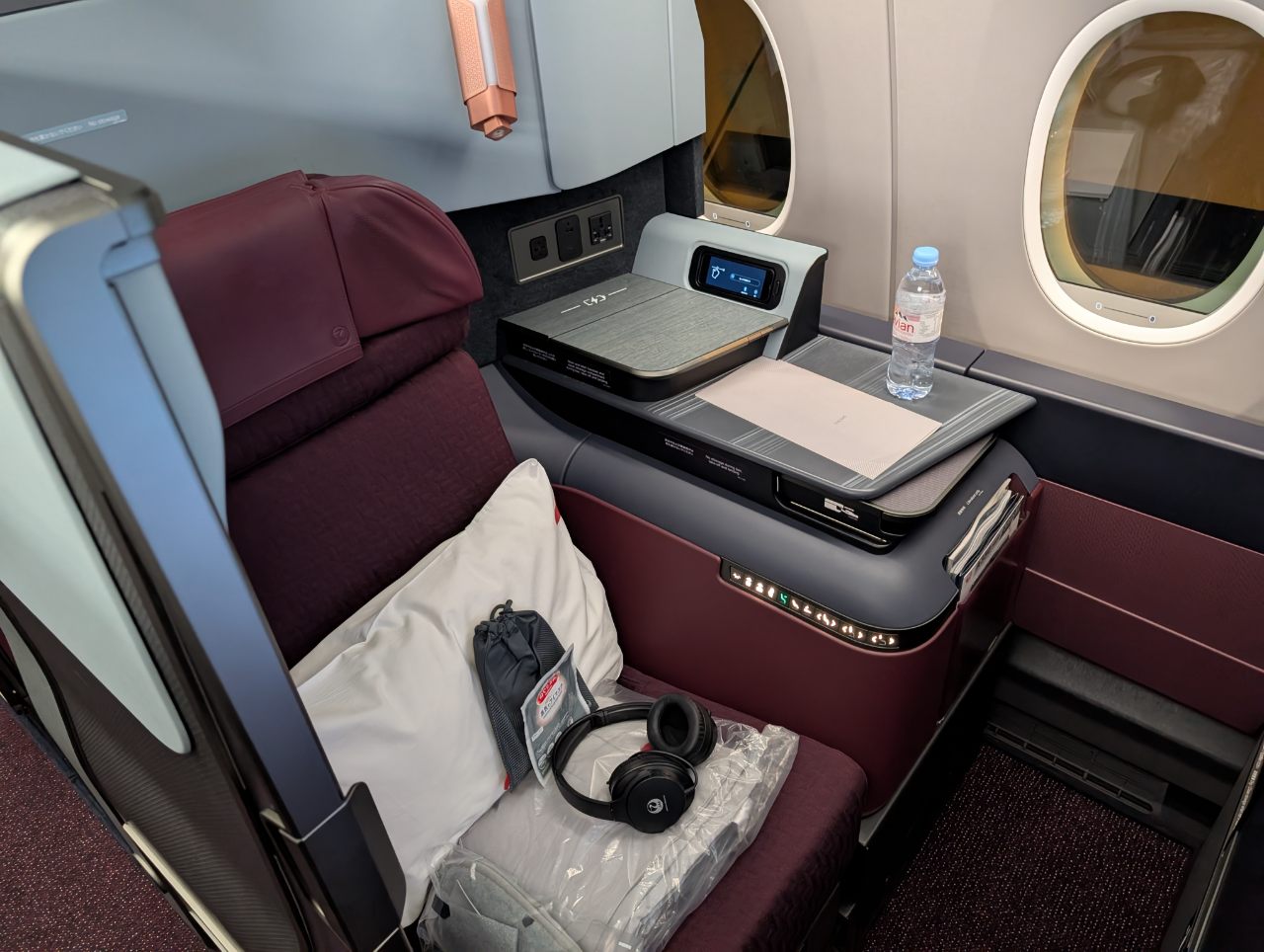
My seat for this flight was 14A, in the rear Business Class cabin and towards the window.
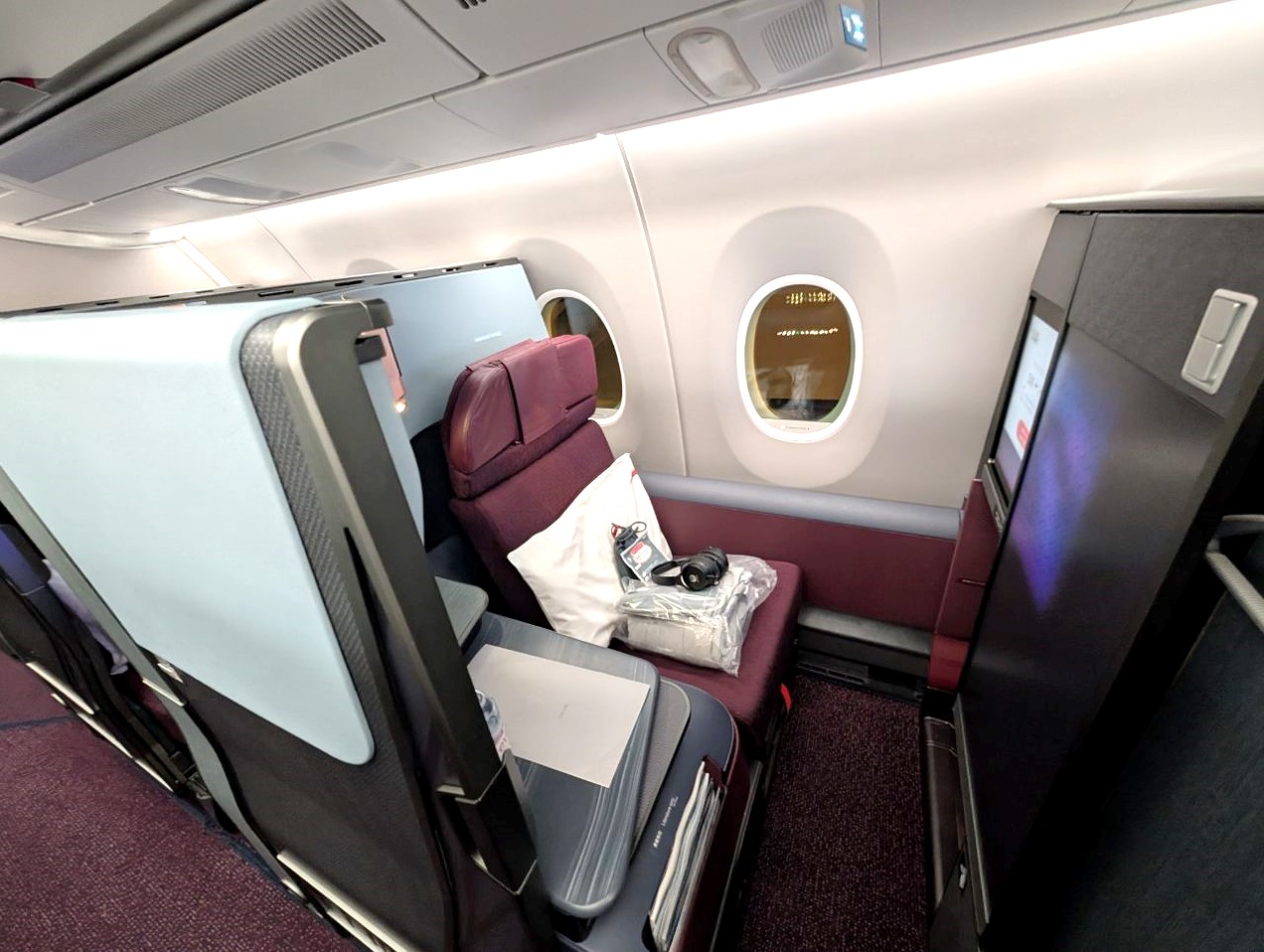
Japan Airlines’ new Business Class seat measures 22 inches wide—comfortable enough for me, though it might feel a bit tight for larger passengers. Still, this is fairly typical for Business Class seats these days: Qatar Airways’ Qsuites are 21.5 inches wide, and Cathay Pacific’s Aria Suites are 21 inches wide. Singapore Airlines is a relative outlier with its 28-30 inch wide seats on the A350-900LH and B777-300ER, though I’m quite certain the width will shrink further when it finally unveils its long-overdue new Business Class.
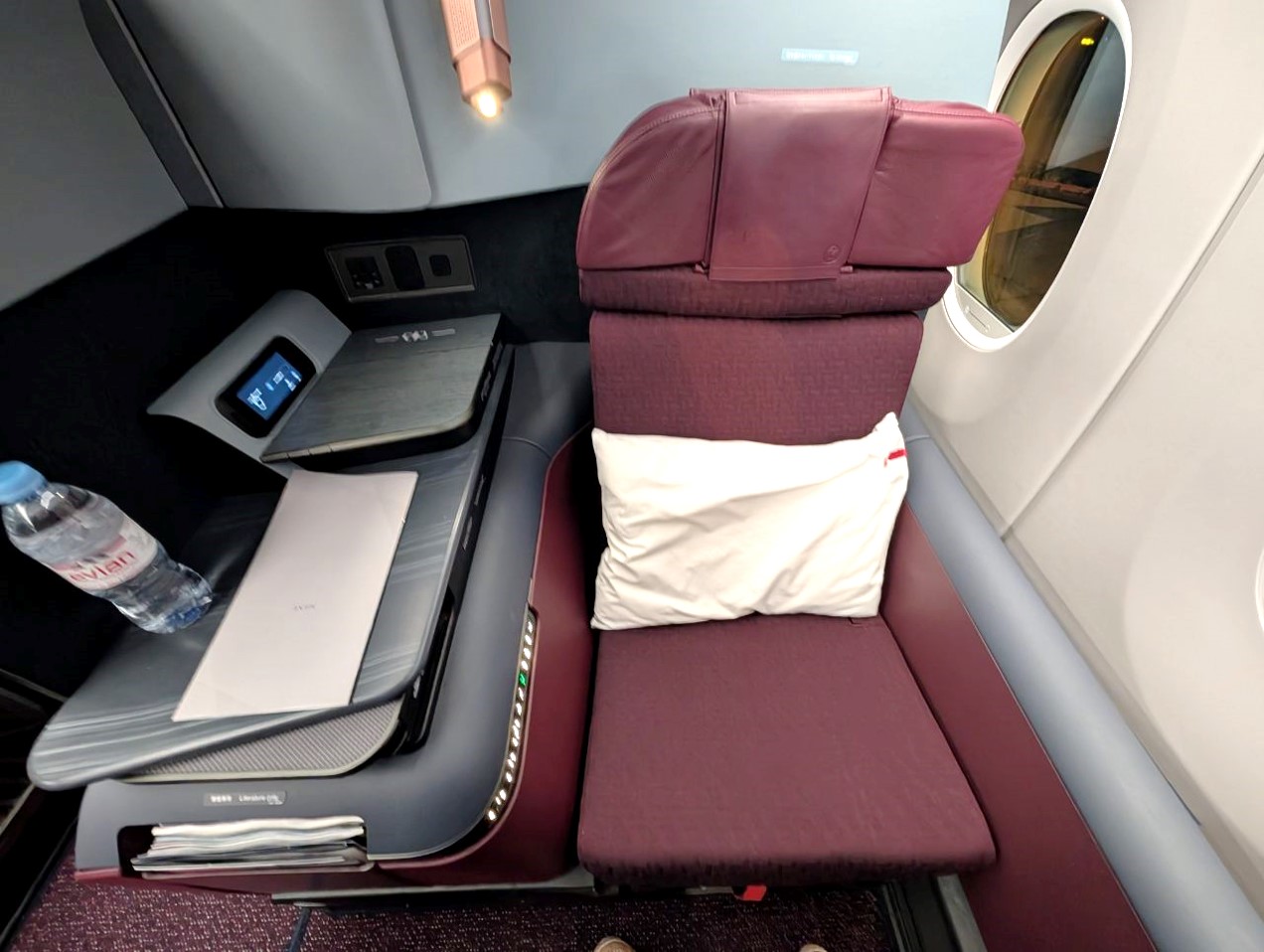
Each seat is surrounded by privacy walls and a 132cm door. That doesn’t sound particularly high, but when you’re seated down or reclined, you won’t really see people passing by unless you actively crane your neck.
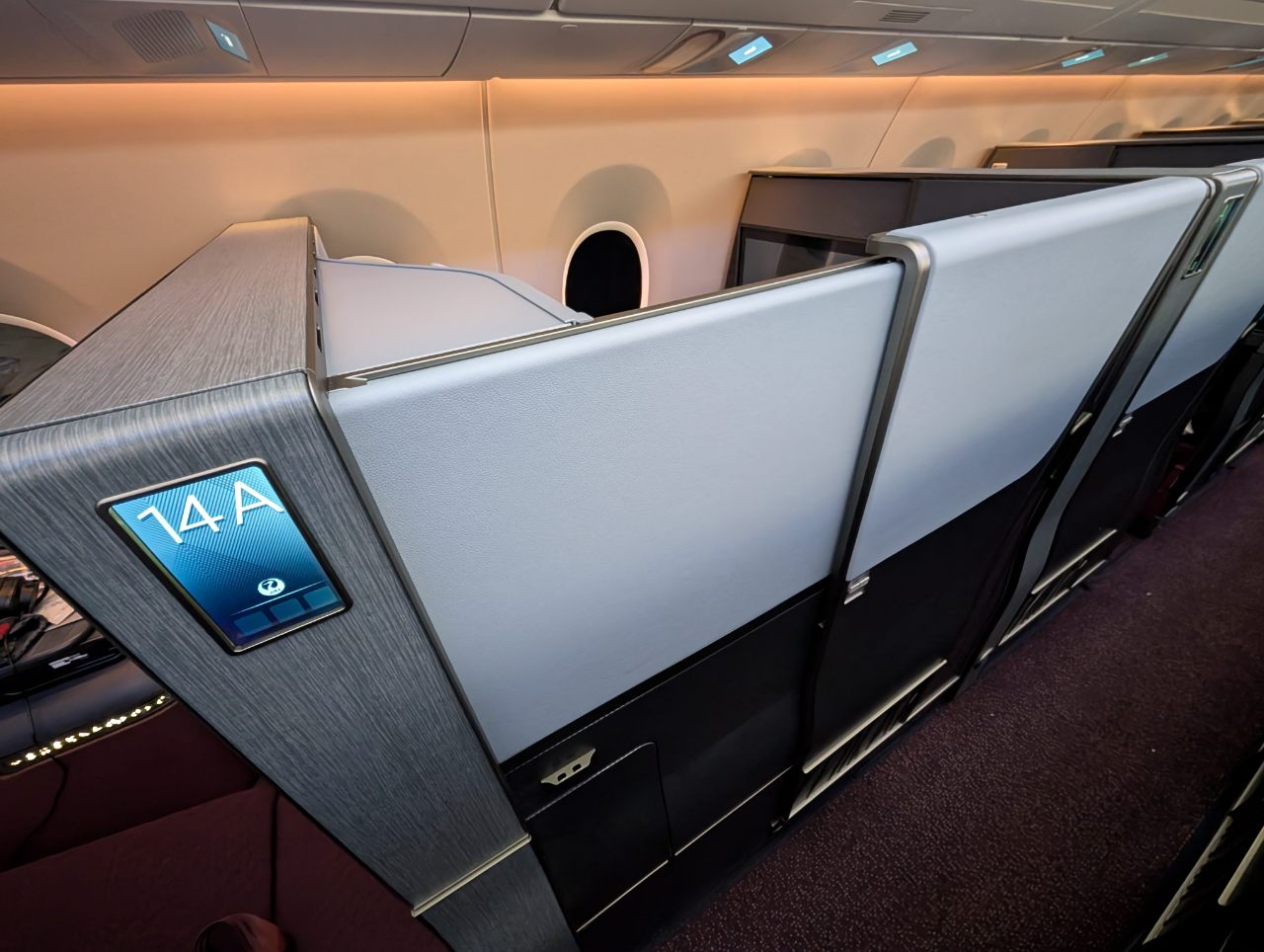
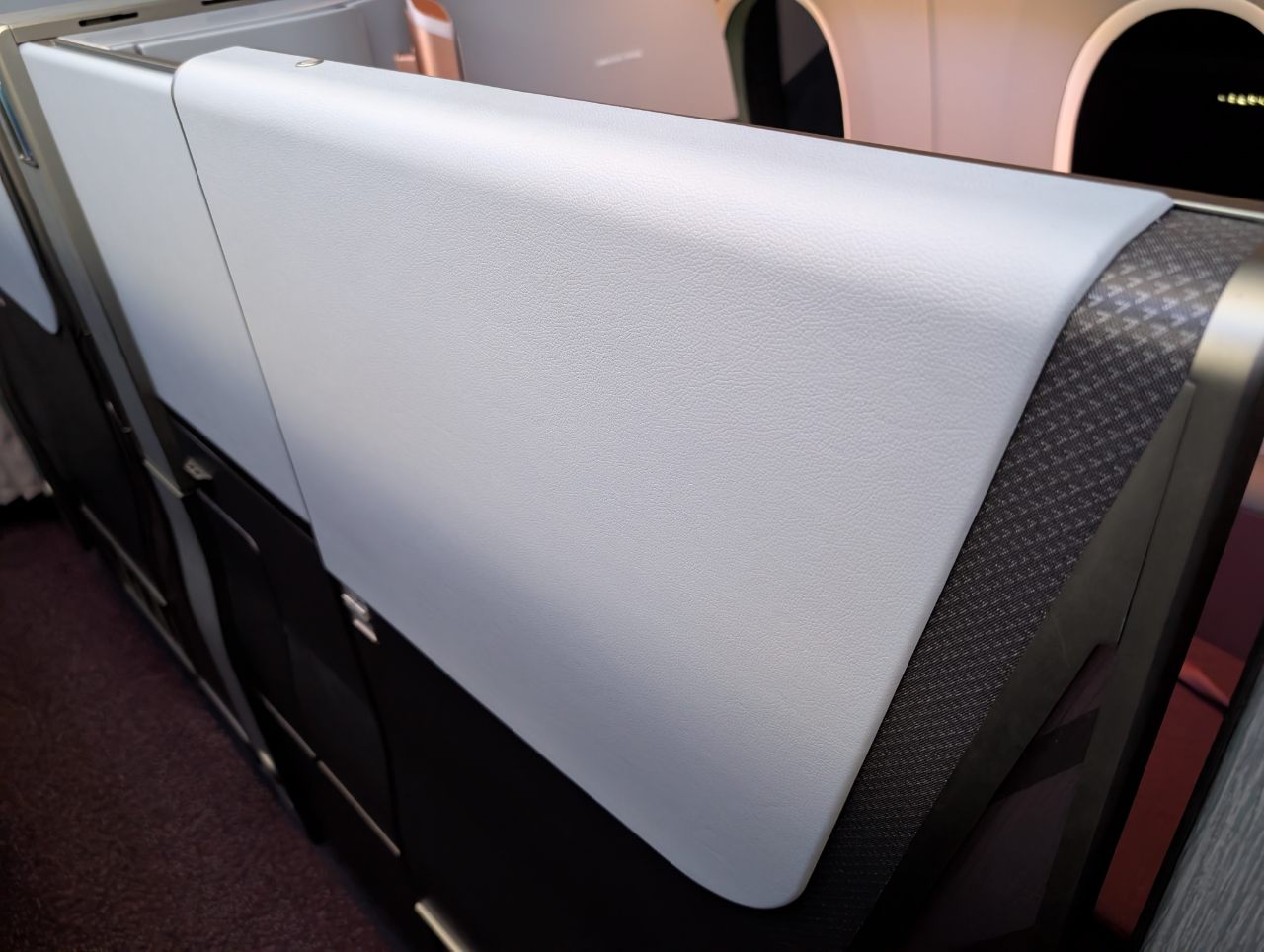
The door was easy to slide open or close, and I appreciated that there was hardly any gap when fully closed, as this blocked the glare of neighbouring inflight entertainment screens.
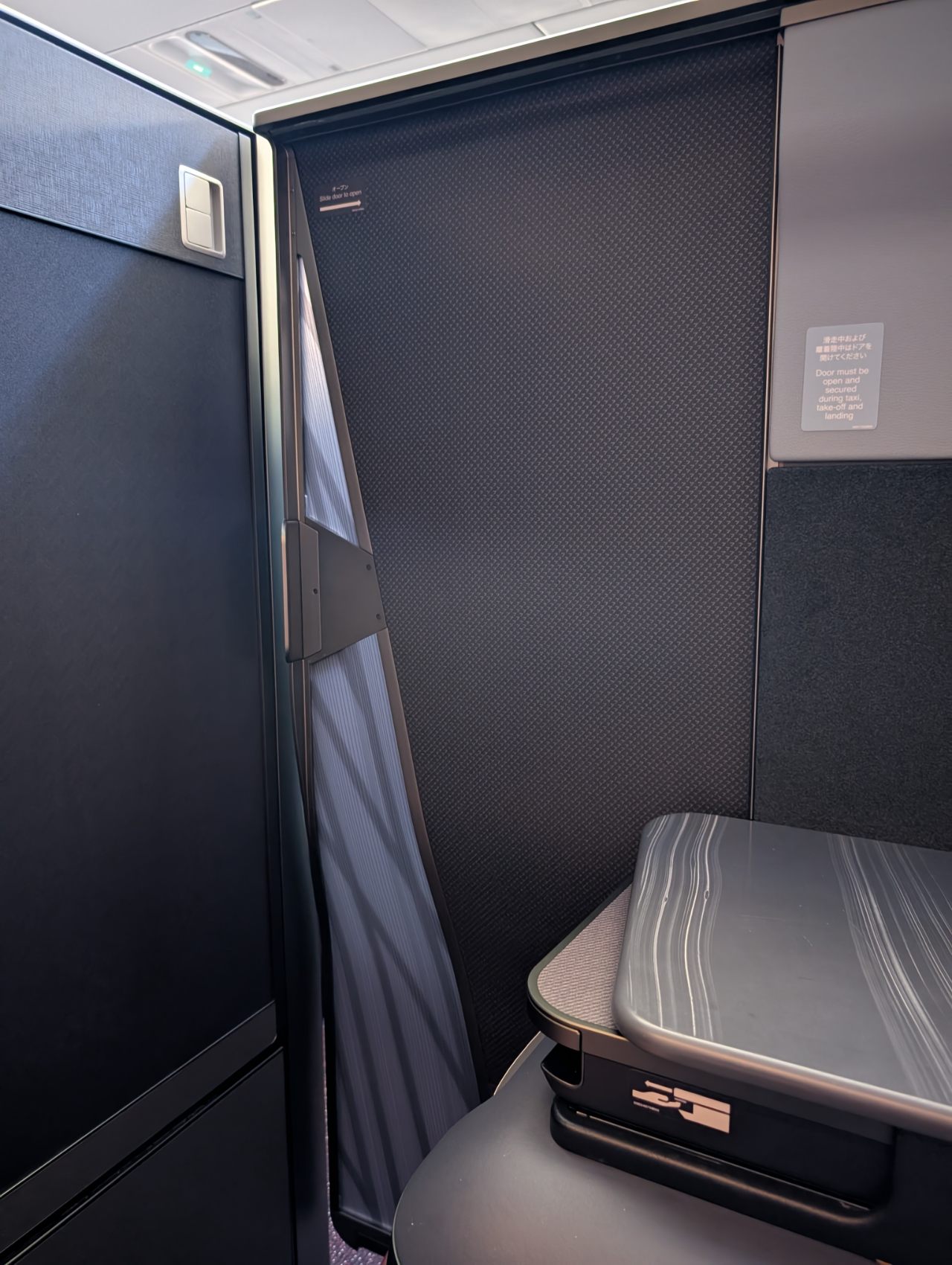
Next to the inflight entertainment screen was a translucent sliding door which revealed a wardrobe, complete with hanger. It’s a cute design which reminded me a little of shoji screens.
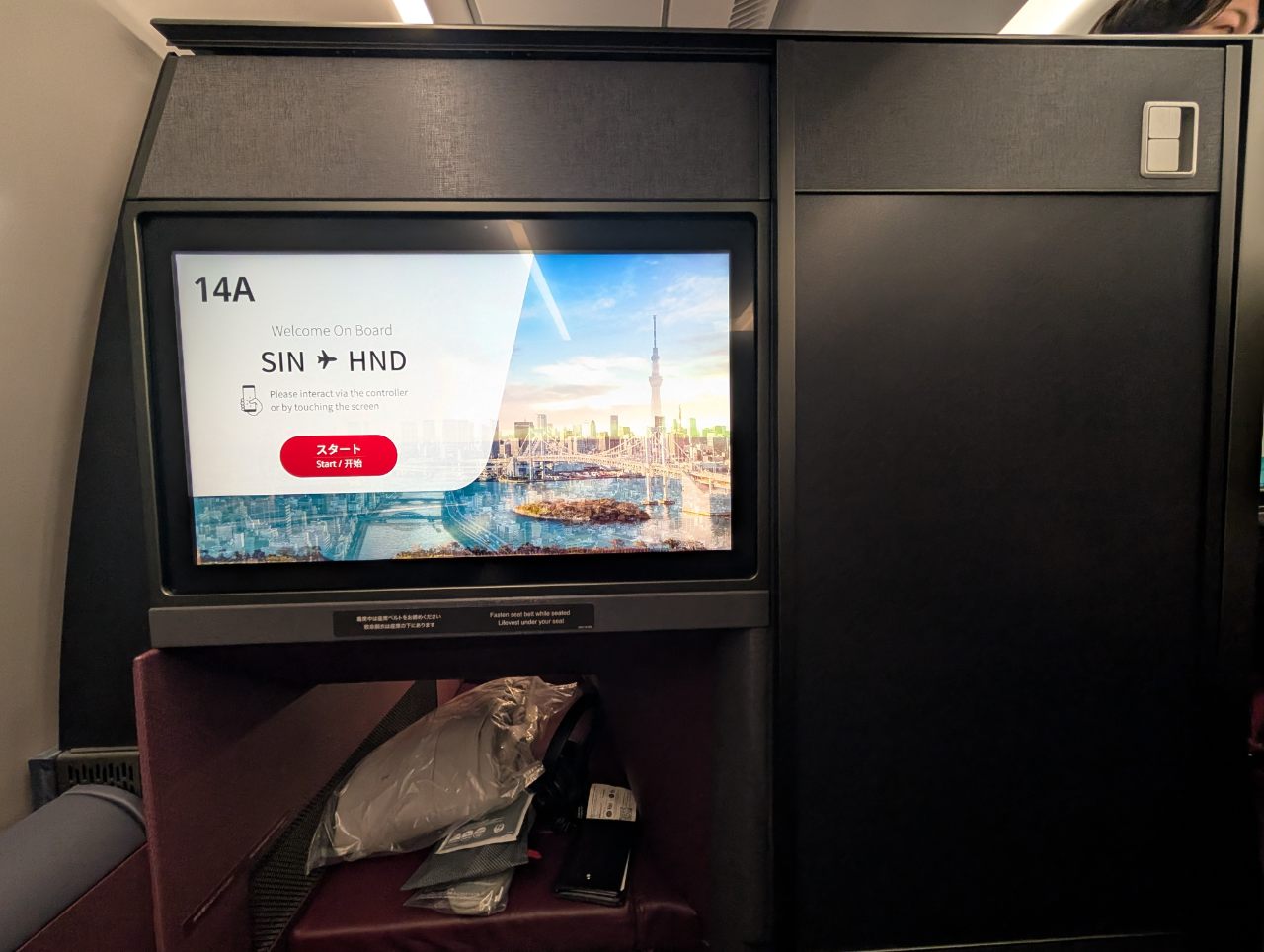
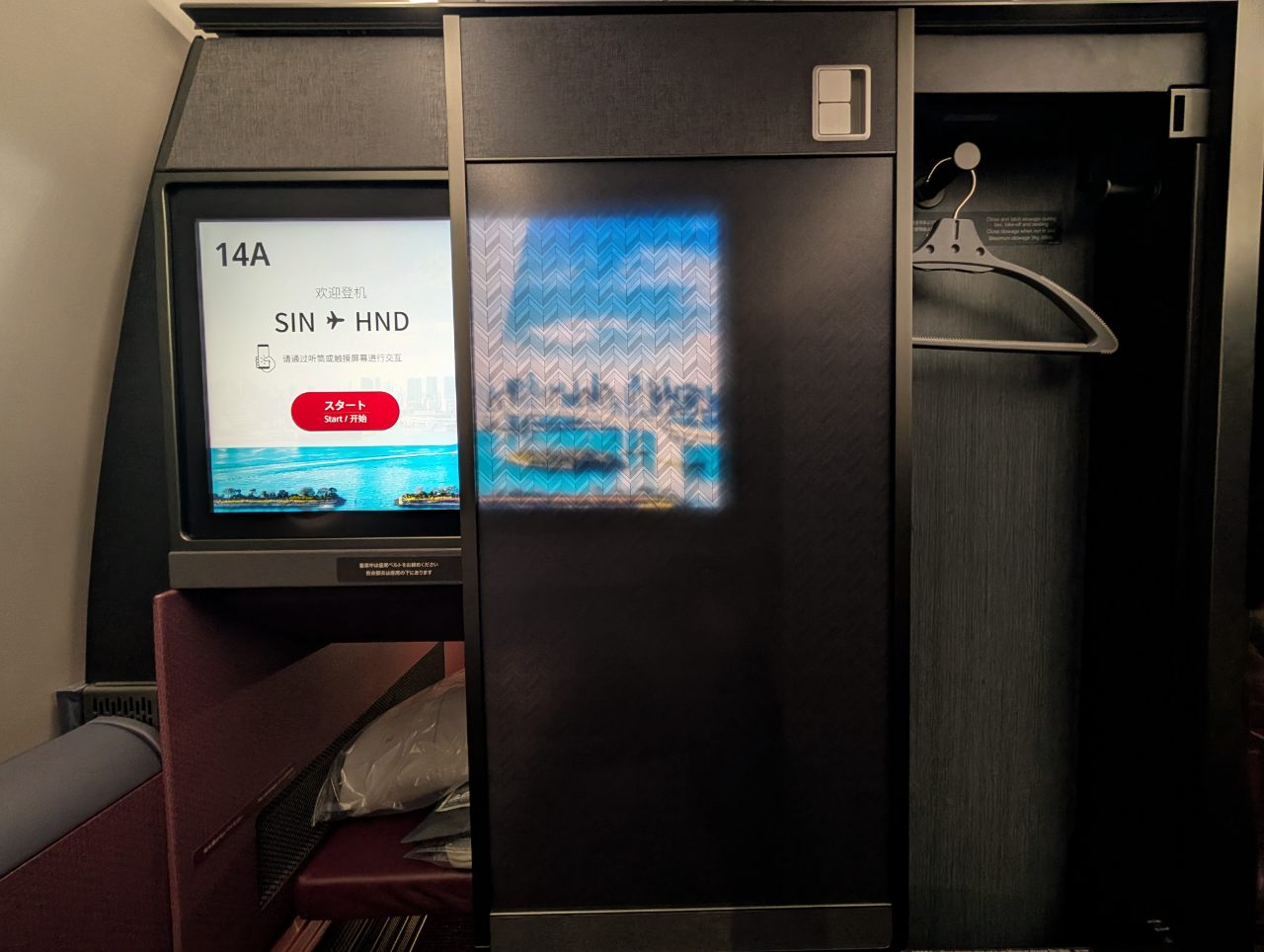
Beneath the wardrobe was a separate compartment for shoe storage. It won’t fit very large boots, but loafers and sneakers will be fine.
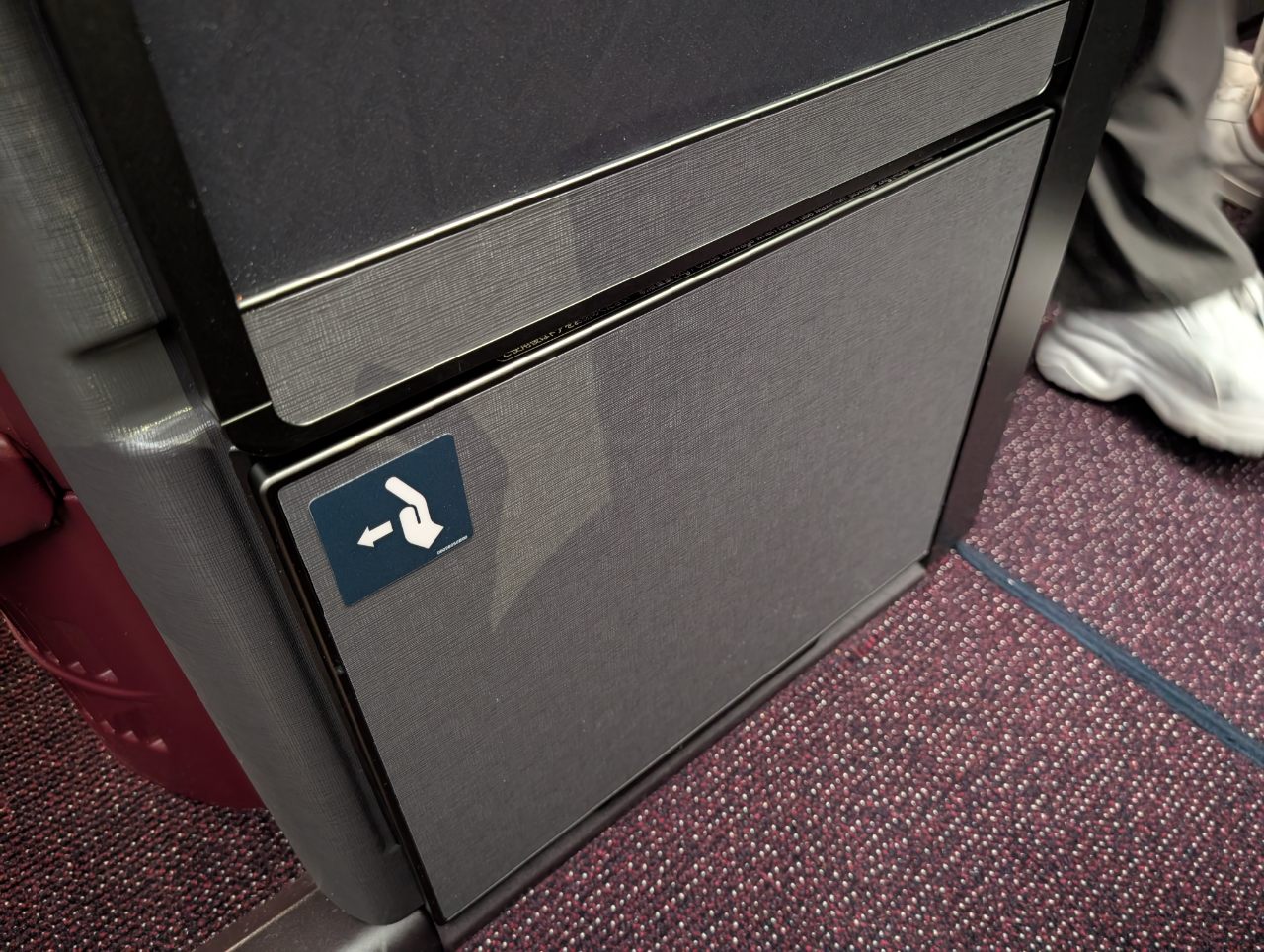
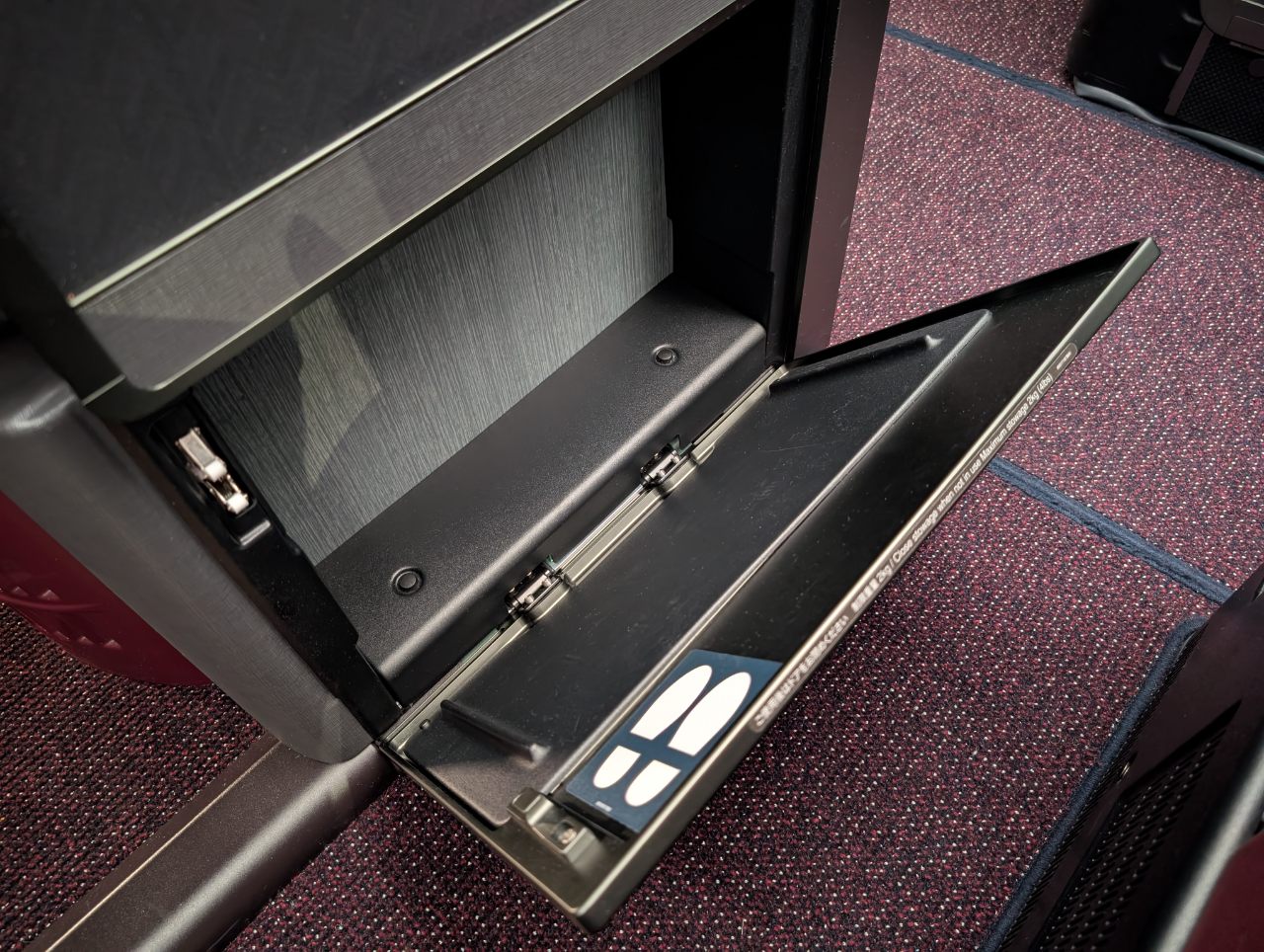
In terms of storage, each seat has an enclosed storage compartment (credit to OMAAT for this photo as I forgot to snap one of my own) that is big enough to store water bottles, headphones and a charging brick.
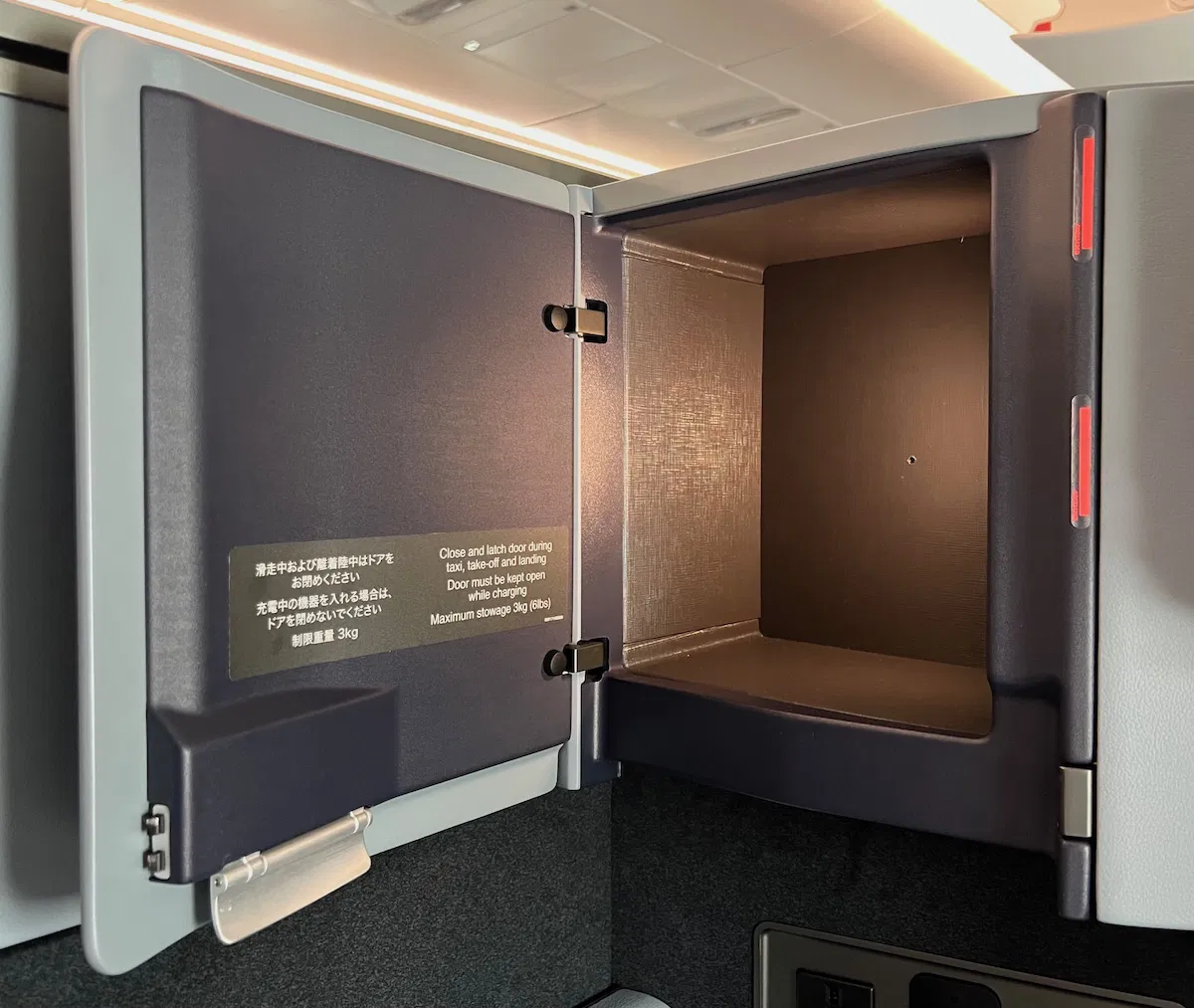
There’s also a literature pocket below, but it’s already packed so full you can’t really squeeze in much extra.
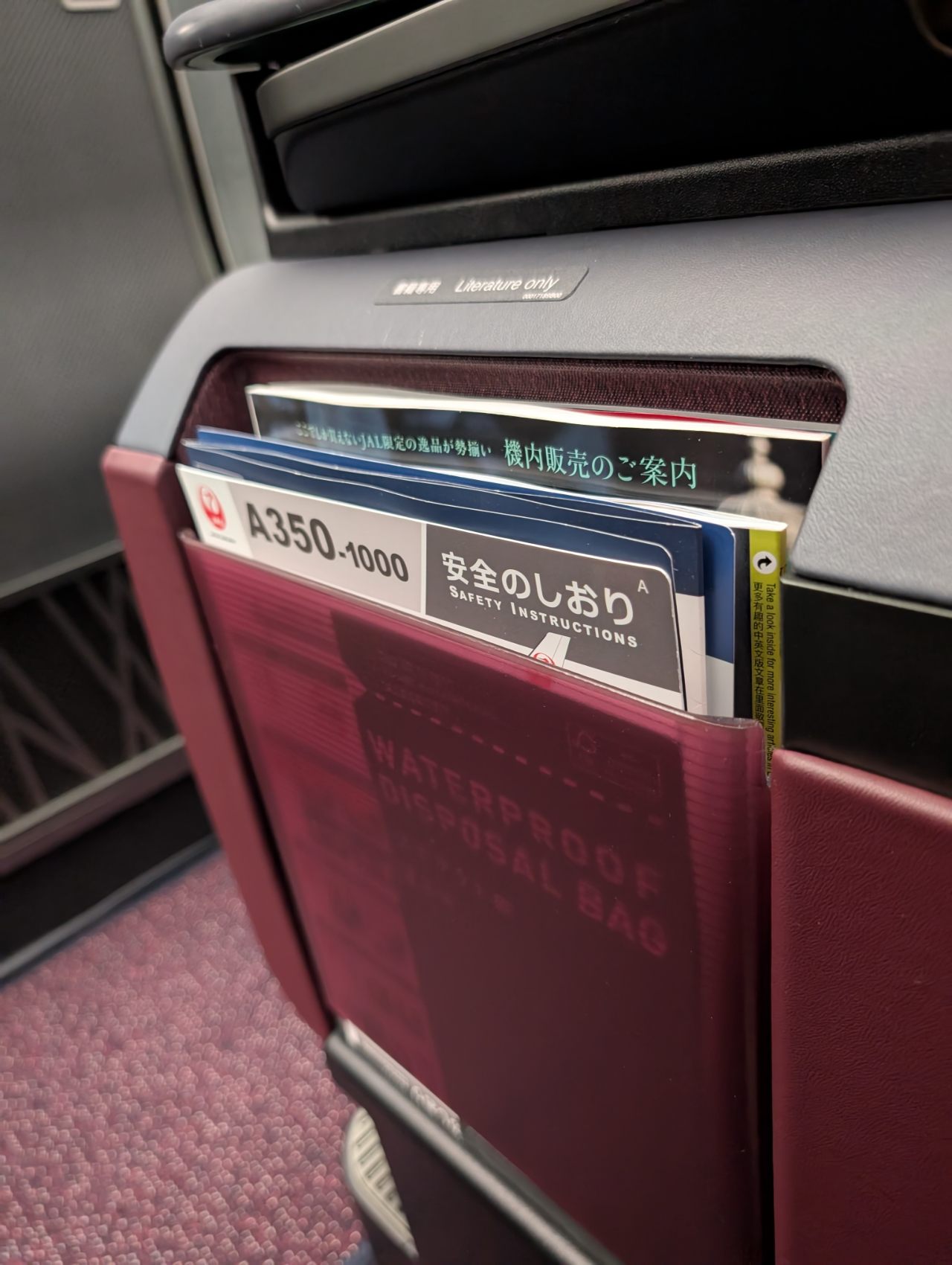
If you need additional storage, the table top flips upwards to reveal a nook large enough for a passport, phone, wallet or loose cables. However, I found this very hard to open because it required pressing two small buttons that weren’t very responsive.
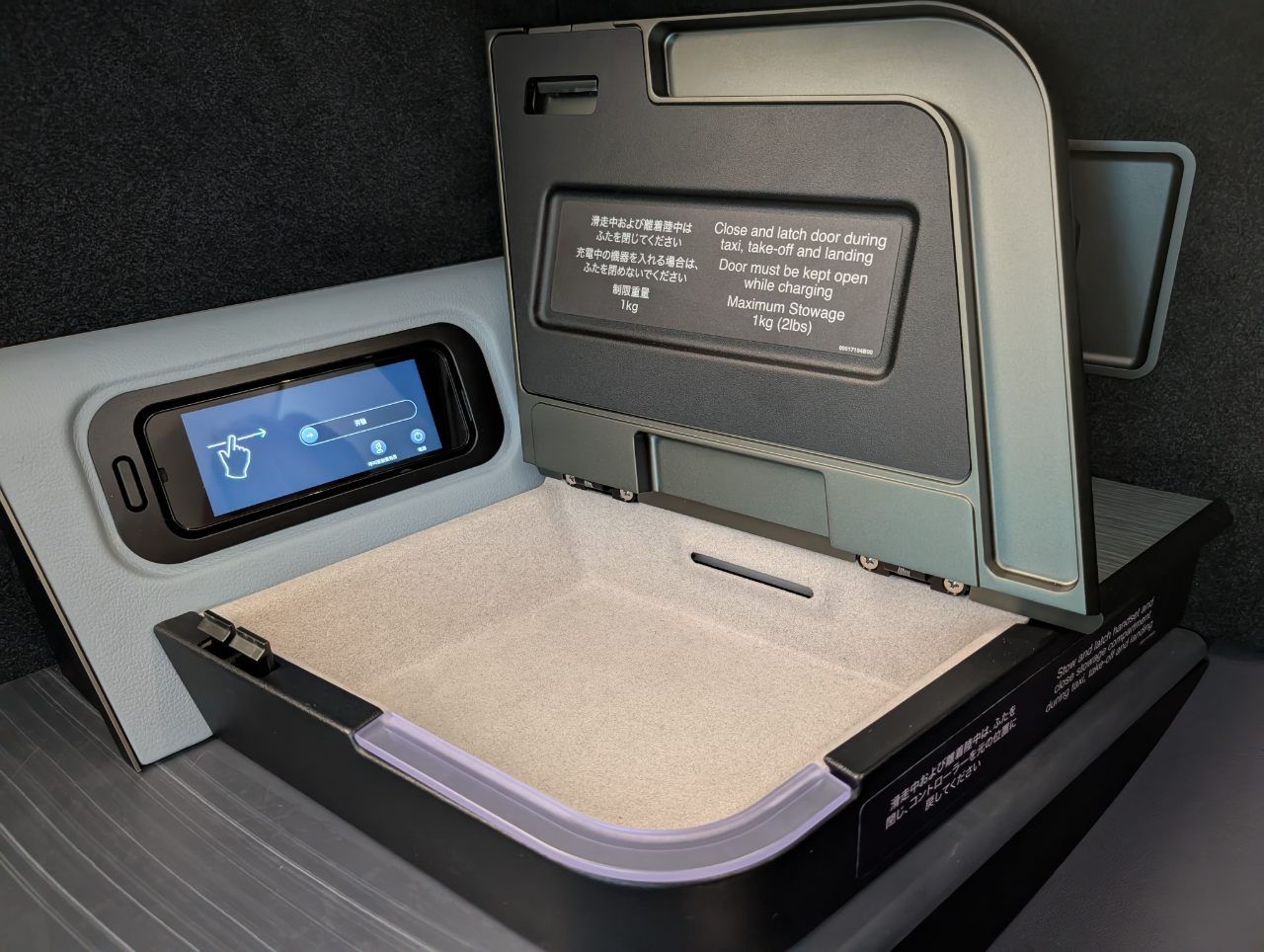
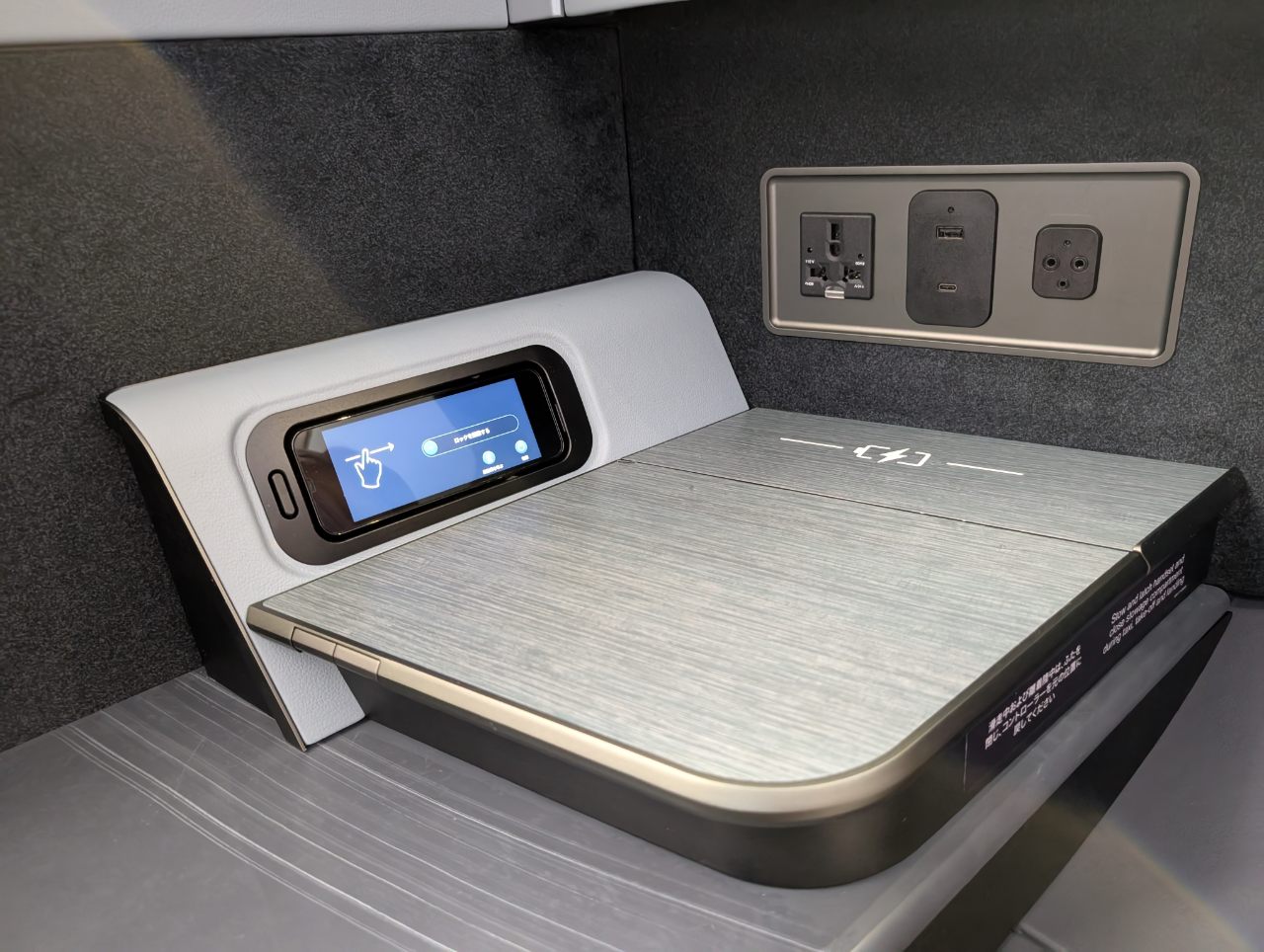
Charging options come in the form of a universal power outlet, a USB-A and a USB-C port. There is also an option for wireless charging, and fortunately, it’s fairly easy to find the sweet spot where charging initiates.
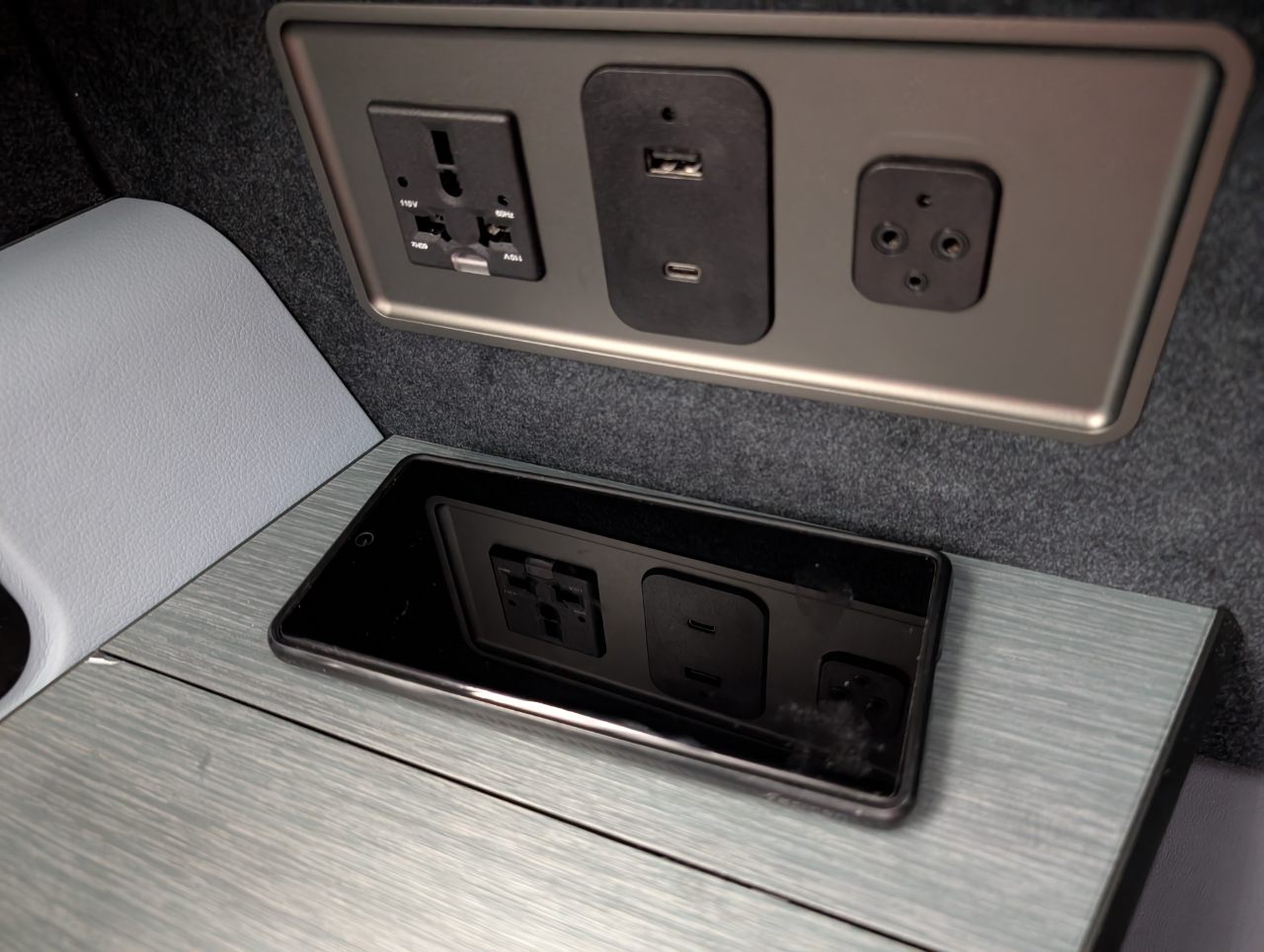
However, charging speeds weren’t very fast, and wireless charging does create a lot of heat. Add the fact that it’s impractical to use your phone when on a wireless charging pad, and most people would be better off charging through the USB-C port instead. I’m still not completely sold on the value proposition of wireless charging on airplanes, not till the speeds improve significantly.
The inflight entertainment system can be controlled via remote, but since the screen was touch-sensitive there was little reason to use this.
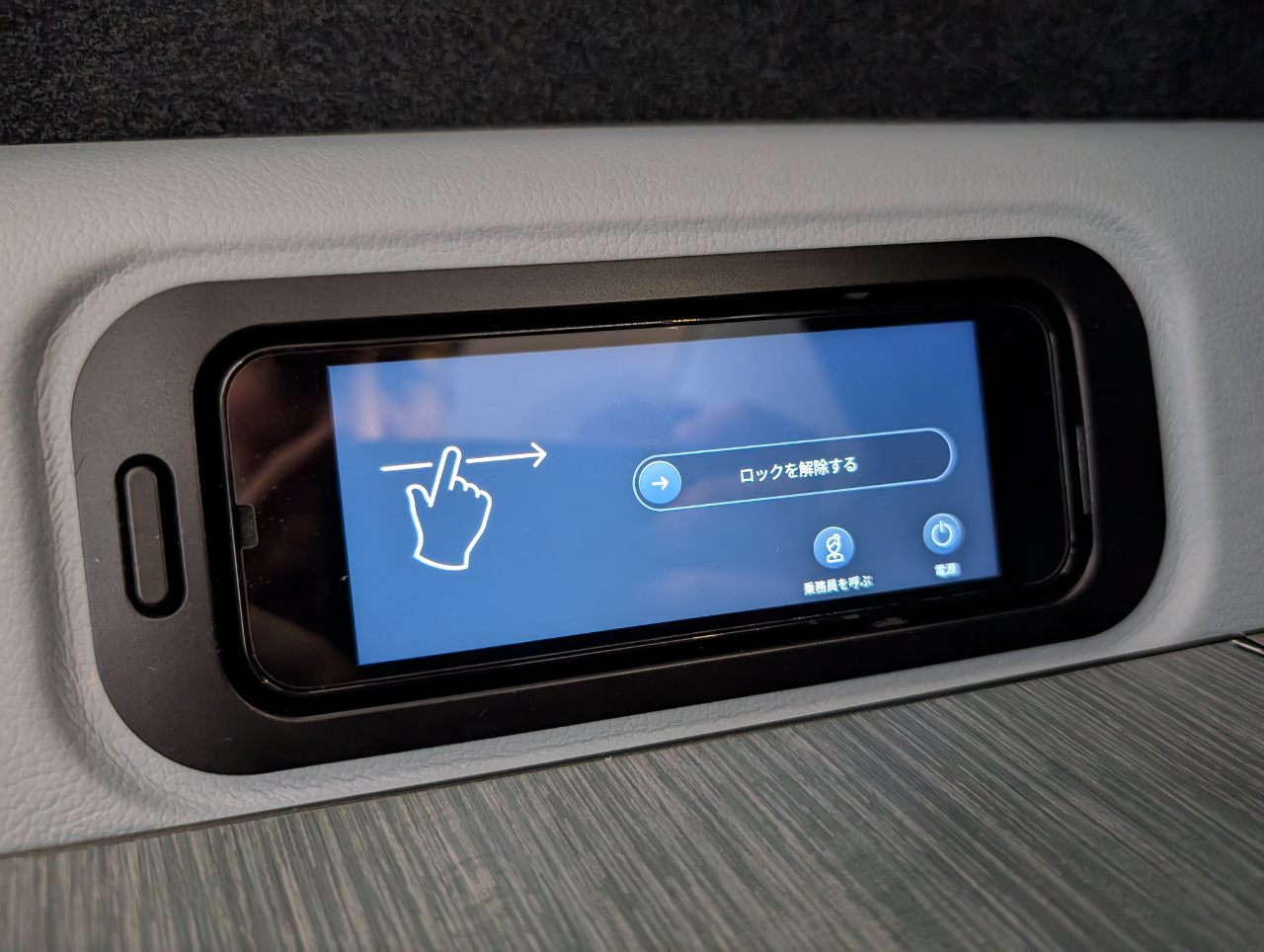
Seat controls were just below the side table. These were fairly intuitive, and had presets for full flat, lounging, full upright, as well as lighting controls. There was a specific button to adjust just the headrest, which is useful for watching movies through the headphone-free system (more on that later).
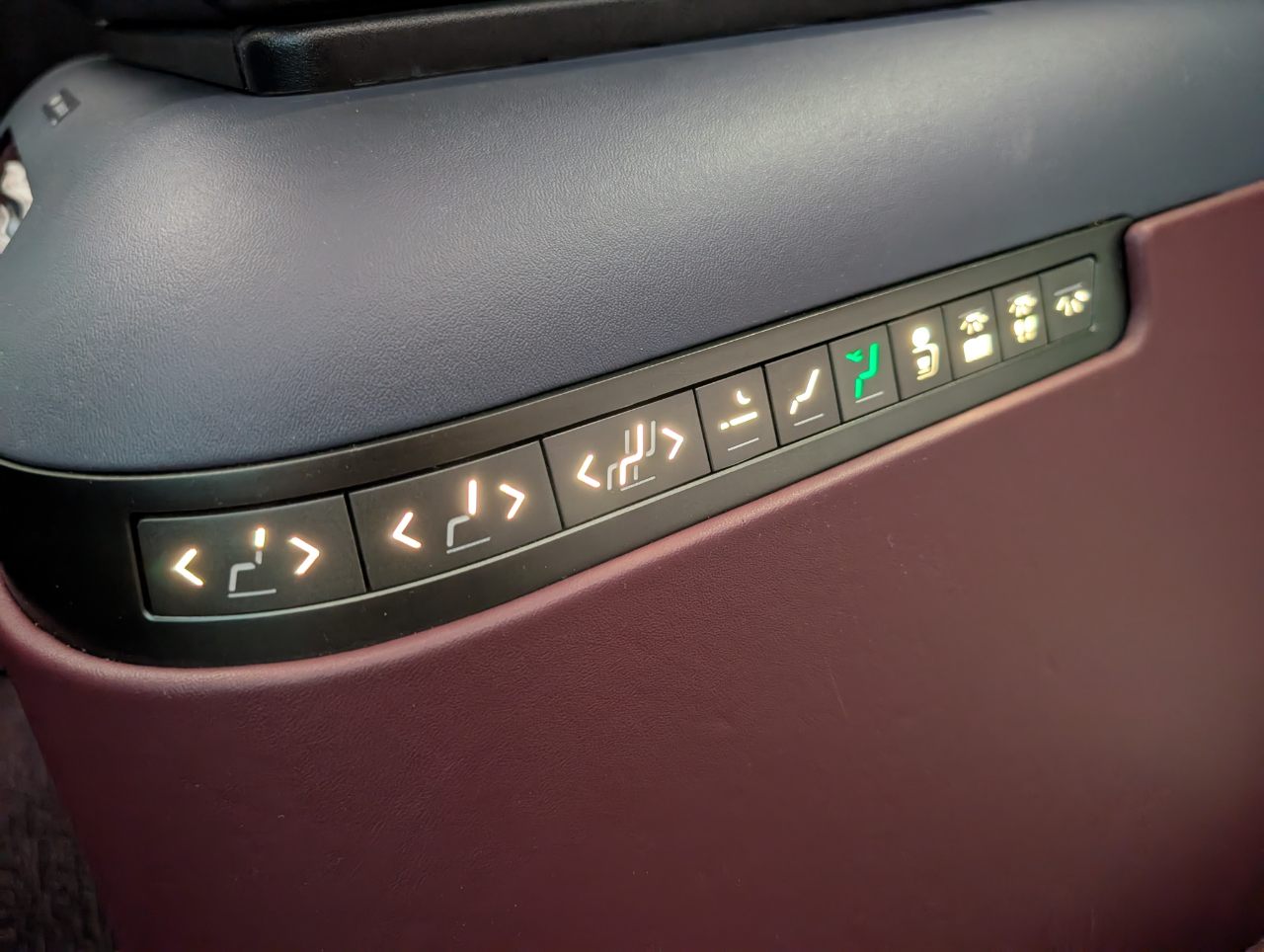
The tray table was large and sturdy, but I found it rather unintuitive to operate. It’s finicky and can’t be stowed unless you follow a very particular sequence. Also, I didn’t like that it couldn’t be pushed forward, effectively trapping you in your seat when deployed.
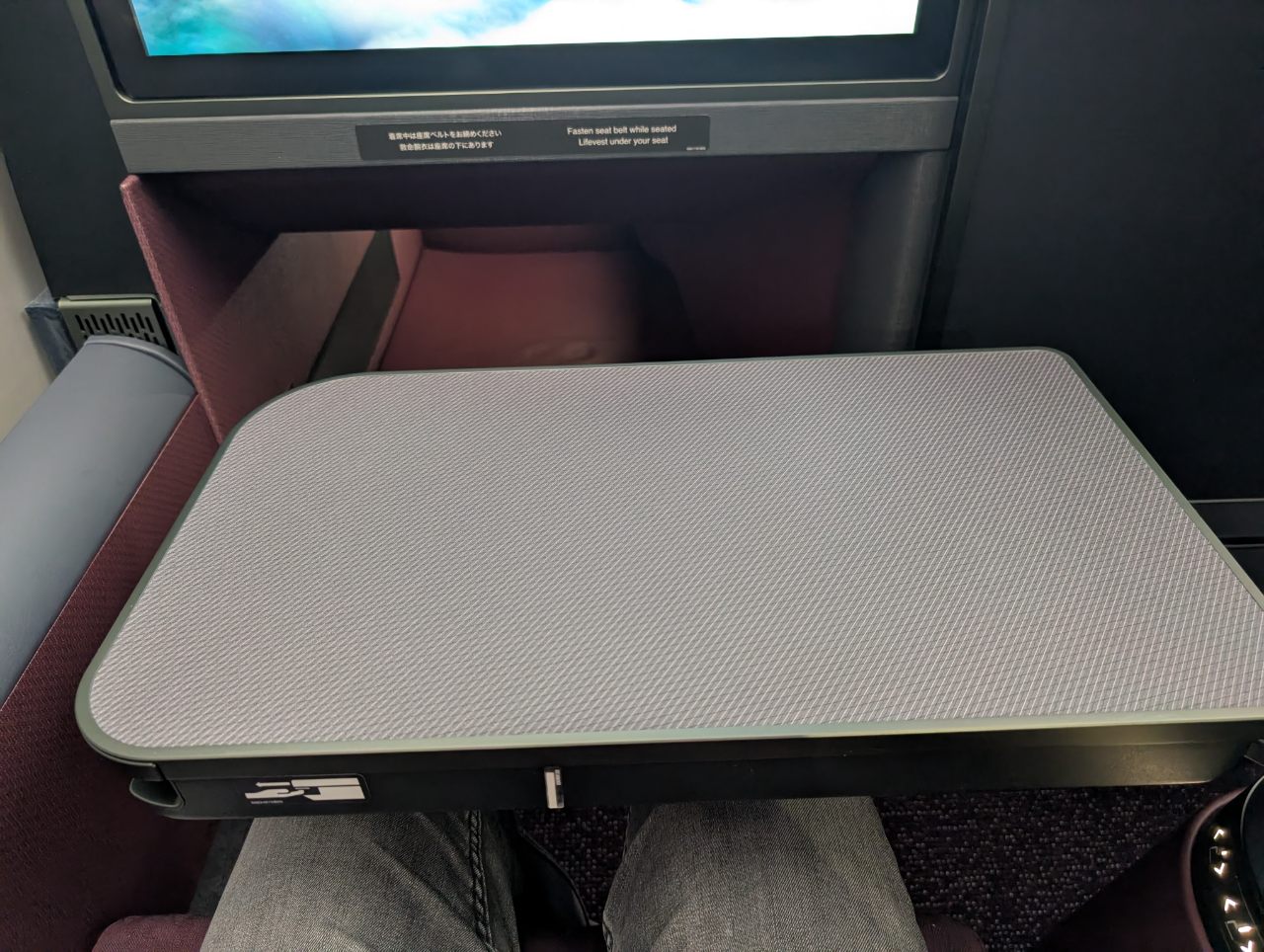
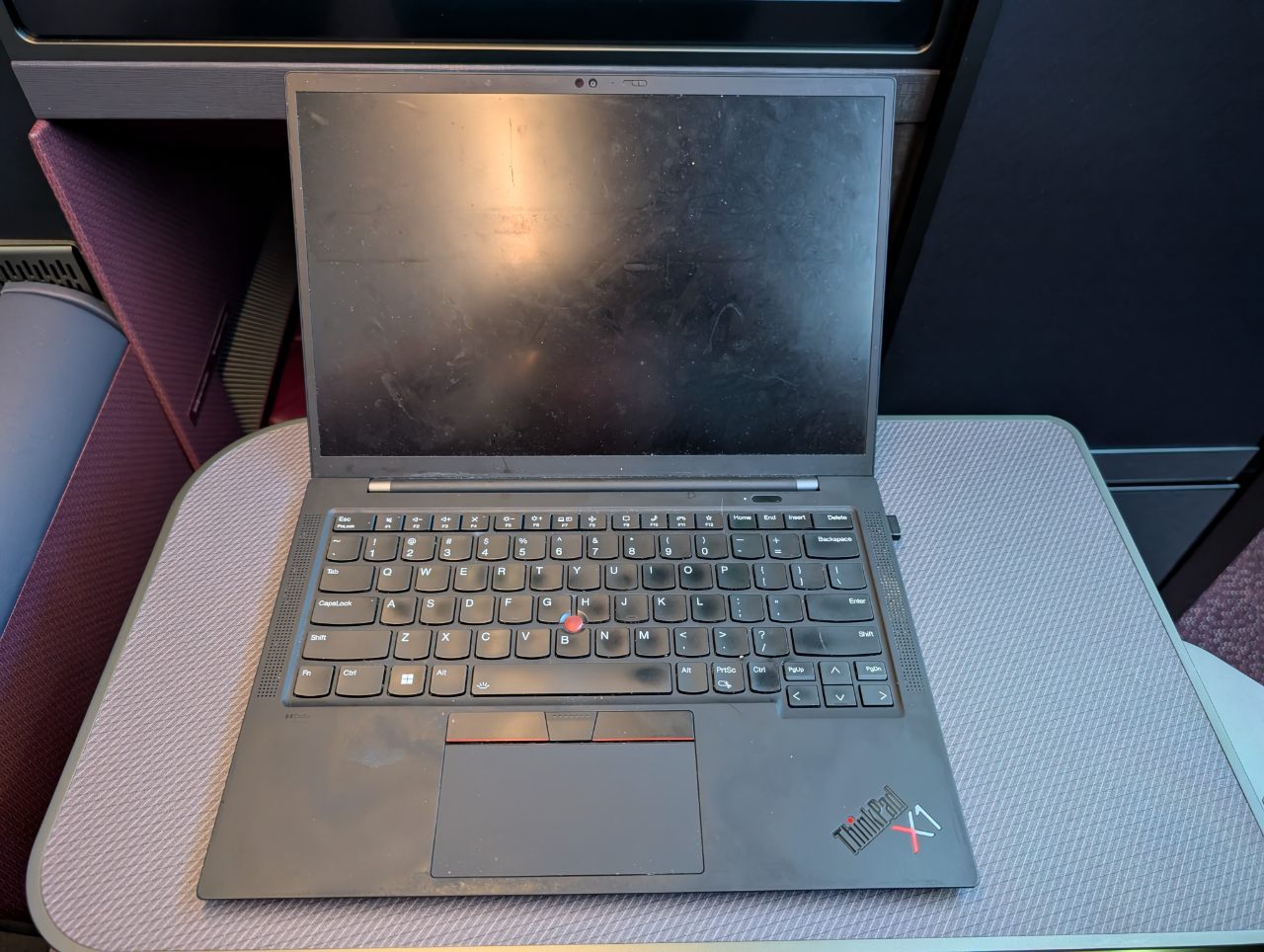
You know it’s complicated when they need to have a special video showing you how the table works!
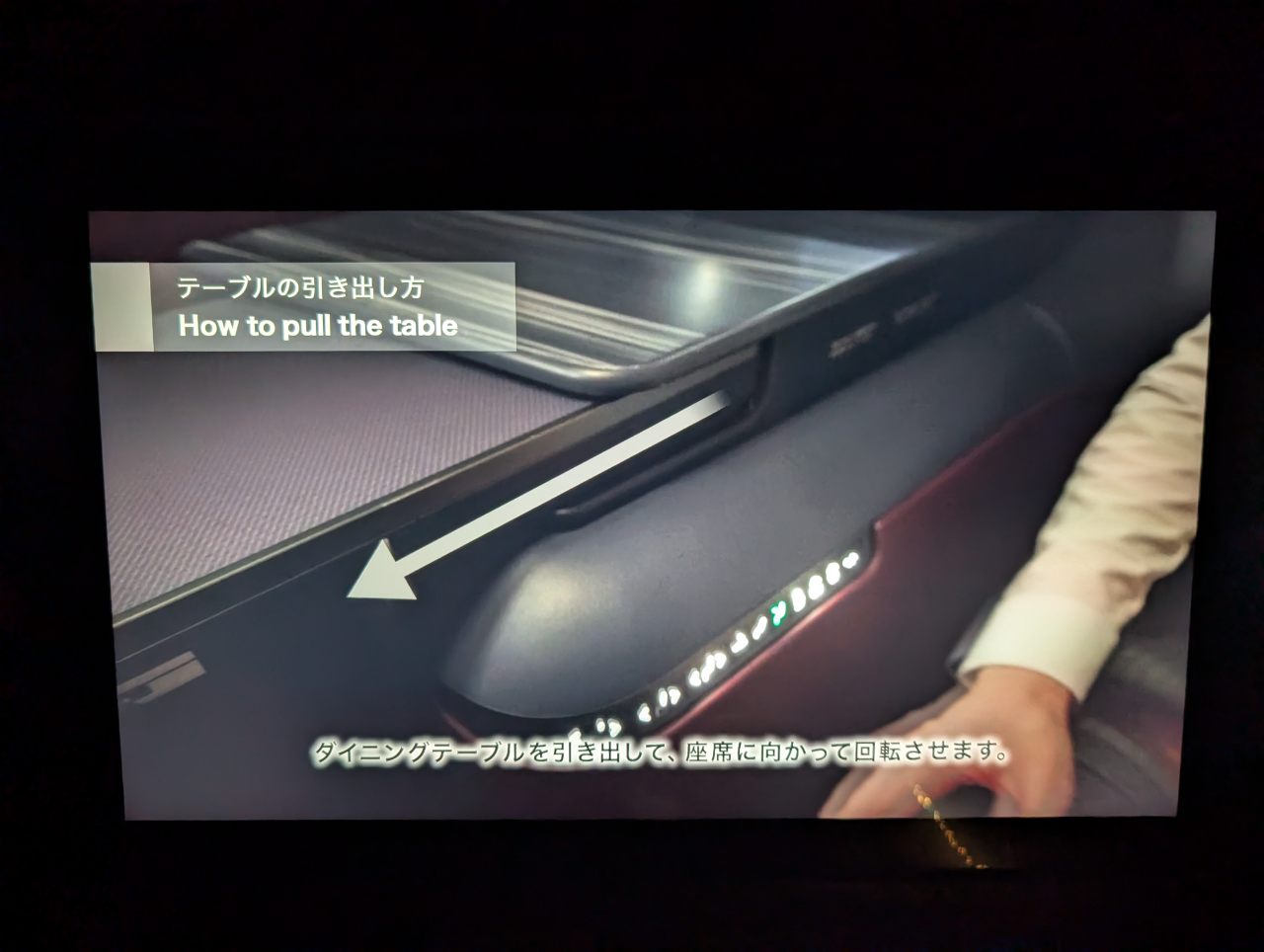
Japan Airlines opted against installing individual air nozzles on this aircraft, so there isn’t much you can do to adjust the temperature. I felt the overall cabin temperature was fine throughout the flight though.
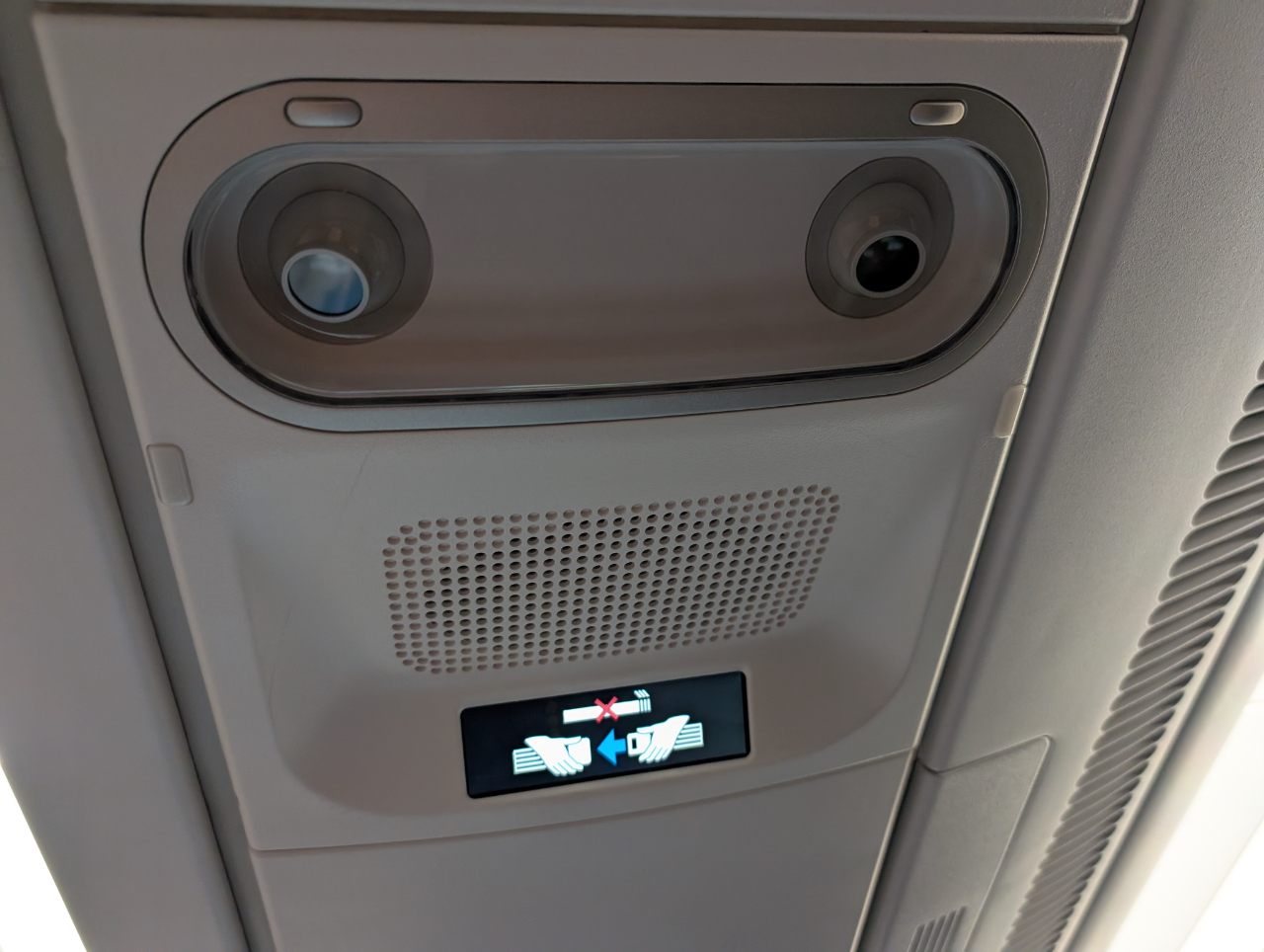
On the plus side, newer Airbus A350s come with dimmable windows, similar to those on the Boeing 787 Dreamliner. But unlike the Dreamliner’s physical buttons (which get grubby), Airbus uses a touch sensitive slider, which feels more hygienic. I also felt it did a much better job of blocking light completely.
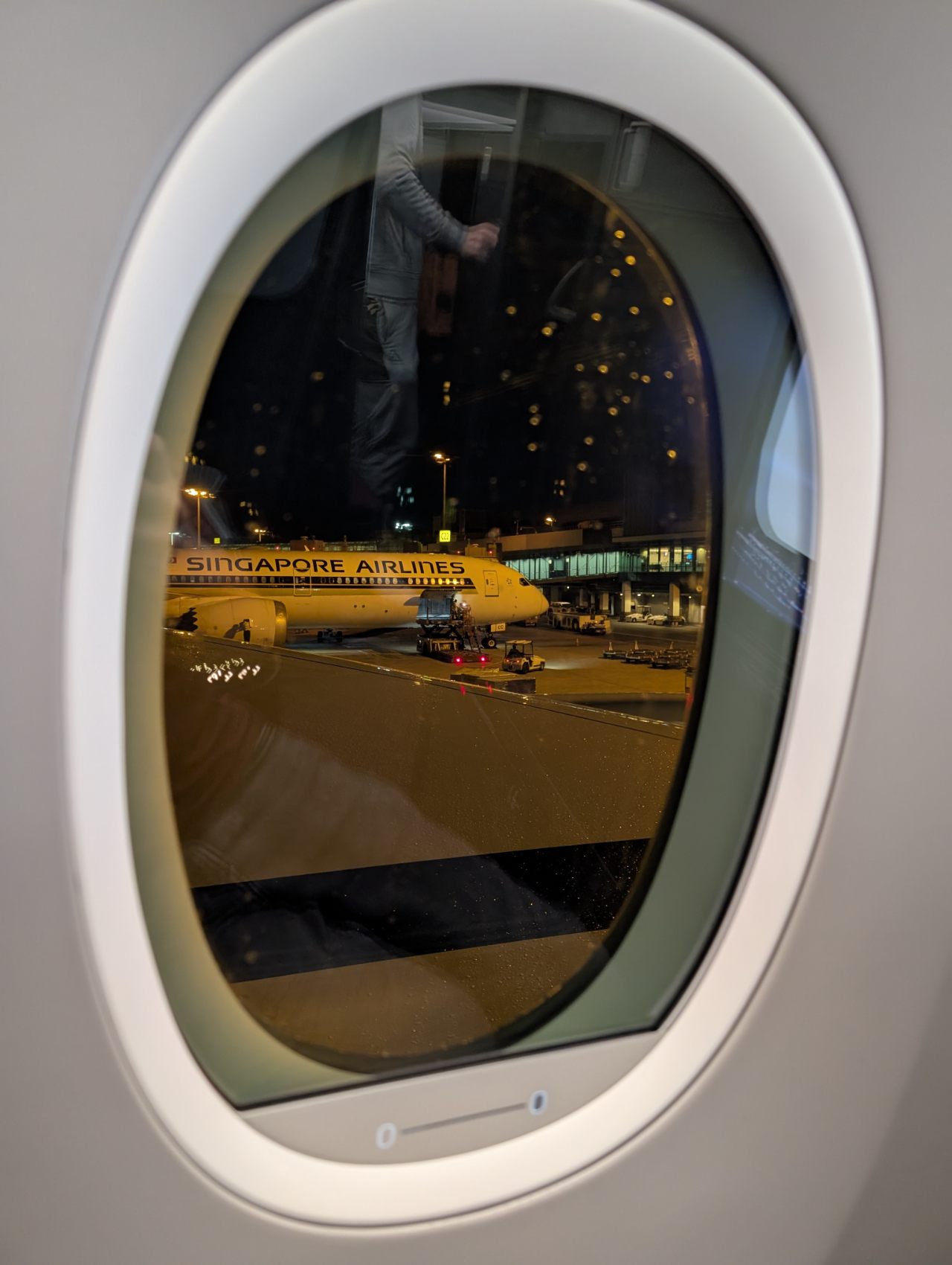
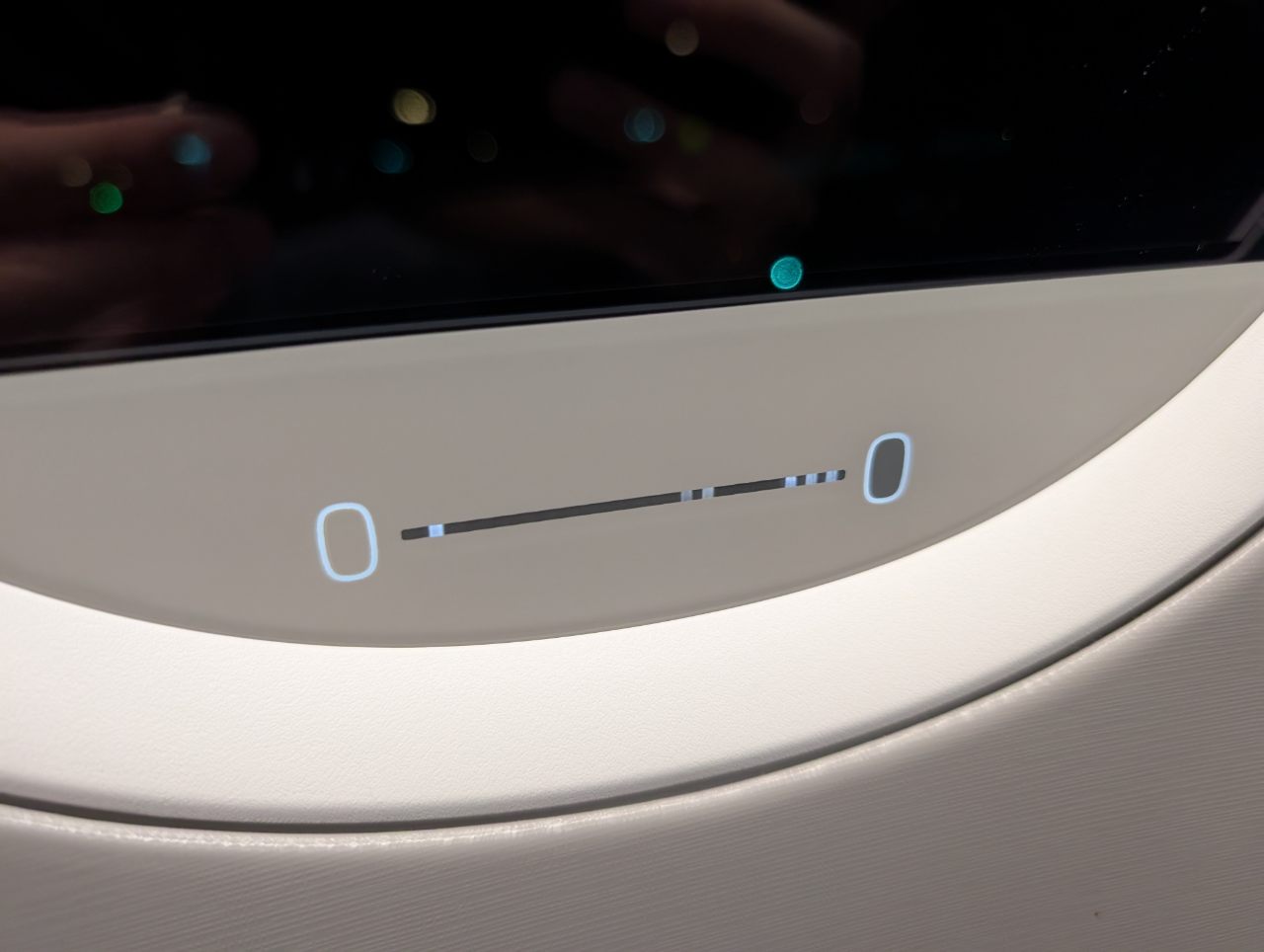
Amenities
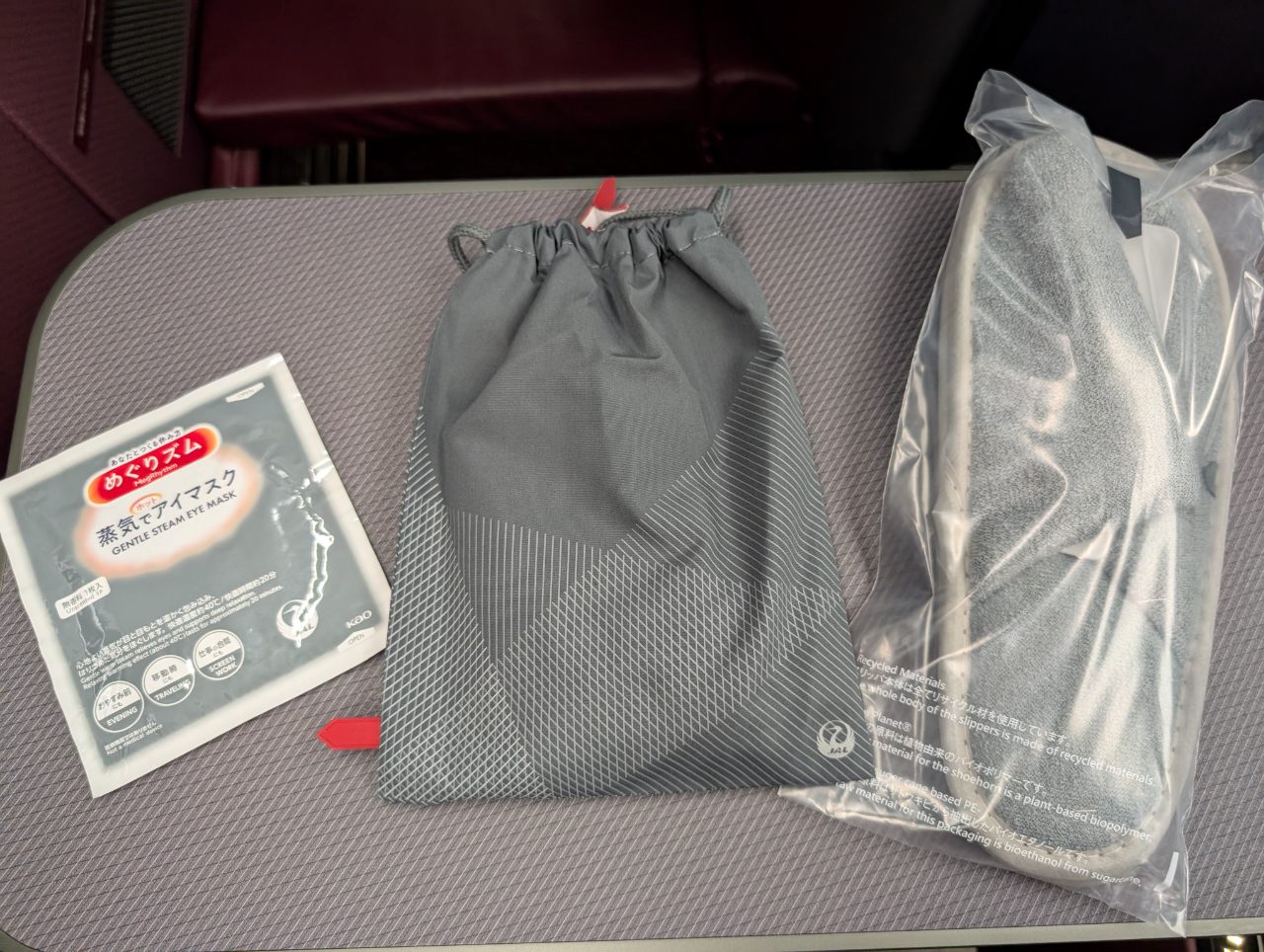
Japan Airlines offers amenity kits in Business Class, but the type you receive depends on the route. Passengers on long-haul flights to Europe and the USA receive an attractive-looking HERALBONY kit in one of six colours.
Passengers on shorter flights like Singapore receive a simpler unbranded kit with a moisture mask, ear plugs, eye mask and tooth brush. All passengers also received a steam eye mask and a pair of slippers.
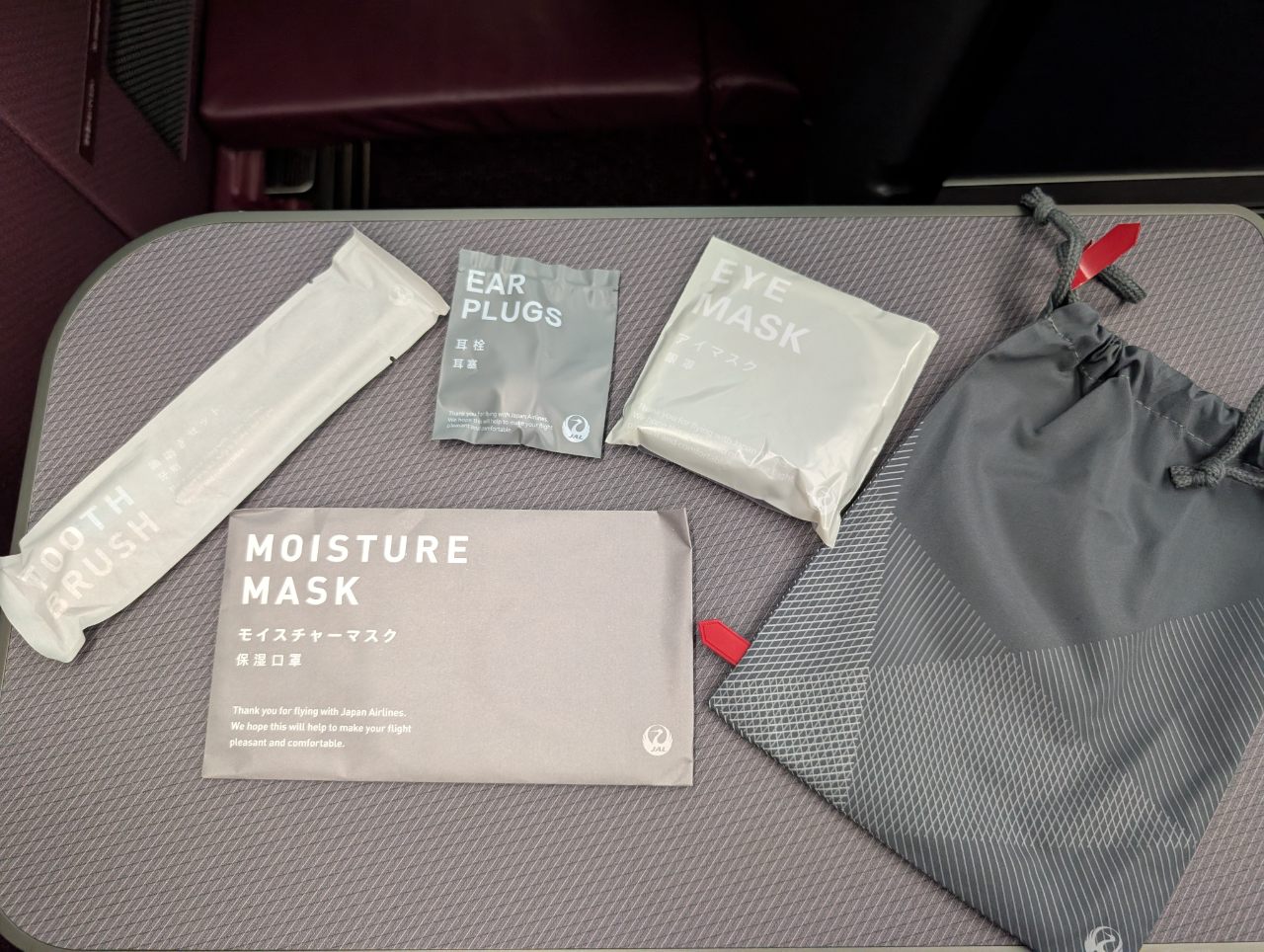
Blankets were also waiting at each seat, made of a soft and breathable material.
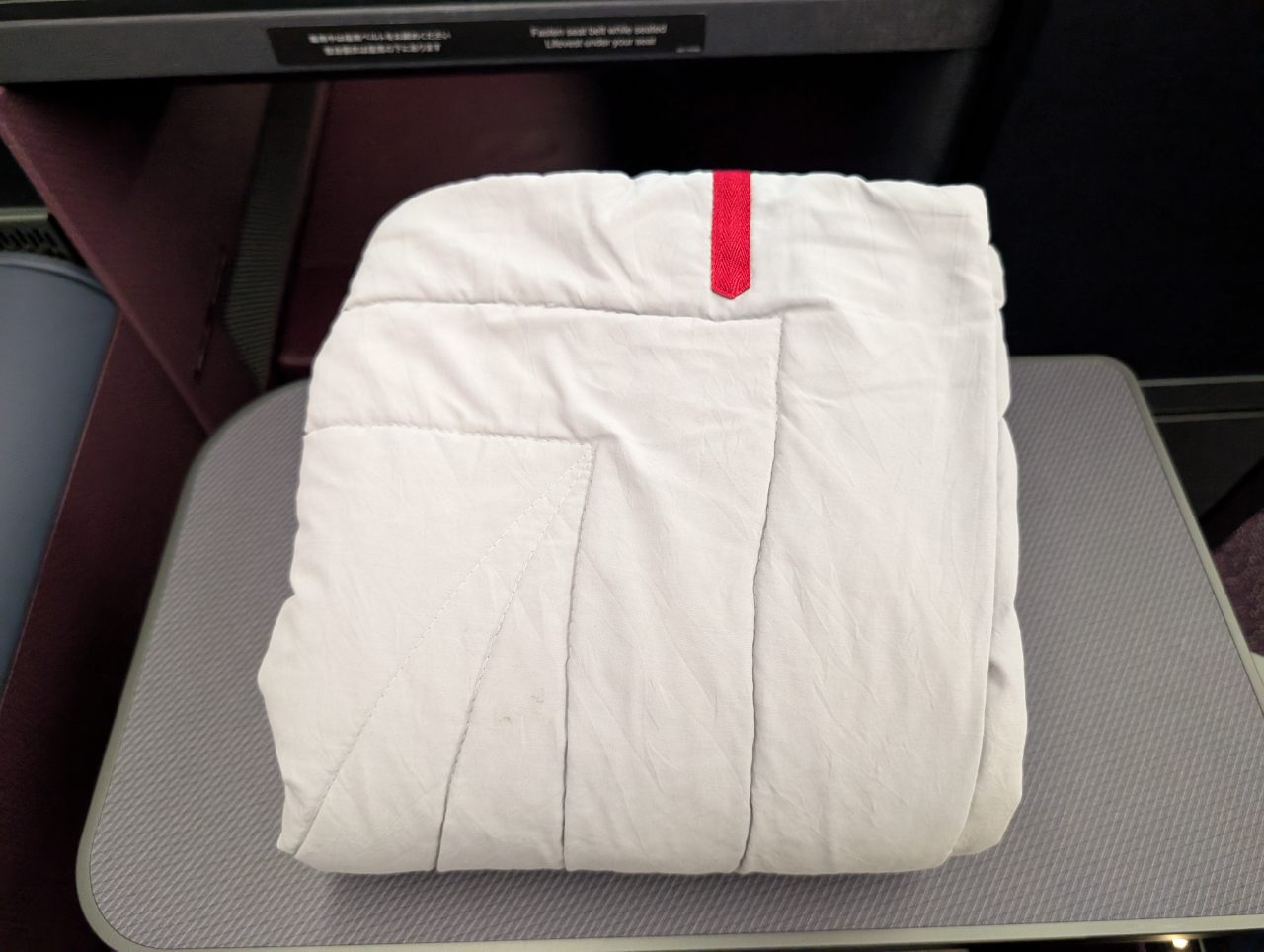
Food & Beverage
Pre-departure beverages were not served on the ground in Singapore, which felt a little amiss in Business Class. That said, based on past experience, Japan Airlines doesn’t serve champagne before takeoff anyway, instead opening a cheaper bottle of sparkling wine to avoid incurring taxes. You’ll need to wait till you’re airborne for the good stuff.
However, menus were waiting at each seat, and meal orders were taken before pushback.
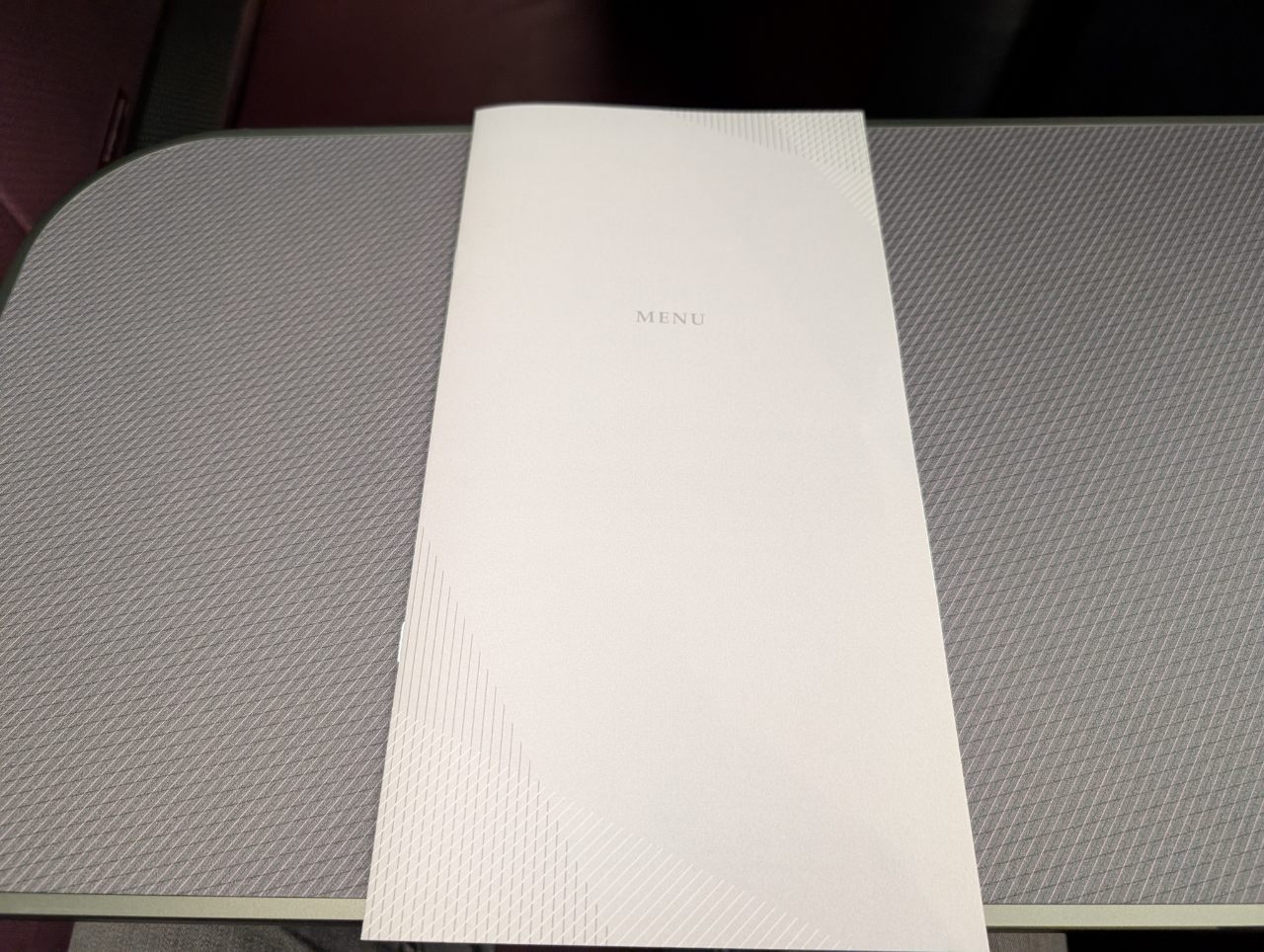
If you’re curious about what you can expect on your flight, inflight menus can be found on the JAL website three months in advance.
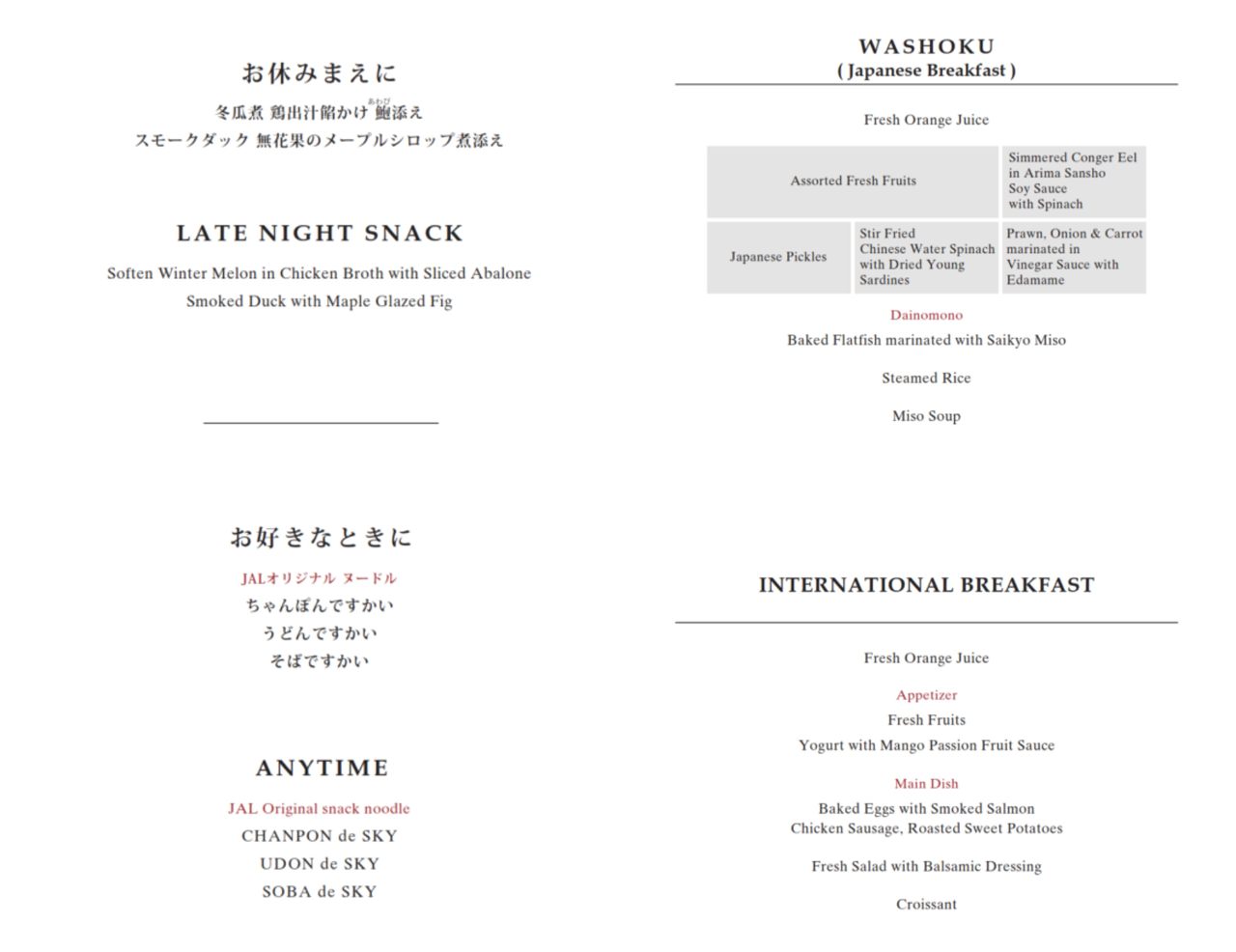
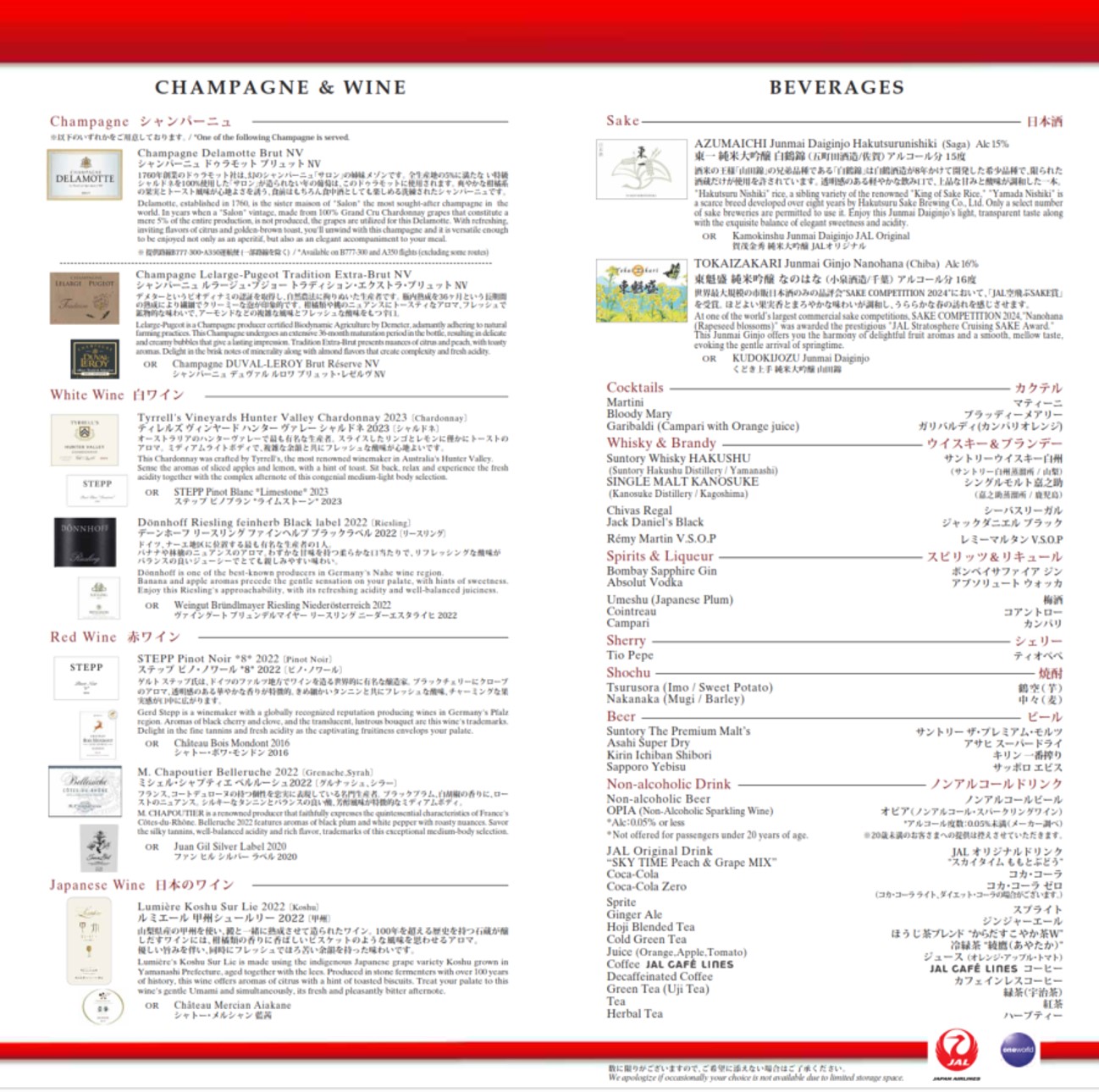
On this red-eye flight to Tokyo Haneda, a late-night cold snack was served about 50 minutes after take-off. This featured sliced abalone with winter melon in chicken broth, and smoked duck with figs. Given the late hour and the relatively short time, most passengers chose to skip it. I stayed awake just to take photos, though I did wish it had been served a bit earlier to allow for more sleep (I’ve seen hot dinners served within 30 minutes of take-off, so it’s certainly possible!).
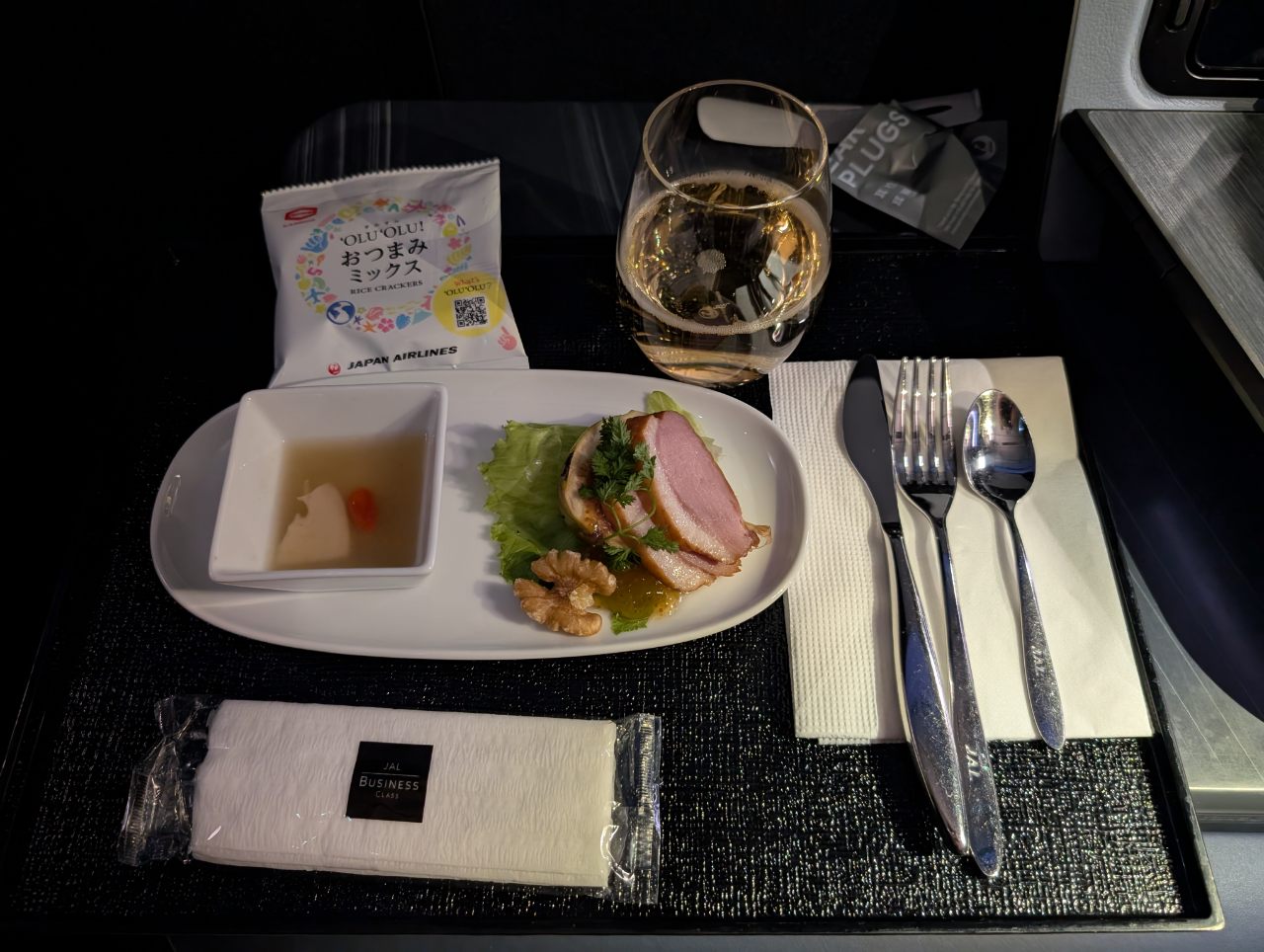
The main meal on this flight was breakfast, which the crew said would be served 2.5 hours prior to landing. I thought that seemed unnecessarily early for a red-eye, but thankfully, the cabin lights only came on with 1 hour and 50 minutes to go. Still, I would’ve appreciated more accurate information—when I woke up and saw there were just under three hours left, I didn’t think it was worth trying to sleep for just 30 more minutes. In reality, I could’ve squeezed in another hour or so.
For breakfast, I chose the washoku (Japanese set breakfast), which included several small side dishes and a main of miso-marinated baked flatfish, served with a small parcel of steamed rice. It was decent, though it definitely didn’t measure up to the quality of Japanese catering out of Tokyo.
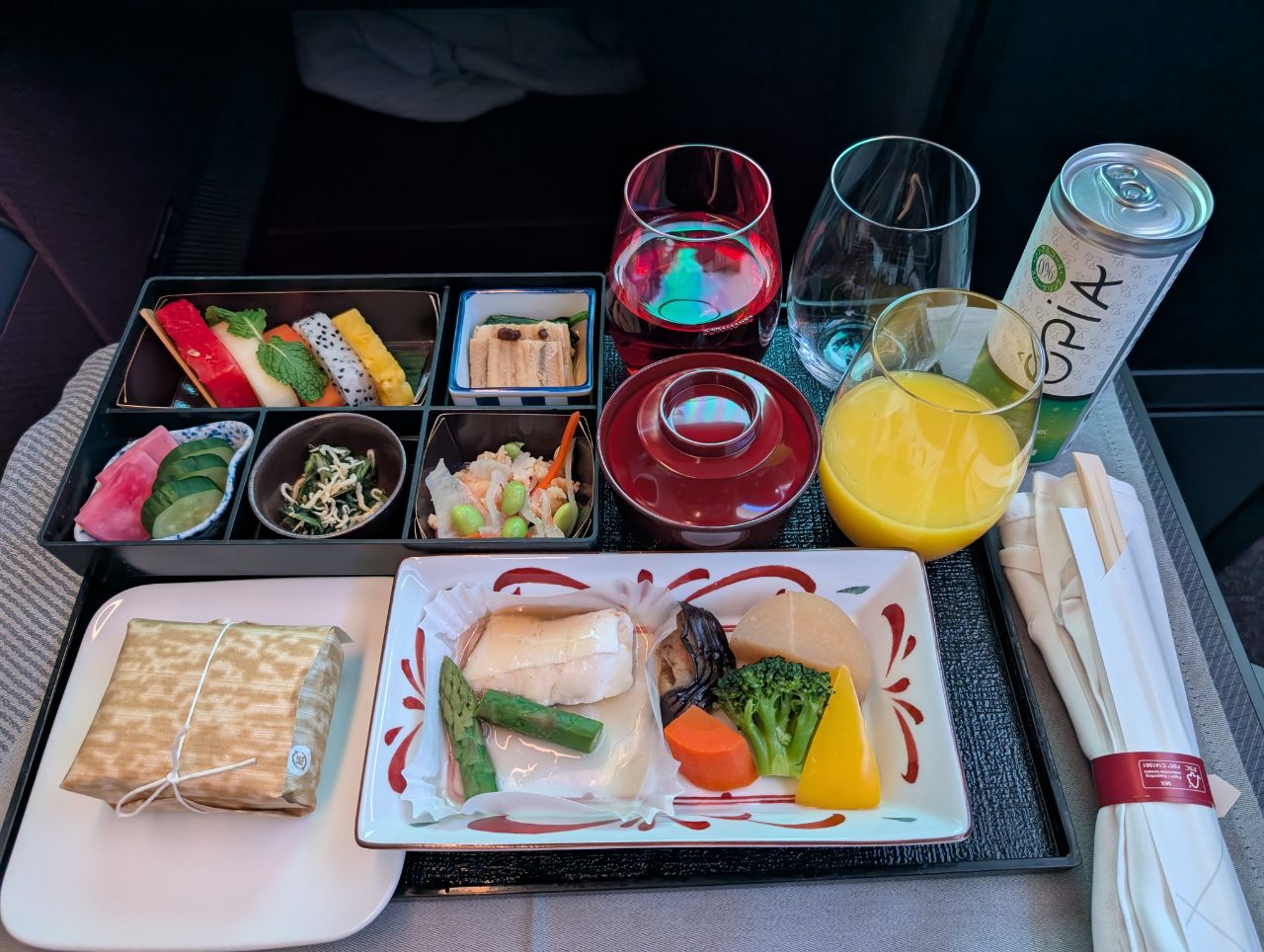
I wasn’t feeling like champagne in the morning, though if I did, it would be Delamotte Brut NV. So I opted instead for OPIA, a non-alcoholic sparkling wine (even though it’s non-alcoholic, JAL won’t serve it to passengers under 20 years of age, oddly). This actually tasted pretty nice, like a white wine spritzer.

There wasn’t much of a snack menu on this flight, with instant noodles the only option.
Inflight Entertainment
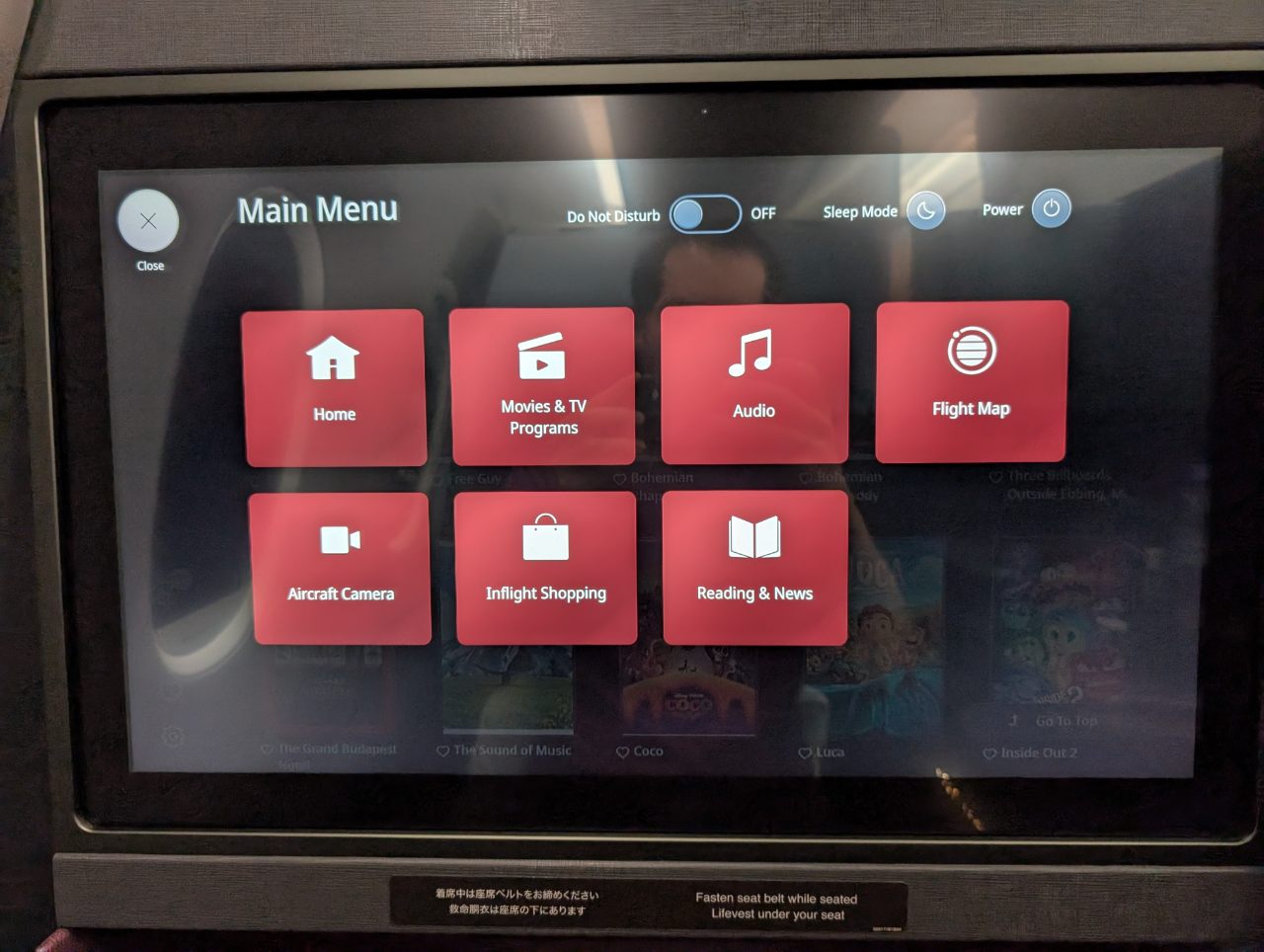
Each Business Class seat has a 24-inch personal inflight entertainment screen, with 4K resolution. This was touch-sensitive, and responded well to inputs with minimal lag.
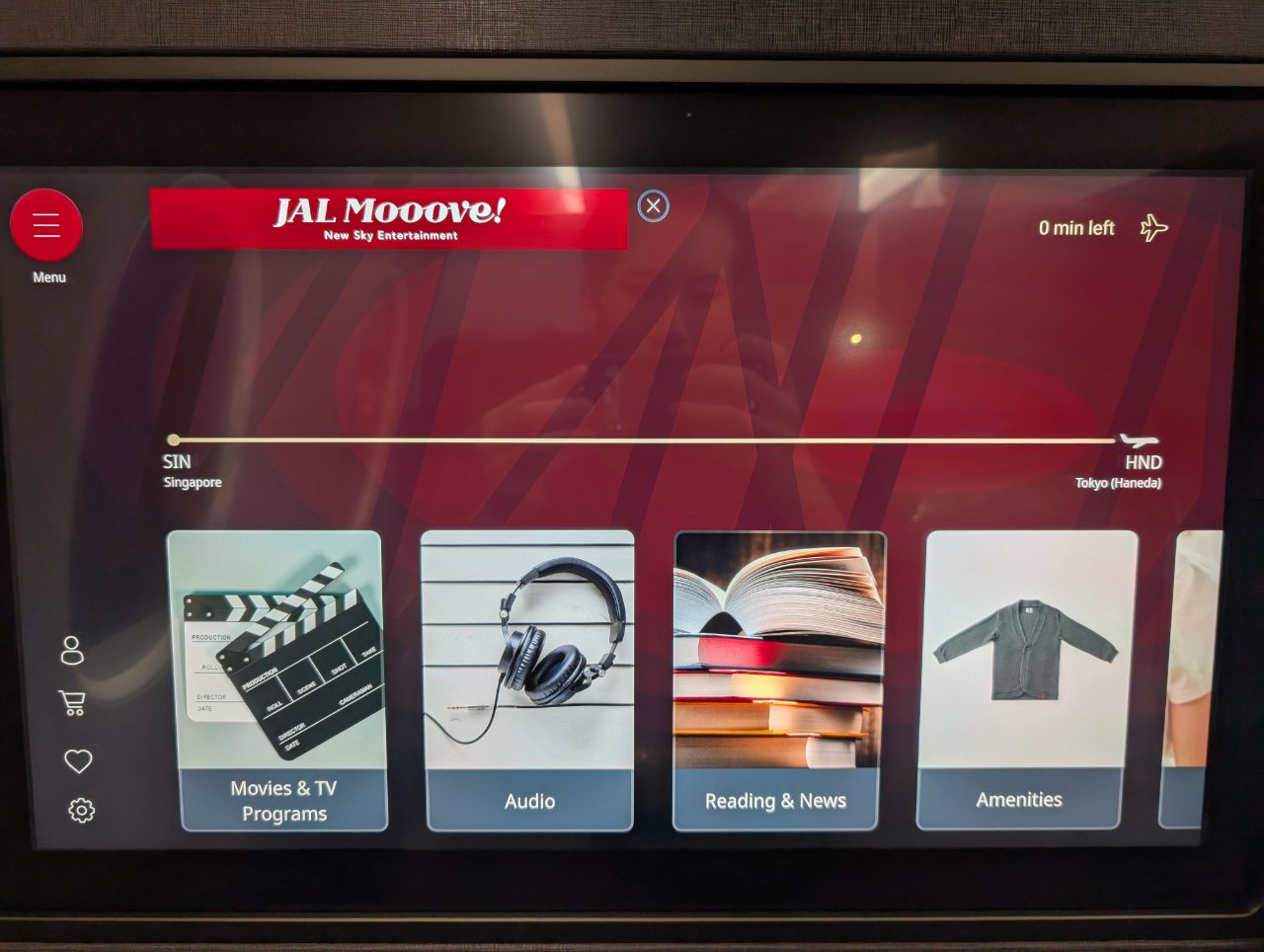
The selection of movies is alright, but clearly not on the same level as Emirates ICE or Singapore Airlines KrisWorld. I didn’t see a lot of first-run movies, and the selection of TV shows was rather random.
Moreover, one of my longstanding issues with Japan Airlines’ inflight entertainment remains unresolved: the user interface. As I’ve noted in previous reviews, JAL’s system is frustrating to navigate due to the lack of nested menus. Instead of listing a movie once and letting passengers choose their preferred language, the system displays the same title multiple times based on language tracks.
For instance, The Lion King, Touch, and Venom: Let There Be Carnage each appear twice. Multiply that across the entire library, and you’re left with an unnecessarily cluttered and inefficient browsing experience.
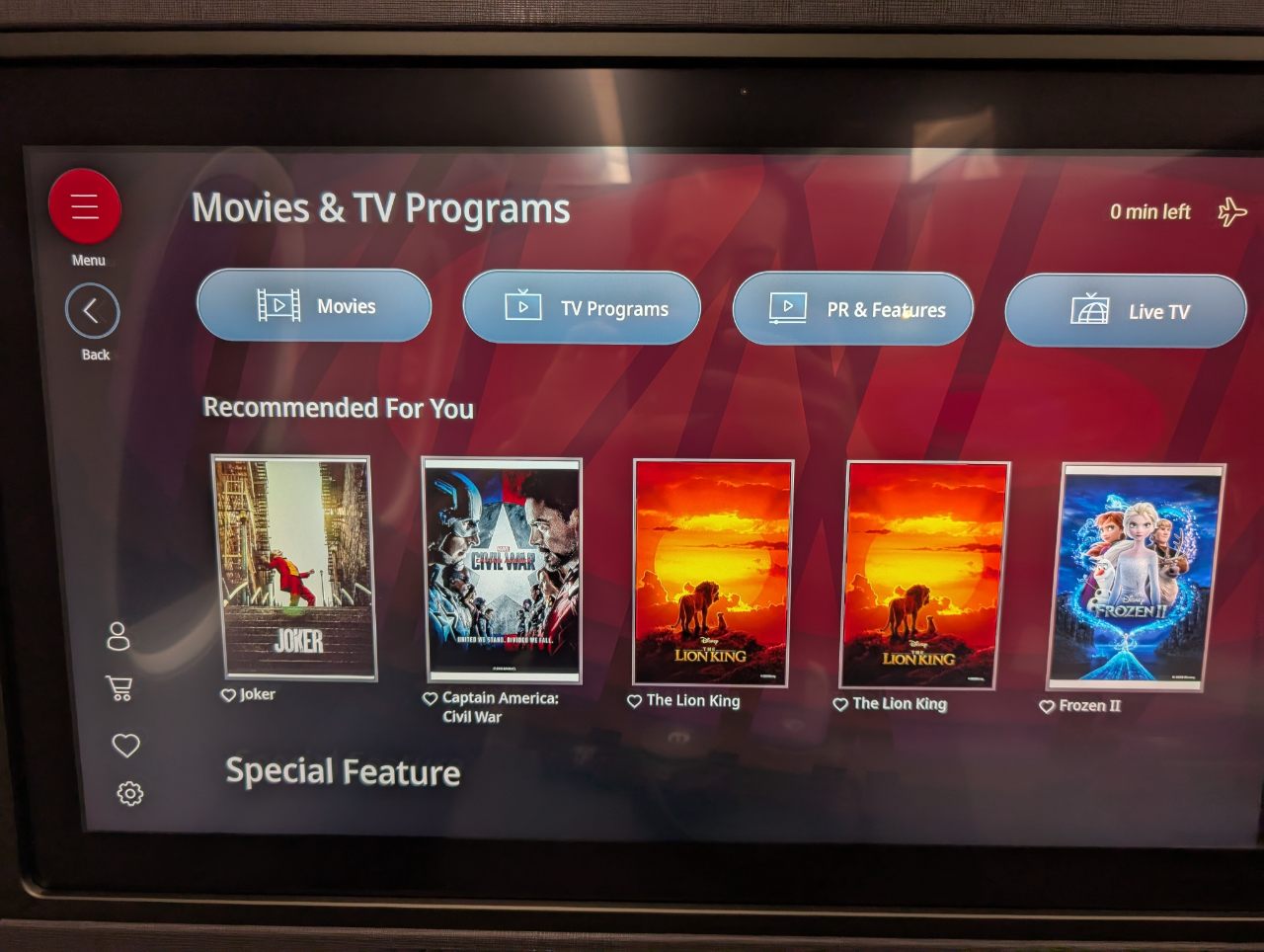
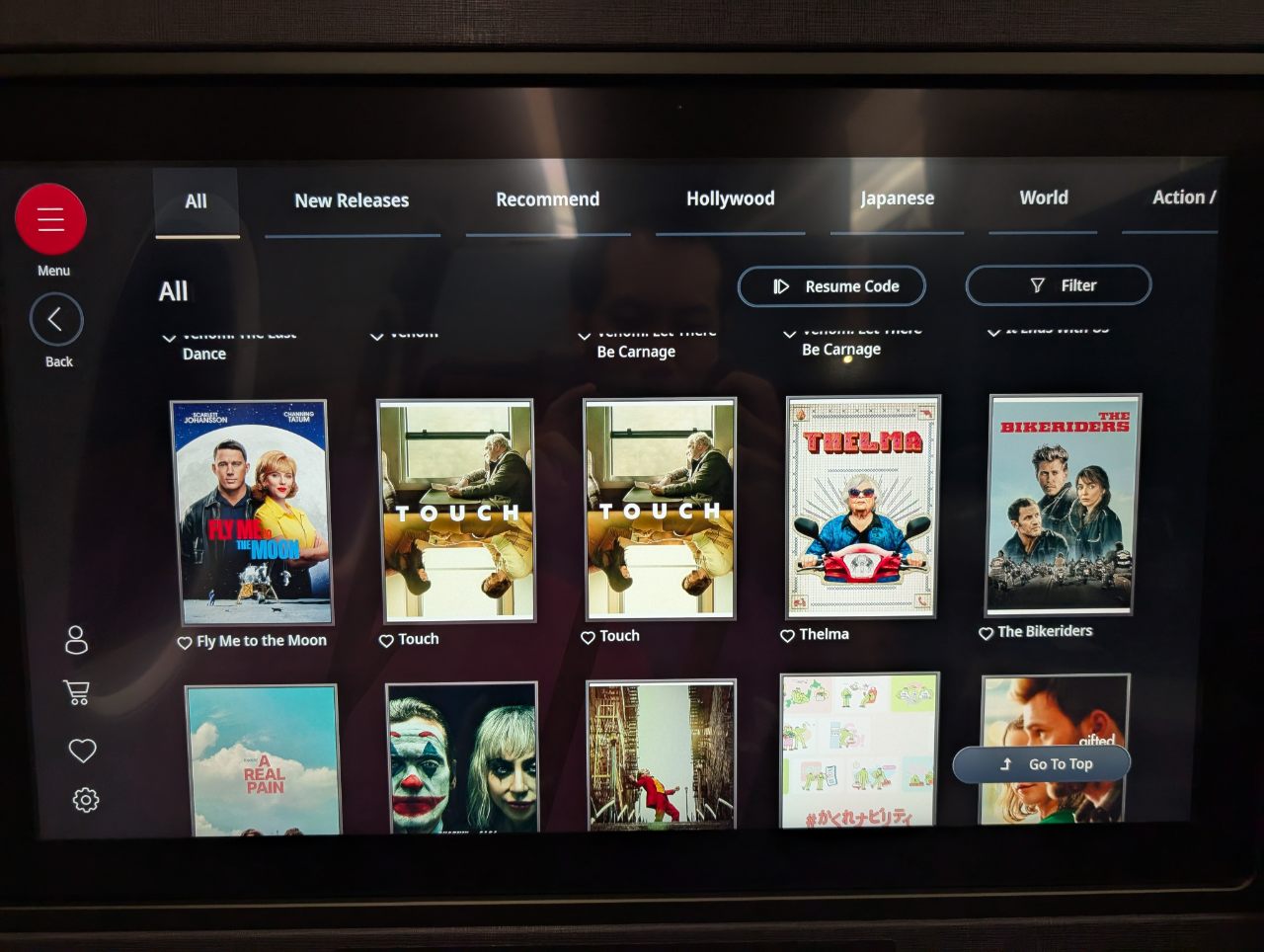
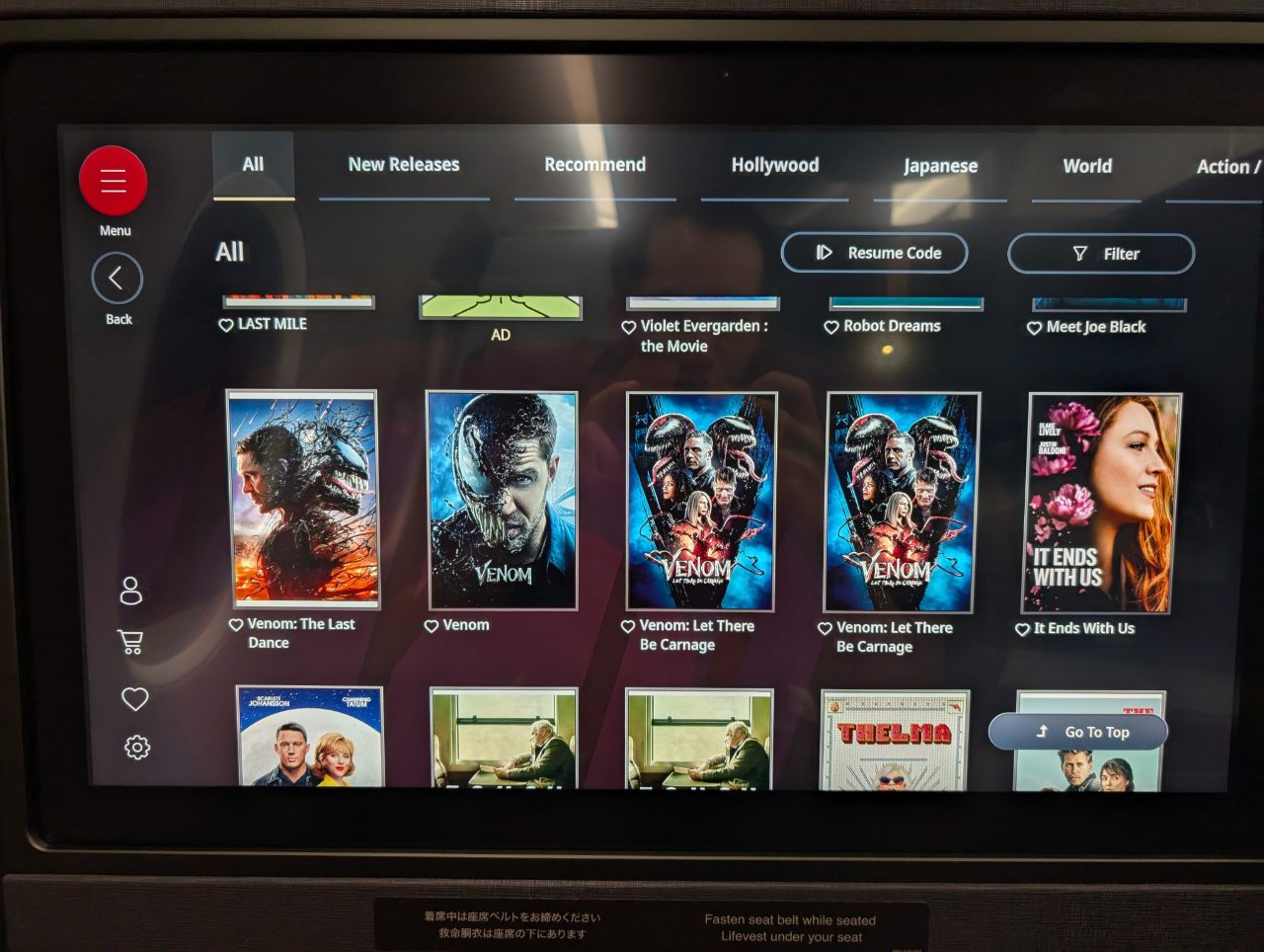
Another peeve is that some titles have subtitles “burned in”, with no option to switch it off. I’m a subtitles man myself, but others dislike them because of potential spoilers.
Of course, 4K screens are only worthwhile if there’s 4K content to match, and this is another area where MAGIC falls short. When browsing the library, there was no indication of which titles were available in 4K (for comparison, airlines like Cathay Pacific have a dedicated category for 4K movies).
The only reference to 4K I found was on Top Gun: Maverick. That either makes it the sole 4K title in the library, or a sign that JAL’s labeling is inconsistent
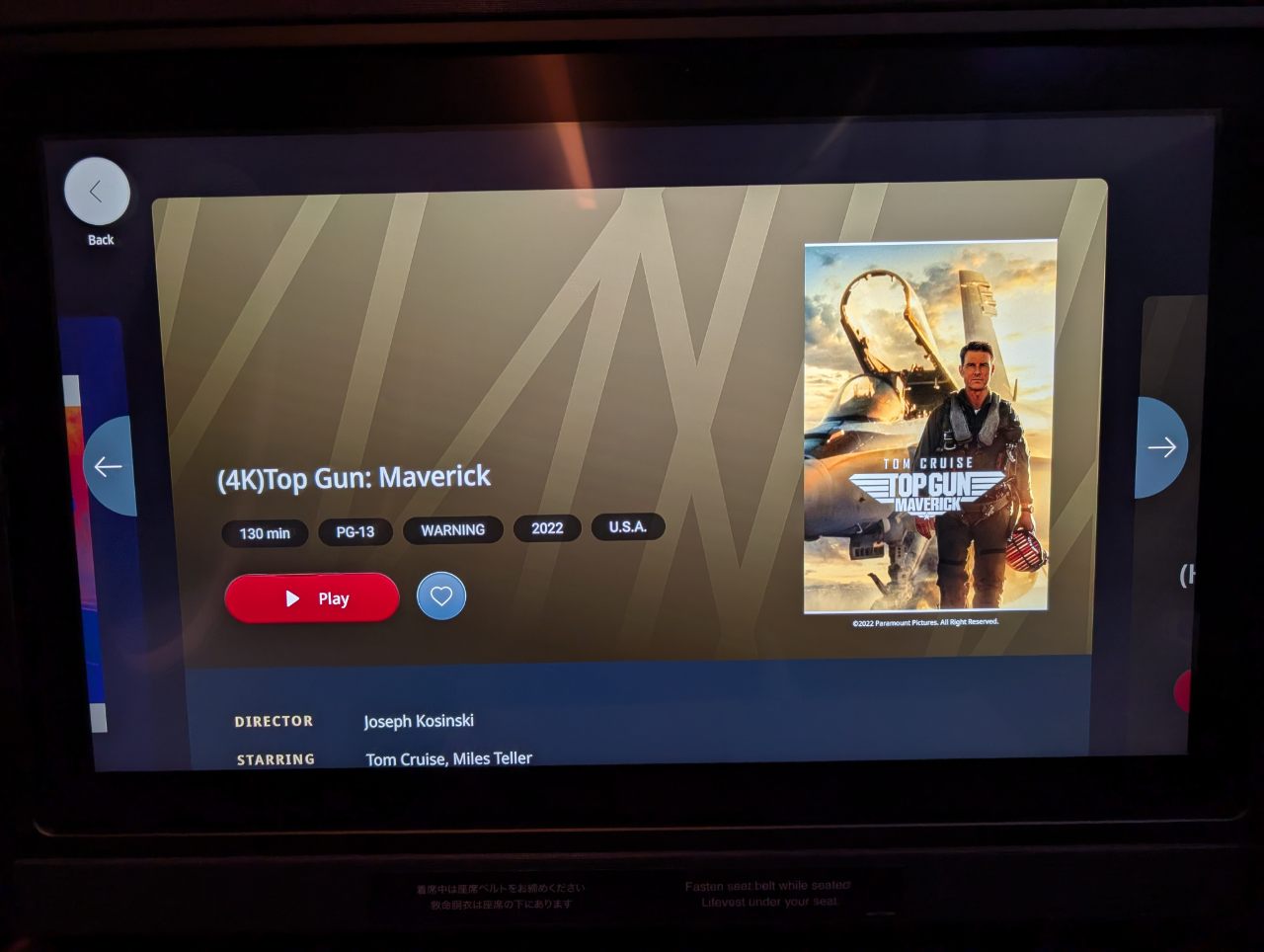
Another feature that feels more gimmicky than useful is the “resume code.” When you exit a movie, the system generates an eight-digit code that lets you continue playback at the same point on a future flight. But honestly, who’s going to bother writing that down? Even if you have a connecting JAL flight the same day—and assuming it uses the same system—wouldn’t it be easier to just scrub through the timeline manually?

But I’ll tell you what isn’t gimmicky: headphone-free audio. Japan Airlines is the launch customer for Euphony, which allows passengers to watch movies and listen to music without wearing headphones.
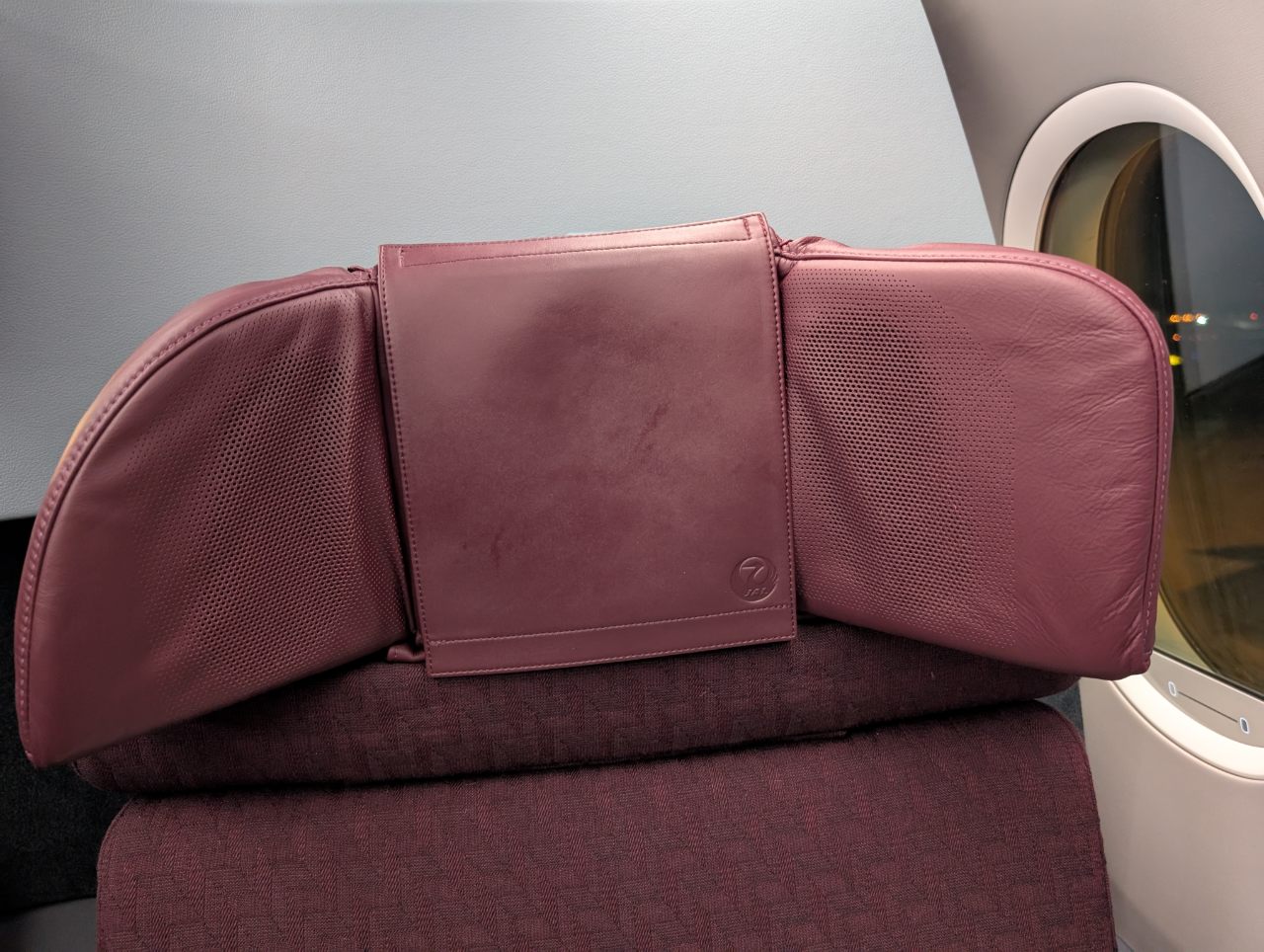
How this works is that speakers are built into the headrest’s wings, which can be adjusted to direct the audio into your ears.
I won’t lie. The first time I heard audio coming out of the headrest, I broke into a grin. I mean, how can you not, when the novelty value is off the charts? Here I am, on an airplane, watching a movie without headphones while simultaneously not being the worst person in the world.
I quickly came to appreciate the perks of headphone-free watching, such as no compression on the ears, and no wires to snag. It was easy to chat with the crew when they came around with drinks, and during meals, I avoided that odd pressure sensation you sometimes get when chewing with noise-cancelling headphones on.
What’s more, my fears of a cabin cacophony never came to pass. I don’t know how many passengers were using this feature, but when I cranked up the volume to max on Gladiator 2 and stood outside my suite with the door closed, I couldn’t hear a thing.
In fact, my main criticism of Euphony was that it was too quiet. I understand that with a potentially controversial innovation like this, you’d want to err on the side of caution. But I think that concerns about noise leakage may have caused Japan Airlines to overcompensate. Even with the volume at max and the headrest wings folded in, there were moments when I struggled to hear the dialogue (and before you say I’m just hard of hearing, I’m the kind who can’t go to sleep if there’s a dripping tap in the bathroom).
Interestingly, a review of the First Class experience mentioned that the Euphony system was too loud, which suggests that proximity to the engines is everything. The A350 already has a relatively quiet cabin, so if you’re seated in First Class and farther away from the engines, you’ll be able to hear things more clearly than in Business Class.
Other drawbacks include the audio quality— this is clearly not a solution for audiophiles. Leaving aside the absence of noise-cancelling performance, the sound sometimes came off as tinny. I suspect you’d notice this more with music videos or movies with grandiose soundtracks, and if you want high quality fidelity, stick to headphones.
There were also some annoying software issues. I encountered situations where the audio lagged the video ever so slightly (but enough to cause disorientation), and on several occasions, I just couldn’t get the headrest speakers to play, even after restarting the programme several times. I also noticed that every time a cabin announcement finished, the video would resume playing immediately, but the audio would take about five seconds to resume, causing me to miss some details.
So it very much feels like a beta product, but I’m excited to see where this goes.
Japan Airlines’ Euphony headphone-free audio: Magic or madness?
If headphone-free listening is not really for you, never fear. Japan Airlines still provides conventional noise-cancelling headphones.
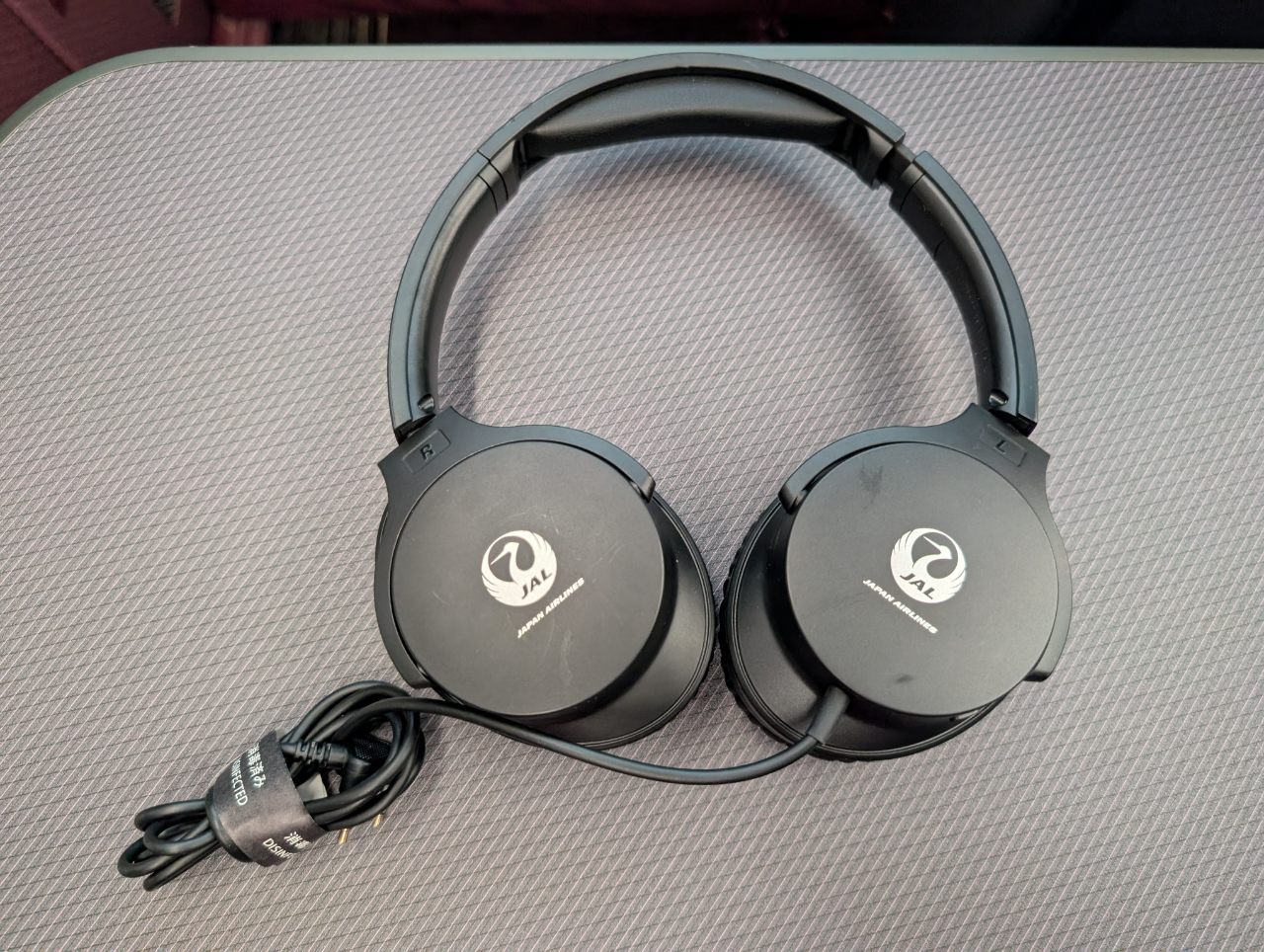
Alternatively, you can also pair your personal Bluetooth headphones with the IFE system, but the pairing process is not as intuitive as other airlines as the option is hidden beneath several layers of menus.
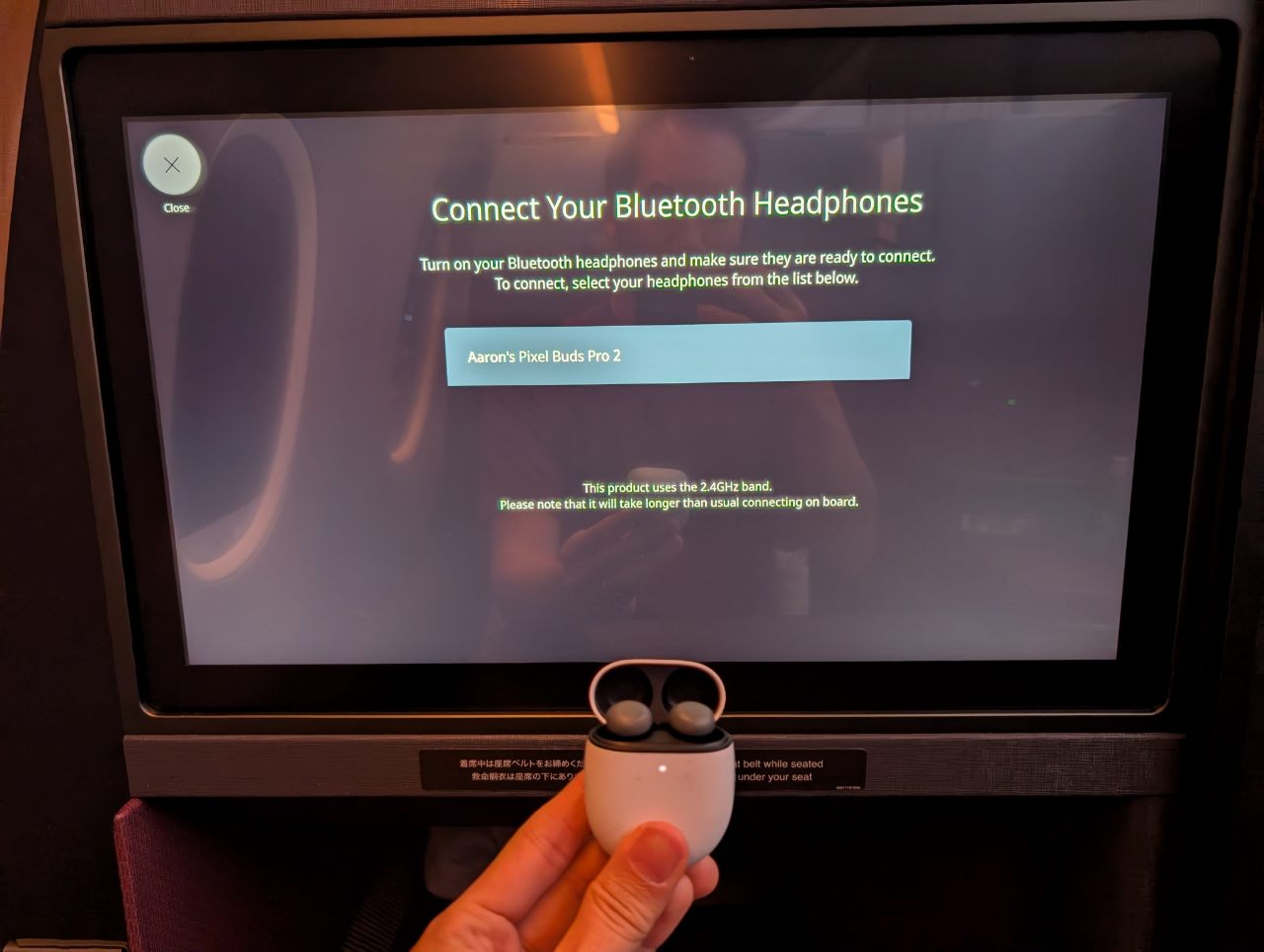
Wi-Fi
Japan Airlines offers Wi-Fi across most of its fleet.
- First and Business Class passengers enjoy unlimited complimentary Wi-Fi
- Premium Economy and Economy Class passengers enjoy 1-hour complimentary Wi-Fi
Otherwise, the following charges are applicable.
| 📶 Japan Airlines Wi-Fi Pricing | |
| Duration | Cost |
| 3 hours | US$14.40 |
| 24 hours | US$18.80 |
Unfortunately, JAL’s process for obtaining the free Wi-Fi allowance is clunky and unintuitive. Unlike other carriers where all you need to enter is your last name and seat number, JAL requires you to generate a promo code.
I couldn’t figure out how to do this from the online portal, until a flight attendant told me I had to scan the QR code on the laminated Wi-Fi card tucked away with the rest of the safety and reading materials.
This brought me to a portal where I had to enter several pieces of information, including flight date, reservation number (good luck recalling that offhand!), and a phone number. Finally, a promo code was generated.
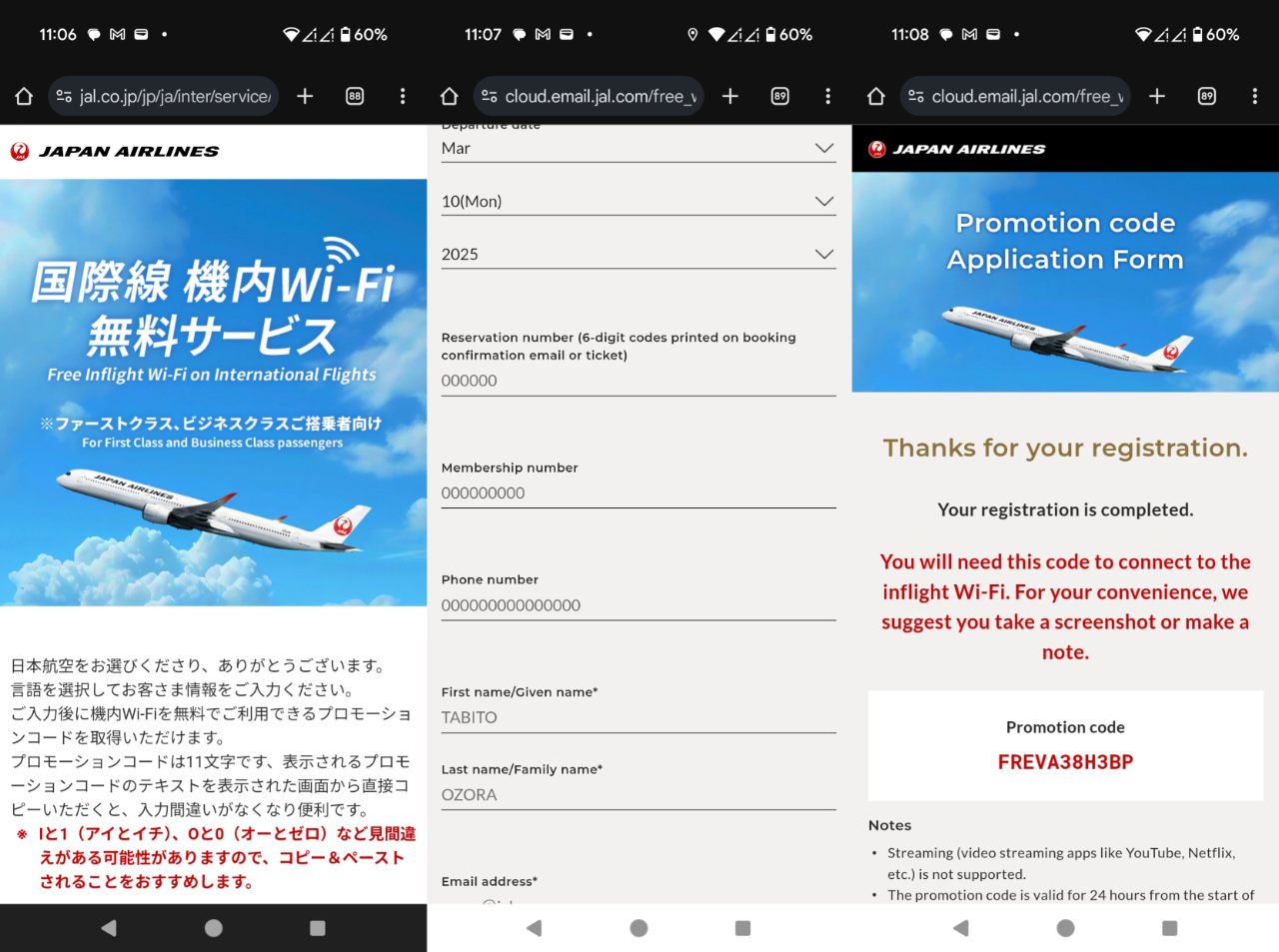
Wi-Fi speeds were very impressive at first, but progressively slowed down as the flight went on due to more people logging on.

Sleep Experience
As this was a red-eye flight, I was keen to get to sleep as soon as possible.
After having the late-night snack, I converted the seat into a bed and found it to be comfortably wide around the shoulders and feet. Staggered configurations typically struggle with footwell space, so it was a pleasant surprise that this was an exception.
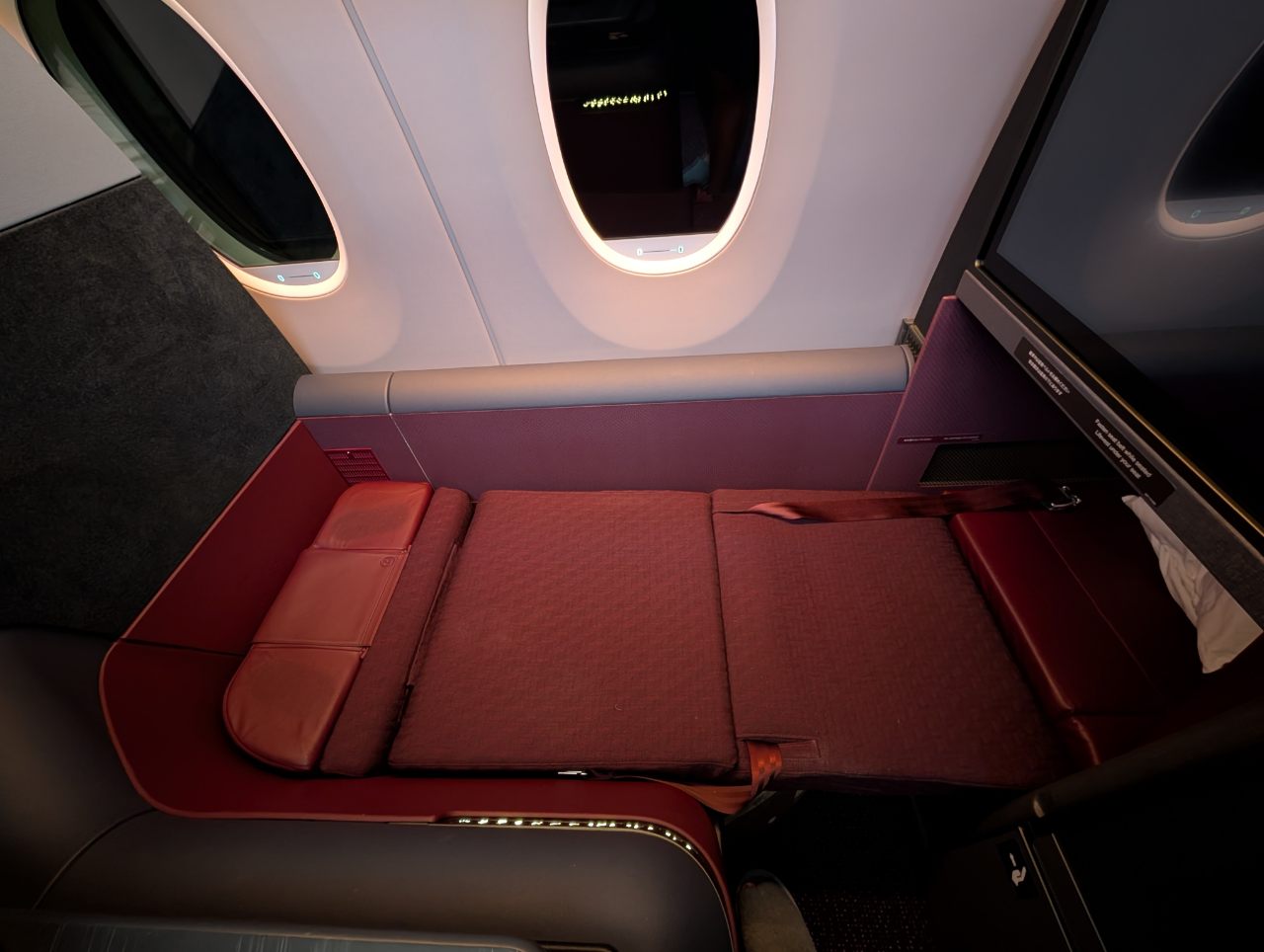
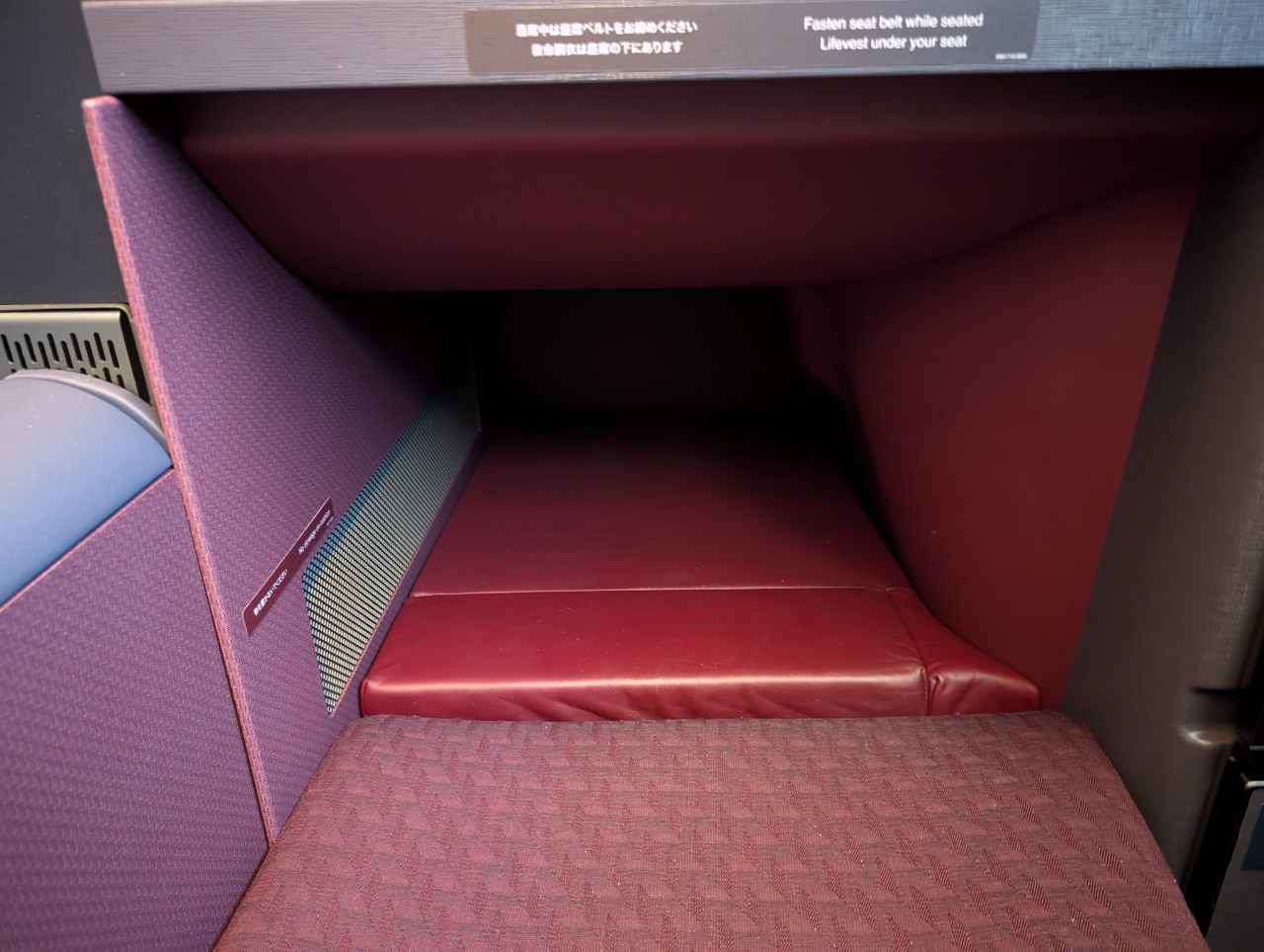
JAL is known for its comfortable Airweave mattresses, but unfortunately, they aren’t offered on flights between Singapore and Japan. To experience them, you’ll need to be flying to destinations like Australia, Canada, Europe, or the U.S. (excluding Hawaii and Guam). It’s a shame they don’t make an exception for red-eye flights like this one—it’s already a stretch comfort-wise.
Also worth noting: JAL doesn’t provide pajamas in Business Class, except on A350-1000 flights to New York, Dallas Fort Worth, Paris and London. However, you can borrow a cardigan through the inflight entertainment system, which must be returned before landing.
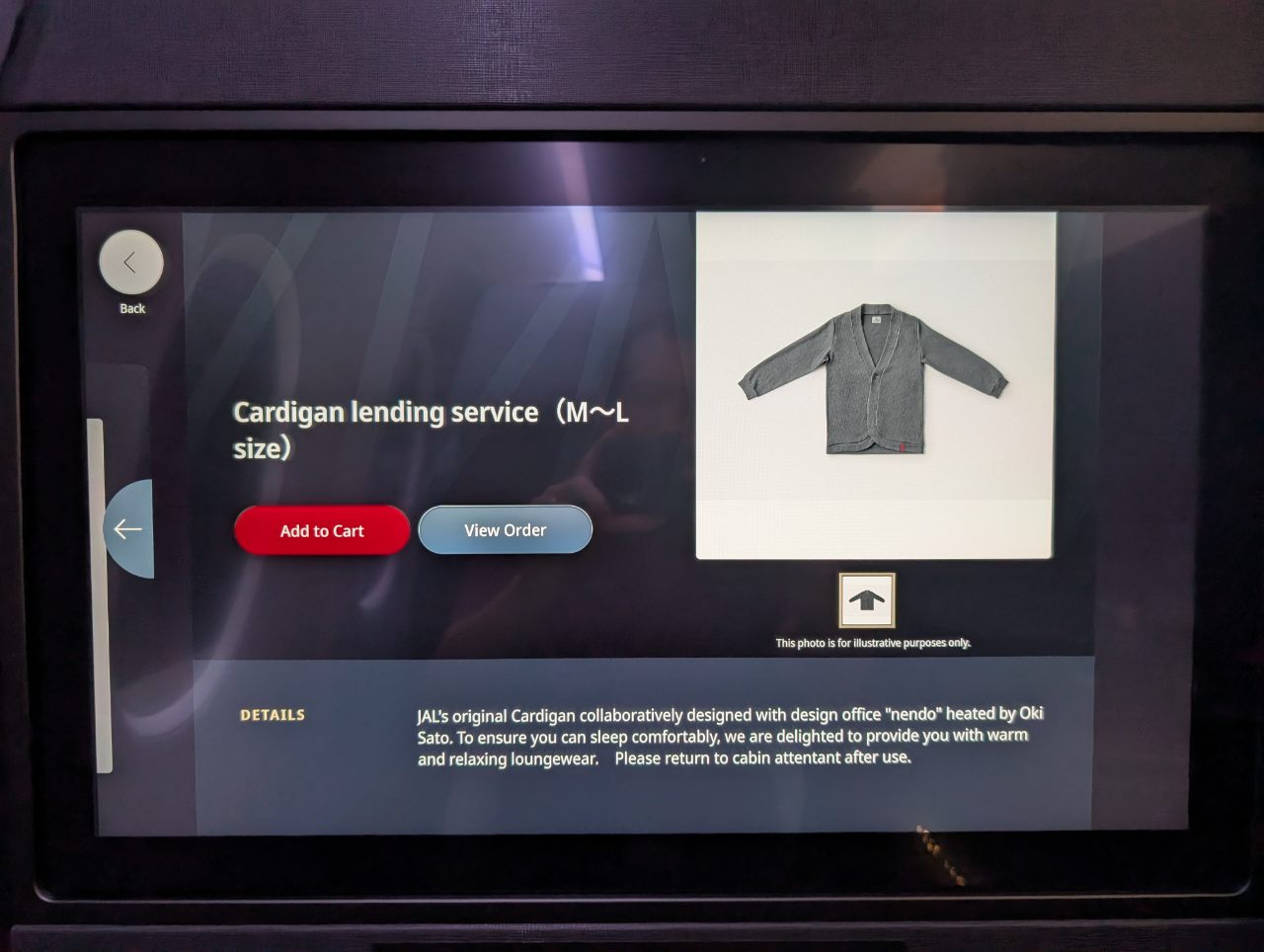
Still, I found the sleep experience to be very good, but for one big design flaw: the seat controls.
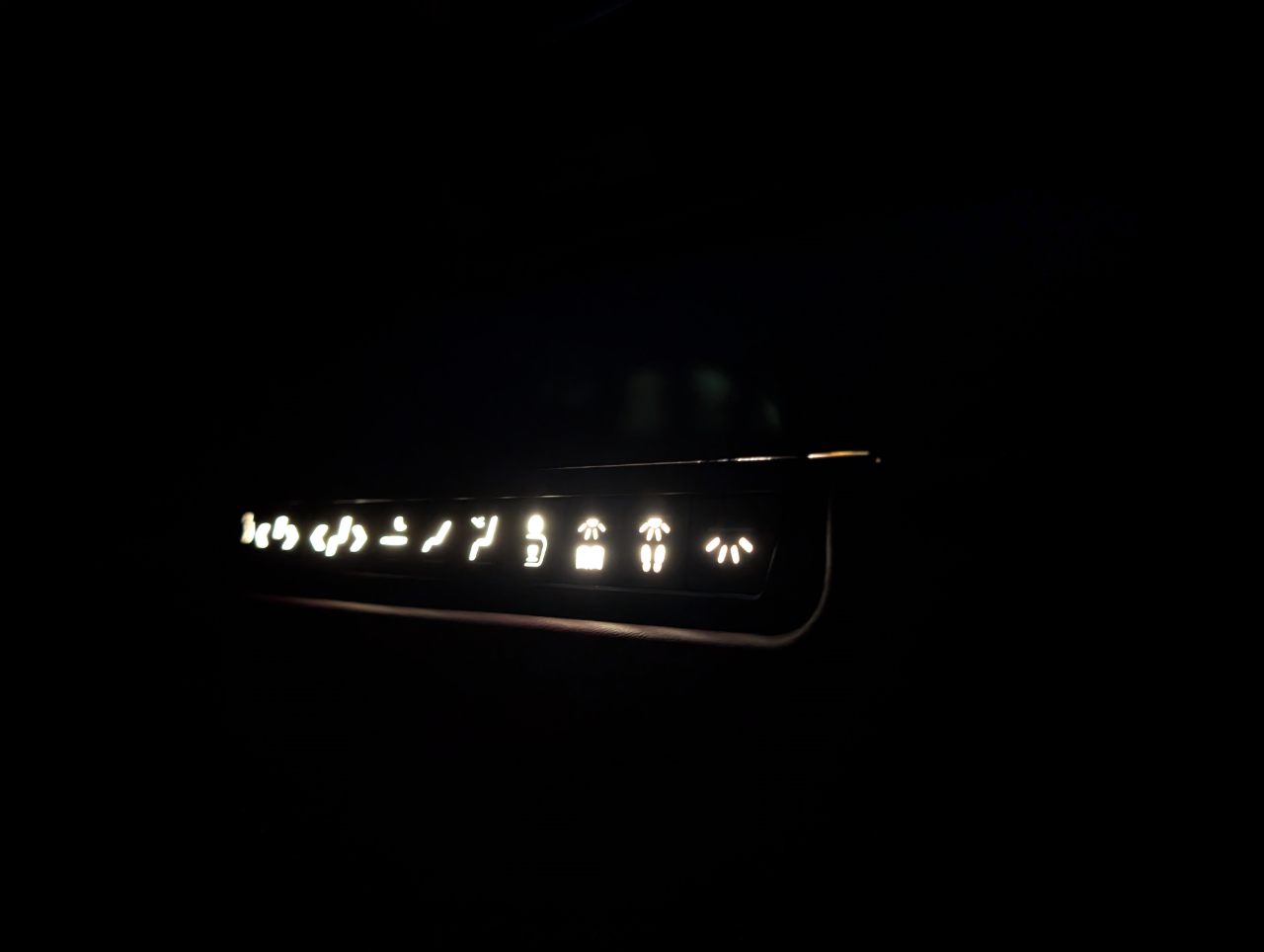
When fully reclined, the seat controls are at eye level, and they’re very bright. I thought they’d have two levels of lighting, a brighter one for when they’re activated and a dimmer one when they’re on standby, but it was bright throughout. If you’re sensitive to light, as I am, you’re going to find this annoying.
Lavatories
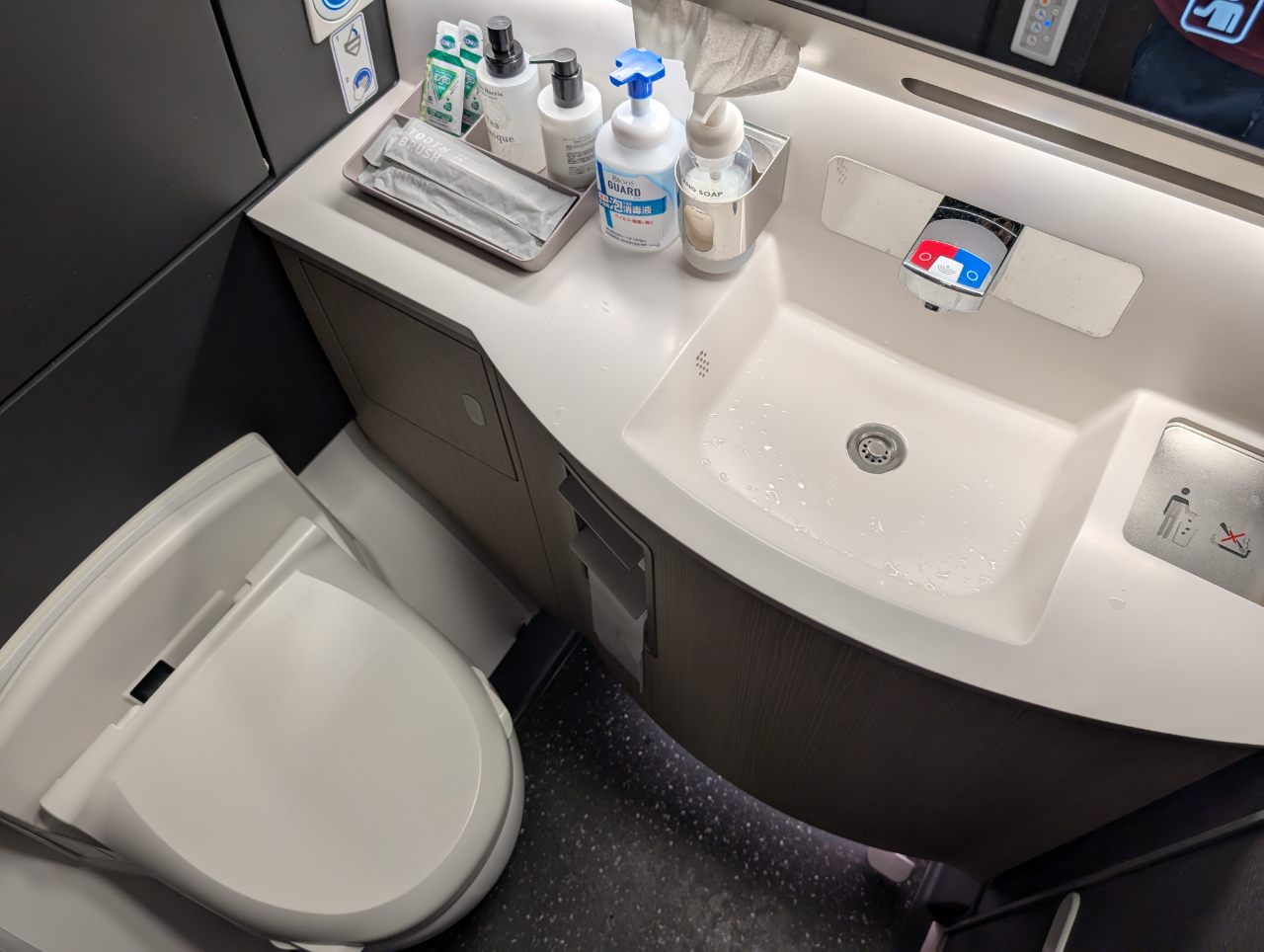
There were a total of three lavatories for the 56 Business Class passengers, all located between the forward and rear cabin. They weren’t very spacious, but were kept clean throughout the flight.
There were a couple of nifty features I liked, such as how the attendant call, return to seat and lock icon were all integrated into the mirror itself. There was also a backlit circular cutout with a magnification for shaving or applying make up. The tap and flush were also fully contactless.
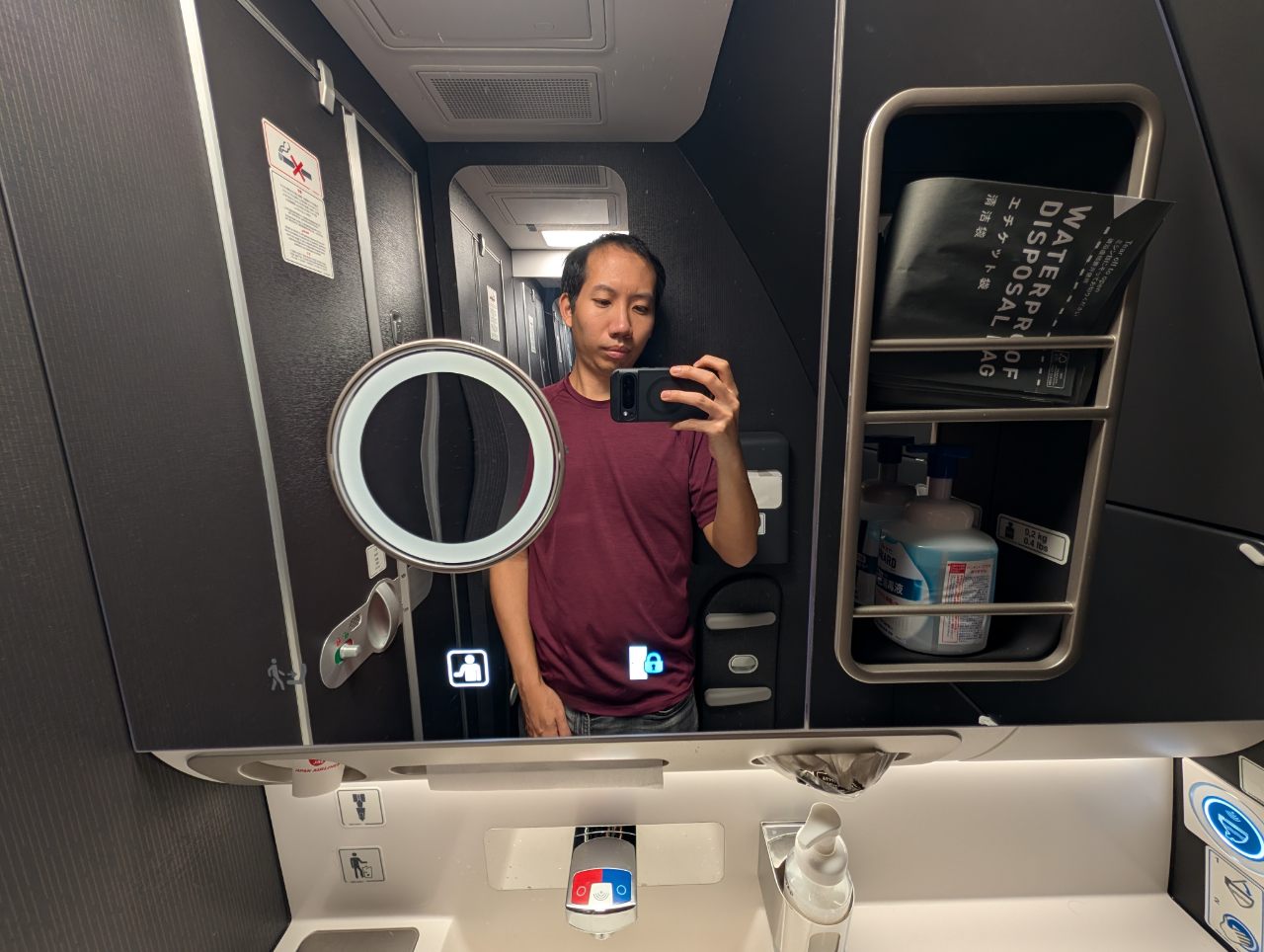
Lavatories were stocked with toothbrush kits, individual mouthwash sachets, and Miller Harris hand lotion.
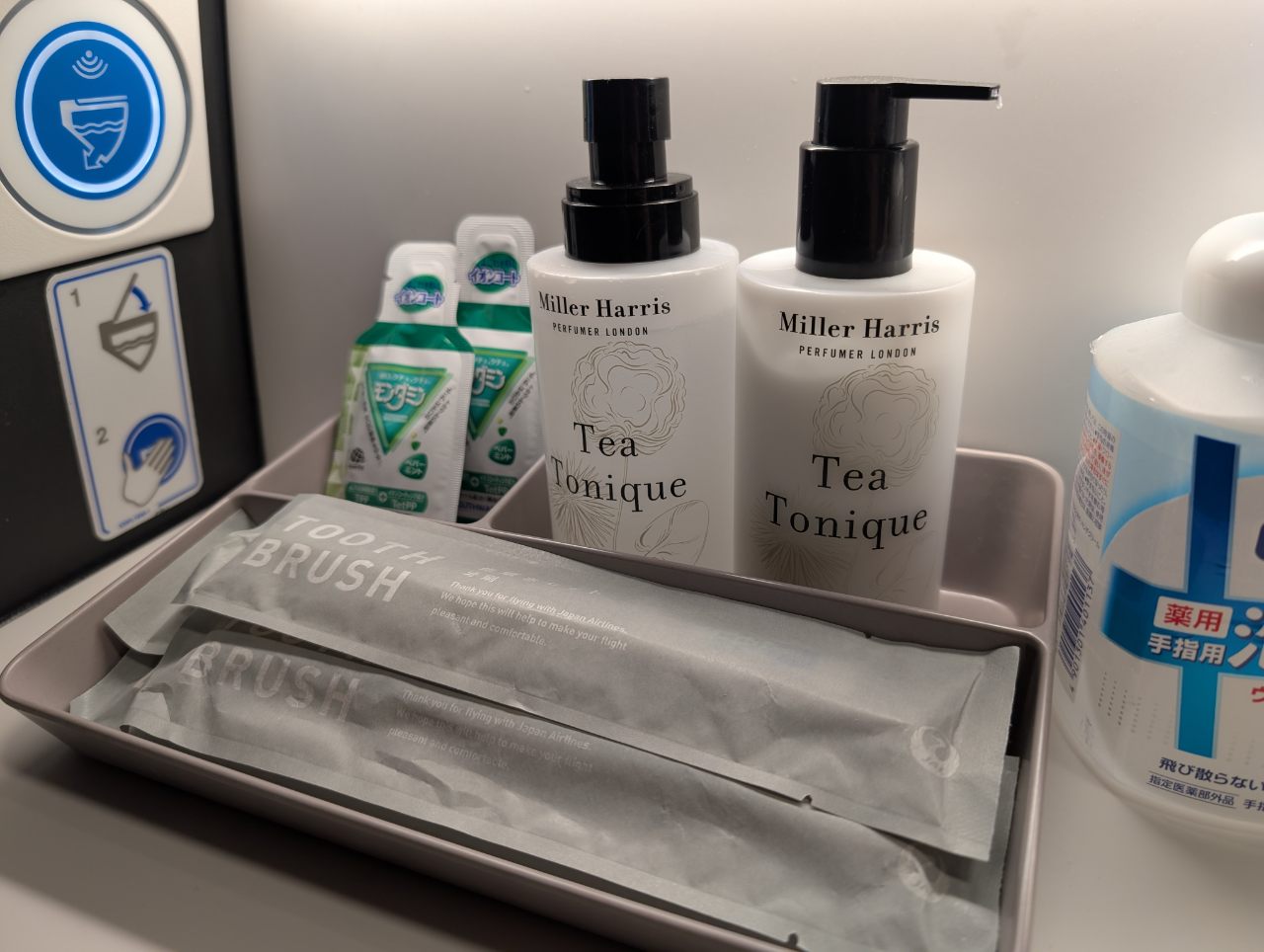
Of course, the lavatories also had a built-in bidet feature, removing the need to wipe.
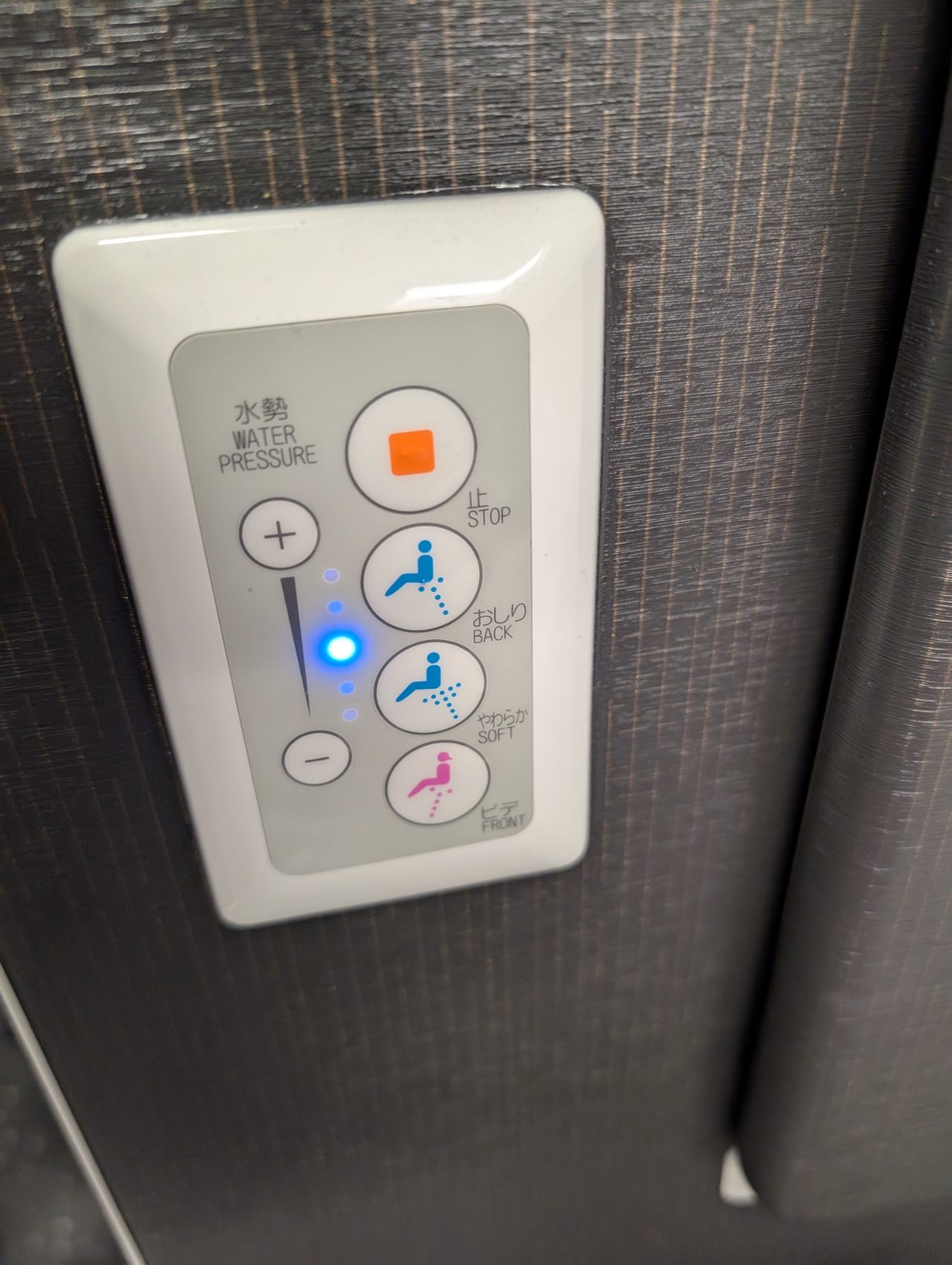
Conclusion
Japan Airlines’ new Business Class seat is a significant upgrade from the previous generation, offering greater privacy, improved comfort, and more advanced technology. I usually try to avoid JAL’s older Business Class seats—especially the SkySuite III—but I’d gladly fly this new product any day.
That said, it’s not without flaws. I found the tray table design frustrating, and the overly bright seat control lights should have been caught during testing. JAL also has a tendency to overcomplicate things, from the cluttered inflight entertainment interface to the unnecessarily complex process for accessing complimentary Wi-Fi.
Overall, it’s a solid and competitive product—but not quite the best Business Class out there.







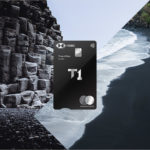
So… NH has JL beat in terms of their next-gen business class?
it’s been 5 years since i tried The Room. Maybe i need to fly it again to jog my memory!
I was looking at The Room, too, but it only leaves from SF, not LAX. Bummer.
I did this HND-DFW and back a few mths ago and thought it was exceptionally comfortable and private. No issues with footwells and angles. Naturally, the mattress pad helped. I did The Room too a few weeks before that (LHR-HND) and thought it was more spacious but a bit less practical in terms of storage/ergonomics – perhaps it didn’t help that I was jetlagged and dinner took a while to complete.
OMAAT’s review of this product was overwhelmingly positive, and it was only after rereading that review that I was able to catch some mentions of there being a lot of scratches with the tray table. So it’s good to see this review that provides a contrarian perspective: excellent, but not as brilliant as how OMAAT found it.
Aaron has been diplomatic with his review. I flew on the same itinerary just last week, and had very negative experience. (1) 5 min after I boarded from Haneda to SIN on business class, an attendant took my choice of breakfast, but 3 min later, a different attendant came to say the Japanese meal was unavailable. I was shocked: only 16 passengers here, and not enough provision for Japanese food on Japan Airlines? The plane had not even taken off yet. I was asked to send feedback as this was often a problem. If the crew had problems with catering,… Read more »
Any hope of A350-1000 returning to HND-SIN route? I am looking for March 2026 and it appears scheduled for the old 777-300.
think it’s quite unlikely. these aircraft are scarce as they are, and they’re anyways earmarked for long haul routes
[…] good is the Euphony system in practice? Based on a comprehensive review of the flight experience by The MileLion, the answer seems to be surprisingly in favor of the technology. The sound coming from the speakers […]
Thanks so much for this great review! I have my eye on this Business Class from LAX to Haneda for later this year. We just flew JAL’s older model of BC from Haneda to LAX and it was fine, but I totally agree about the insane wifi directions. I never could connect, even with the flight attendant helping.